
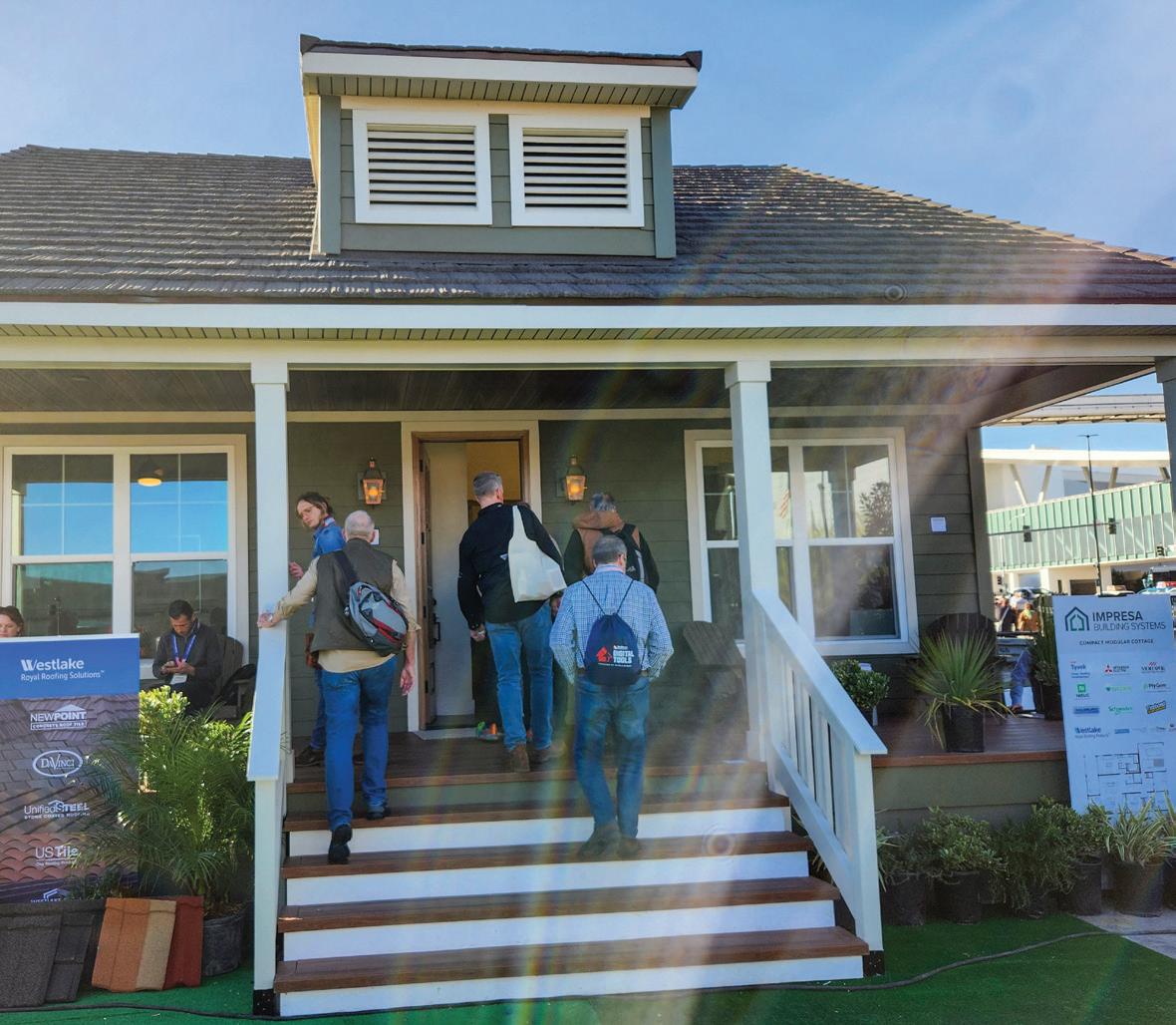
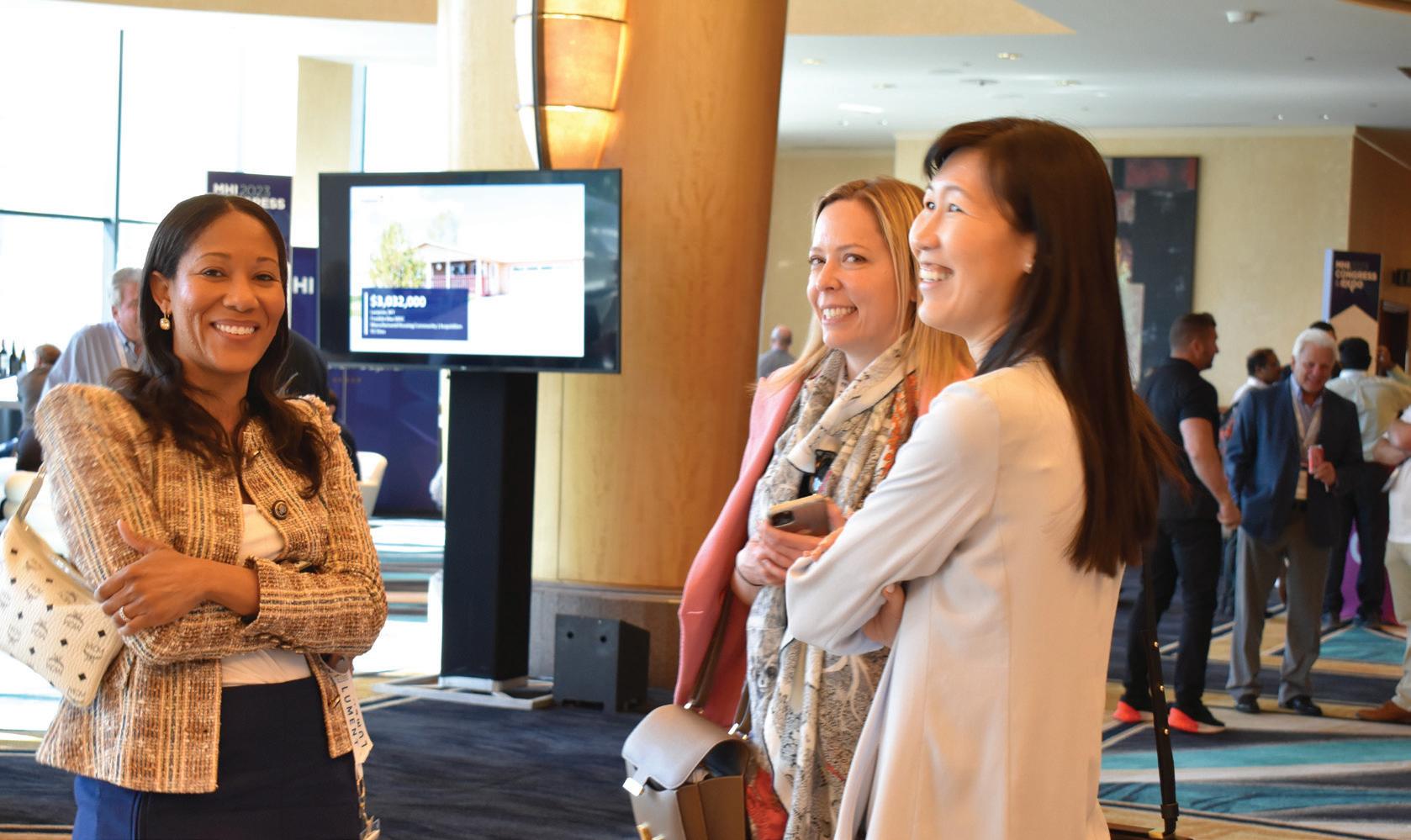

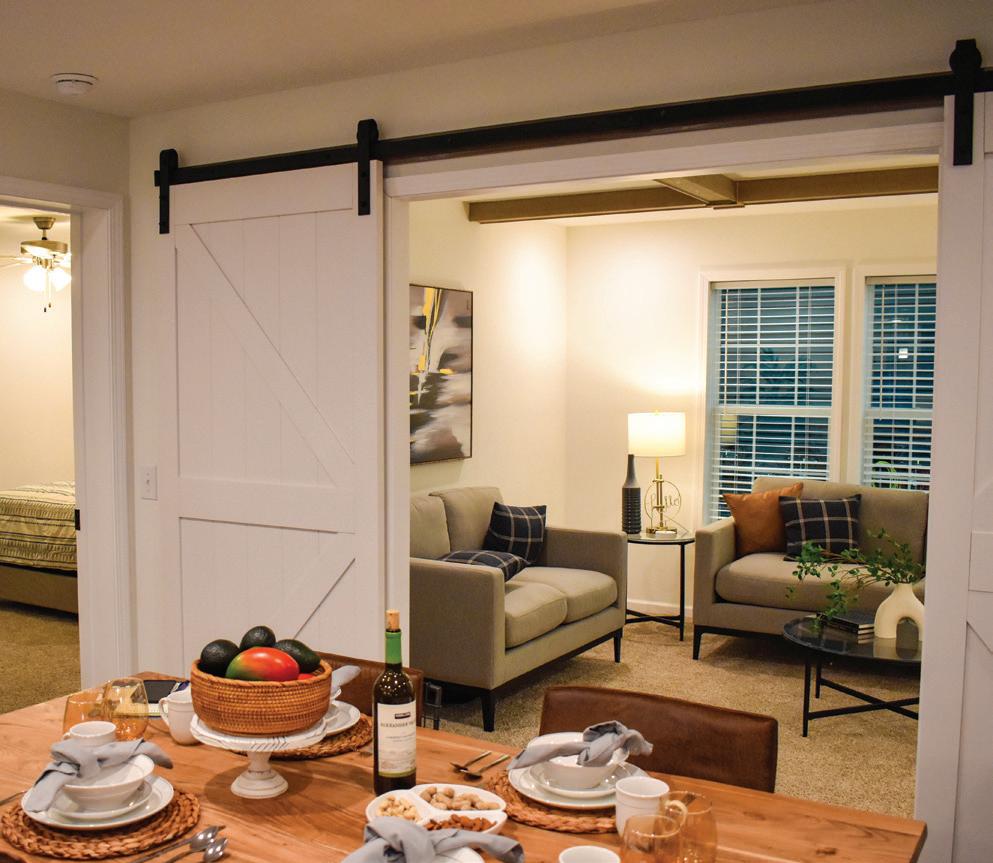
MAY / JUNE 2023 | MHINSIDER.COM Changing the Rules for Affordable Homes in Opportunity Zones Industry Trends and Statistics Updates on New Department of Energy Standards THE MAGAZINE FOR MANUFACTURED HOUSING PROFESSIONALS STATE OF THE INDUSTRY


Manufactured Home Loans In A Zip © 2023. Zippy, Inc. All rights reserved. Zippy is an Equal Housing Lender. As prohibited by federal law, we do not engage in business practices that discriminate on the basis of race, color, religion, national origin, sex, marital status, age (provided you have the capacity to enter into a binding contract), because all or part of your income may be derived from any public assistance program, or because you have, in good faith, exercised any right under the Consumer Credit Protection Act. The federal agency that administers our compliance with these federal laws is the Federal Trade Commission, Equal Credit Opportunity, Washington, DC, 20580. Home lending products offered by Zippy Loans, LLC. Zippy Loans, LLC is a direct lender. NMLS #2189776. 2807 Allen St., Suite 335, Dallas, TX, 75204. Not available in all states (www.nmlsconsumeraccess.org). Full-Service Provider We finance new & used homes, LTOs, RTOs, RPOs, and down payment assistance programs. Close in As Little As 5 Days 100% digital process means loans close in a zip. No Personal Recourse We replaced the personal guarantee with a short-term community guarantee to better address community owners’ needs. The Zippy Difference Contact us today to learn how to partner with Zippy! Chris Donsbach HEAD OF COMMUNITY PARTNERSHIPS chris@zippymh.com (865)257-8249 Innovative Funding Solutions Community Funding Zippy Funding Community-set lending criteria 100% digital experience No personal guarantee Zippy-serviced No fees out of pocket Market-set lending criteria &
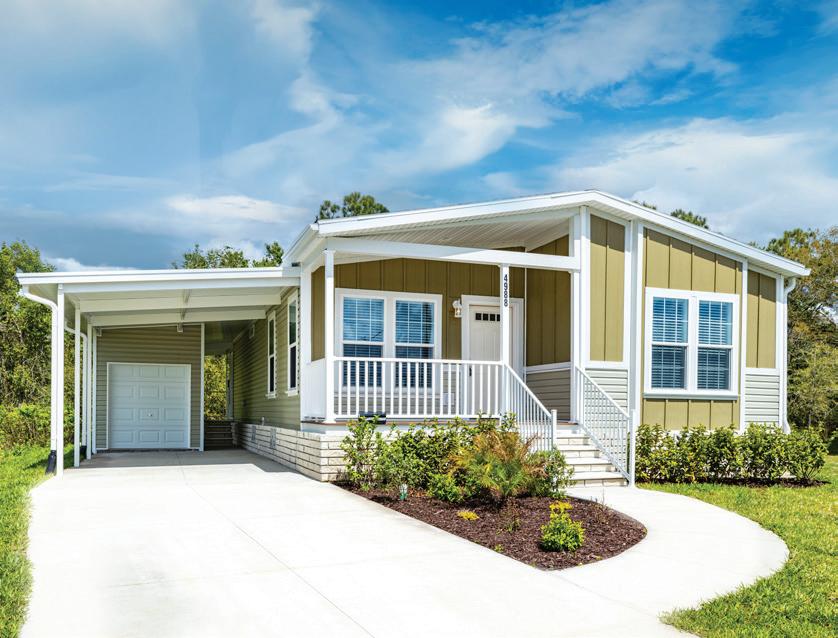
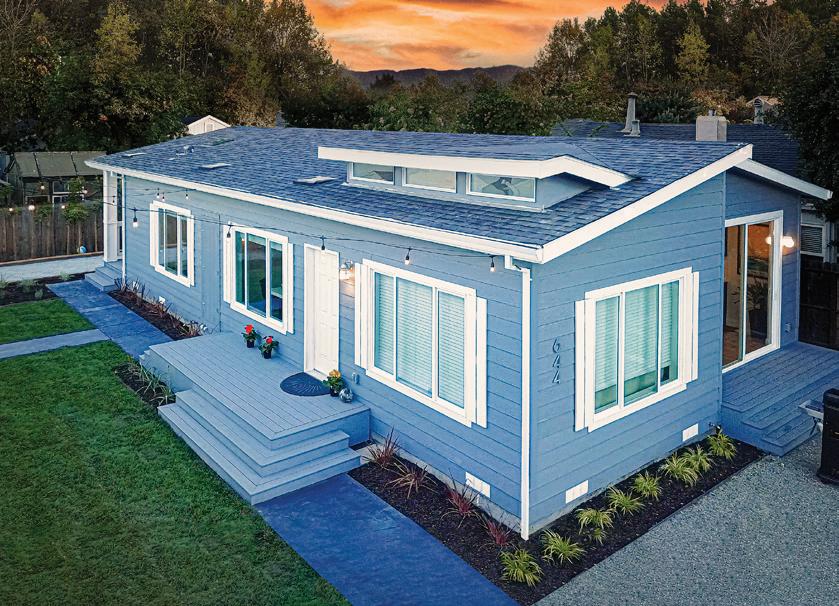
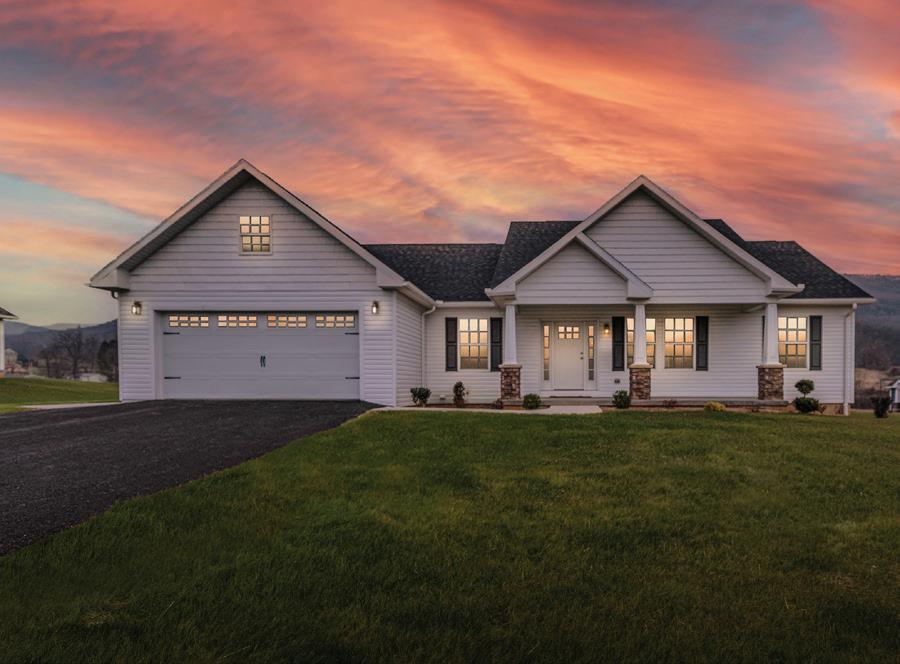
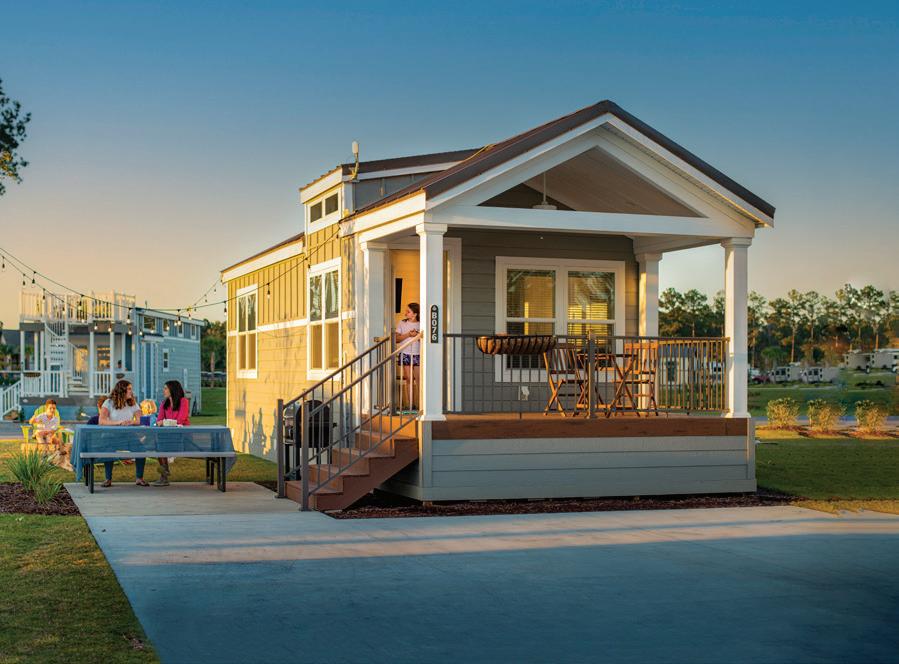
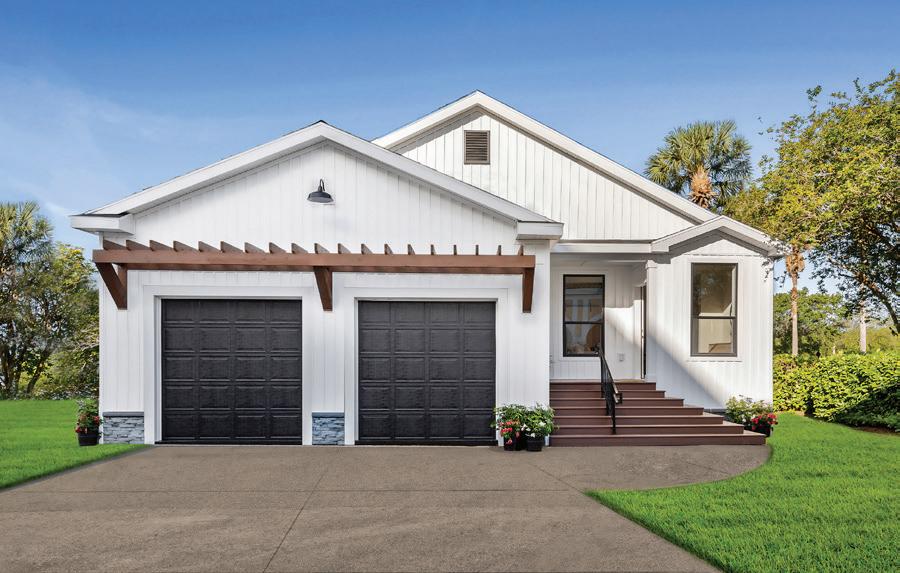
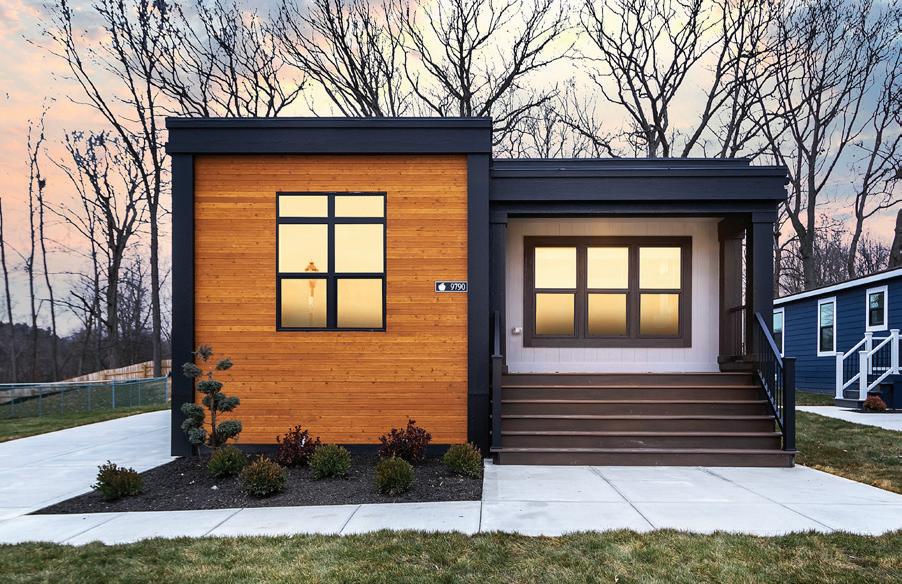
MANUFACTURED & MODULAR HOMES ■ championhomes.com ■ skylinehomes.com ■ genesishomes.com PARK MODEL RVS ■ athenspark.com ■ shoreparkrvs.com ACCESSORY DWELLING UNITS (ADUS) ■ genesishomes.com EXPLORE OUR BRANDS AND DESIGNS AT THESE WEBSITES BUILD WITH A PROVEN LEADER Strong national manufacturing footprint Vast array of home designs for builders, communities, and retailers Complete line of homes for MH Advantage® and CHOICEHome® programs Leading builder of Park Model RVs Innovative builder of Accessory Dwelling Units (ADUs)
In March, UMH Properties CEO Sam Landy introduced a letter to the Senate Finance Committee in support of potential changes to opportunity zones that would allow for an influx of much needed affordable housing.
MHVillage and Datacomp combined efforts with industry partners MHI and Statistical Surveys to provide manufactured housing professionals updated annual trends and statistics from across the marketplace.

VOLUME 6, EDITION 3 | MAY JUNE 2023 | MHInsider.com
PUBLISHER Patrick Revere | patrick@mhvillage.com
SENIOR GRAPHIC DESIGNER Merit Kathan | merit@mhvillage.com
CONTRIBUTING EDITOR George Allen | gfa7156@aol.com
EDITORS Sean Vichinsky | sean@mhvillage.com, Dawn Highhouse | dawn@mhvillage.com
CONTRIBUTORS Steven Blank, Mitch Gonzalez, Kurt Kelley, Subhash Marineni, Vanessa Perry, Donald Westphal
ADVERTISING SALES (877) 406-0232 advertise@mhvillage.com
EDITORIAL & GENERAL INQUIRIES Patrick Revere | 2600 Five Mile Road NE Grand Rapids, MI, 49525 (616) 888-6994 patrick@mhvillage.com
contents
34 52
HAPPENINGS
6 Industry Happenings
EVENTS
10 Events & Tradeshows
13 Seen and Heard — Vegas
ECONOMY
16 Regulatory Environment, Stages of Development, and New Technology
18 Bank Failures Raise Questions for Community Investors
ENERGY & EFFICIENCY
22 Industry Continues to Rally Against Department of Energy Standards
25 New Communities: How to Best Capture and Use Solar Power
WORKFORCE DEVELOPMENT
28 WAMH’s Mission to Advance Women in the Industry
30 State, Local Impact on Industry Workforce
LAND USE
33 Tax Savings Strategies for Community Owners ‘Where Does the Money Go?’
44 Through the Eyes of a Landscape Architect
48 When to Close a Community
INDUSTRY TRENDS
58 State-By-State Home Sales Heat Map
60 MHInsider Marketplace Overview
64 Capstone MH Regional Expense Comparison
TECHNOLOGY
67 Zippy Streaks Full Circle from Finance, Through Community Ownership, Into Tech
71 Sky View Advisors Employ Tech-First Approach
INSURANCE
72 What Made Insurance So Much More Expensive?
ALLEN LEGACY
78 Dates, Groups & Books that Narrate Manufactured Housing Industry
Although we make every effort to ensure that the information in this issue was correct before publication, MHVillage, Inc. and the publisher do not assume and hereby disclaim any liability to any party for any loss, damage, or disruption caused by errors or omissions, whether such errors or omissions result from negligence, accident, or any other cause. Opinions expressed are those of the author or persons quoted and not necessarily those of MHInsider or the publisher MHVillage, Inc.
Copyright ©2023 MHVillage, Inc. All rights reserved. Reproduction of MHInsider content, MHI or other contributor content, in part or in whole, is prohibited without written authorization from MHVillage, Inc.
www.MHVillage.com
MHINSIDER.COM | 3
MHInsider™ is published by: 2600 Five Mile Road NE Grand Rapids, MI 49525 (800) 397-2158
Patrick Revere is vice president of communications at MHVillage and publisher for the MHInsider magazine and blog for industry professionals. His background is in print news, language, and communication.
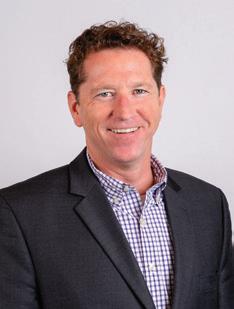
from the PUBLISHER
‘What’s the Big Idea?’
I’ve been asking industry colleagues recently at shows and meetings to share with me the no-holdsbarred concept they feel could reshape the manufactured housing industry.
My caveats, to be clear, are that budget is not a concern, there are no approvals required, the regulatory environment will be dealt with, and hiring is the least of your worries.
What’s the big idea?
The answers, of course, ran far and wide.
As I cross paths with people in the weeks and months to come, I will continue to add to this vault of brave notions. At some future point, MHInsider will share a good lot of them.
The concept came up during the planning and production of this edition of the magazine. The State of the Industry edition looks to capture the grand themes in the industry.
Rather than curating in business categories, we tackle the industry challenges and opportunities at a higher level. It’s a way to raise our considerations from the daily tactical to the long-term strategic.
We, at MHInsider, want to hear from our audience and introduce you and your ideas to the marketplace.
“What’s the Big Idea” has become my very simple big idea to help carry this bold view of how the industry might evolve through the year rather than having it designated to any twomonth period. Yes, the tactical dayto-day aspects of our lives must be addressed, but not at the expense of that ringing inclination that you may have just landed on the next big idea.
So happy inventing, manufactured housing professionals, and look me up or flag me down if you want to share your big idea!
4 | MAY / JUNE 2023 EDITION







growth quality integrity focus team enjoy leader charity Privately Owned & Operated Since 1988 States where currently own MHCs Joshua Mermell Senior VP of Acquisitions Email Jmermell@rhp.com Cell 248.508.7637 Office/Direct 248.538.3312 rhp com • All Cash • Highest Price Paid for MHCs • 35 Years of Experience Buying • Communities of Every Size & Complexity • 100% Confidential • Comfortable with Private Utilities & • Community Owned Homes • Smooth & Efficient Closing Process Brokers Protected
industry HAPPENINGS
Transactions
Fannie Mae Multifamily Closes 2022 With $69 Billion in Volume
Fannie Mae provided more than $69 billion in debt financing to support the multifamily market in 2022 through the Delegated Underwriting and Servicing (DUS®) platform, along with Low-Income Housing Tax Credit (LIHTC) equity on the mission to provide access to affordable housing throughout the country. "This year marks the 35th anniversary of DUS, a platform that relies on shared risk and strong lender partnerships to serve the needs of the rental housing market," Fannie Mae Executive Vice President and Head of Multifamily Michele Evans said. "Our DUS program is well positioned to support the secondary market and play a key role as a stable source of liquidity. We look forward to working with our DUS lenders in the coming year to continue to serve the market and address its most pressing challenges.”
UMH Buys Land in NY Adjacent Community
UMH Properties, Inc. purchased a 24-acre parcel of land located in Monticello, N.Y., for $137,000. The property is adjacent Kinnebrook Estates and allows for expansion that will add homesites and generate added profits and better operating results. Kinnebrook is a
250-homesite community with near 100% occupancy. Site rent averages $660 per month and home rents average $1,200 per month.
Tennessee Association Launches New Website
The Tennessee Housing Association has unveiled a new website and marketplace for factory-built homes in the state. The consumer platform allows Tennessee homebuyers to browse, select, tour, and shop for manufactured and modular homes for sale. The new website tennesseemanufacturedhomes. com allows shoppers to learn more about homes by viewing floor plans , getting price quotes, finding lenders and communities, and even taking 3D tours of new homes available for sale. "Today's homebuyer wants to explore their options online in order to focus on what they really need and want," THA Executive Director Marla McAfee said. "This new experience allows Tennesseans to find a home that fits their lifestyle and budget."
Four Leaf Acquires Communities in Texas
Four Leaf Properties purchased a manufactured home community development project in Victoria, Texas. Phase I of the project began with development of a community plan for 195 home -
6 | MAY / JUNE 2023 EDITION
HAPPENINGS
sites by the previous owner. Four Leaf rebranded the community from Mornington Community to Bluewood Ranch, a lifestyle community that will offer modern, energy-efficient new homes along with community programming and events. The community will develop additional homesites and sell 3- and 4-bedroom, 2-bath homes with about 1,500 square feet of living space. “Quality connects everything we do at Bluewood Ranch from infrastructure, office/community center, new energy-efficient homes and professional on-site management that elevates the lifestyle experience,” Four Leaf’s Michael Callaghan said.
Firm Capital Property Trust Acquires 50% Interest in Two Manufactured Home Communities
Firm Capital Property Trust has purchased 50% interest in the 56-site Parkhill Estates for $3.1 million and in the 58-site Skyview Estates for $2.6 million. Parkhill is in Peterborough, Ont., on 15.9 acres of land and is 100% occupied. Skyview is in Trenton, Ont., on 5.3 acres and is also fully occupied. The properties are funded through existing cash resources of the trust on seven-year debt financing for approximately 65% of the purchase price.
Manufactured Housing Properties Inc. Acquires Five Communities
Manufactured Housing Properties Inc. has acquired Country Aire and Merritt Place Manufactured Housing Communities and the Wake Forest portfolio and Mobile Cottage. Country Aire consists of 105 homesites and is situated on approximately 20.8 acres in Simpsonville, S.C., near Greenville. Merritt Place has 40 developed homesites, and 14 more under development, as well as 24 homes, which expands
the company’s presence in Brunswick, Ga. The Wake Forest portfolio includes Cooley and Country Road Manufactured Housing Communities with 72 homesites and 54 homes in the North Raleigh area. Mobile Cottage adds 23 homesites and 18 homes to the company’s presence in Morganton, N.C. MHPC now owns and operates 57 manufactured home communities with 2,747 homesites.
The Home Gallery Curates New Offerings
Orbit Homes has launched a curated collection of new factory-built homes called The Home Gallery that includes California bungalows, traditional floor plans, CrossMod Homes, and more contemporary layouts all within a wide range of price points. "Contemporary factory-built homes are changing the homeowner landscape," Orbit CEO Or Michaelo said. "With the opening of The Home Gallery, we can offer people an opportunity to become a homeowner and have the experience of choosing a home that looks and feels like traditional new-build construction. Our goal is to get people the home of their dreams in the locations they want, at a price point they can afford."
‘Rent Stabilization’ Extended in L.A.
Annual rent increases for rental units subject to the City of Los Angeles Rent Stabilization Ordinance are now prohibited through 2023. Exceptions may apply, such as approved rent increases for capital improvements. Call the city Housing Department at (866) 557-7368 with any questions.
Vermont Gov. Announces Funds for Healthy Homes
Vermont Gov. Phil Scott and the Agency of Natural Resources have announced $12.6 million in funding for the state’s Healthy Homes Initiative to help 36 »
MHINSIDER.COM | 7
manufactured home communities with repairs to and replacement of water infrastructure. “This critical funding supports safe, affordable housing and improves the quality of life for those living in manufactured housing communities,” S cott said. “Through this round of funding, an estimated 3,975 residents – including 1,100 seniors and 830 children – will be able to more reliably access safe drinking water, and will be served by improved wastewater, stormwater, and drainage systems, protecting both them and the environment.”
Personnel Wisconsin Housing Alliance Member Services Director Retires
Julie Patten, director of member services for the Wisconsin Housing Alliance, announced her retirement after 33 years of service. During her tenure, membership increased from 423 to nearly 800 professionals, and more than 69,000 homes shipped in Wisconsin. “One of the many reasons why I love this industry is because of the hardworking, down-to-earth, and generous members that I have had the honor to work for,” Patten said.
Fannie Mae Names New Director
Fannie Mae has named Michael Seelig to the board of directors and stated that he will serve on the Audit Committee. Seelig was a senior executive at PricewaterhouseCoopers LLP, where he was a partner from 1997 until his retirement in September 2022. He has more than 35 years of experience serving clients in the financial services industry. In addition to helping companies navigate risk, regulatory, mergers and acquisitions, financial reporting, corporate governance, and strategy matters, Seelig served in a variety of leadership roles where he was responsible for driving the firm's strategy and operations in several national, market, and sector-based capacities. Seelig is a licensed certified public accountant and a member of the American Institute of Certified Professional Accountants.
Honors
Skyline Homes Awarded America’s Most Trusted® Manufactured Home Builder For Third Consecutive Year
Skyline Homes, a Champion Homes brand, has been recognized for the third consecutive year as America’s Most Trusted® Manufactured Home Builder. The annual study conducted by Lifestory Research is based on responses from 40,000 consumers shopping for a manufactured home. “To say it is an honor to receive this prestigious award for another year is an understatement,” Mark Yost, president and CEO of Skyline Champion Corporation, said. “We take our commitment to providing quality homes to hardworking Americans very seriously, and acknowledgments such as this one reflects the collective work of our team to earn and serve customers every day.”
Industry Giving
415 Families Receive Home Updates
Impact Communities provided home updates to 415 residents through their affiliate, Impact Cares, which teams with local volunteers and residents to serve together on improving the lives of residents and bettering homes and communities. Improvements included new skirting, power washing, painting, tree trimming, building decks and ramps, and replacing steps.
In Memoriam Industry Mourns Longtime Wisconsin Community Owner, Retailer
Mary Ann Sommer, a longtime Wisconsin community owner and retailer, passed away Dec. 19, 2022 at the age of 95. Mrs Sommer, from Sheboygan, owned and operated Sommer’s Homes Inc. and Sommer’s Woodhaven Manufactured Home Community, which was started in 1947. Her husband and partner in business, Lloyd Sommer, preceded her in death. She also was involved in nearly every aspect of 4-H for more than five decades, and was on the 100-mile endurance ride committee for the Plymouth Trail Riders, among her many civic activities. MHV
8 | MAY / JUNE 2023 EDITION
HAPPENINGS

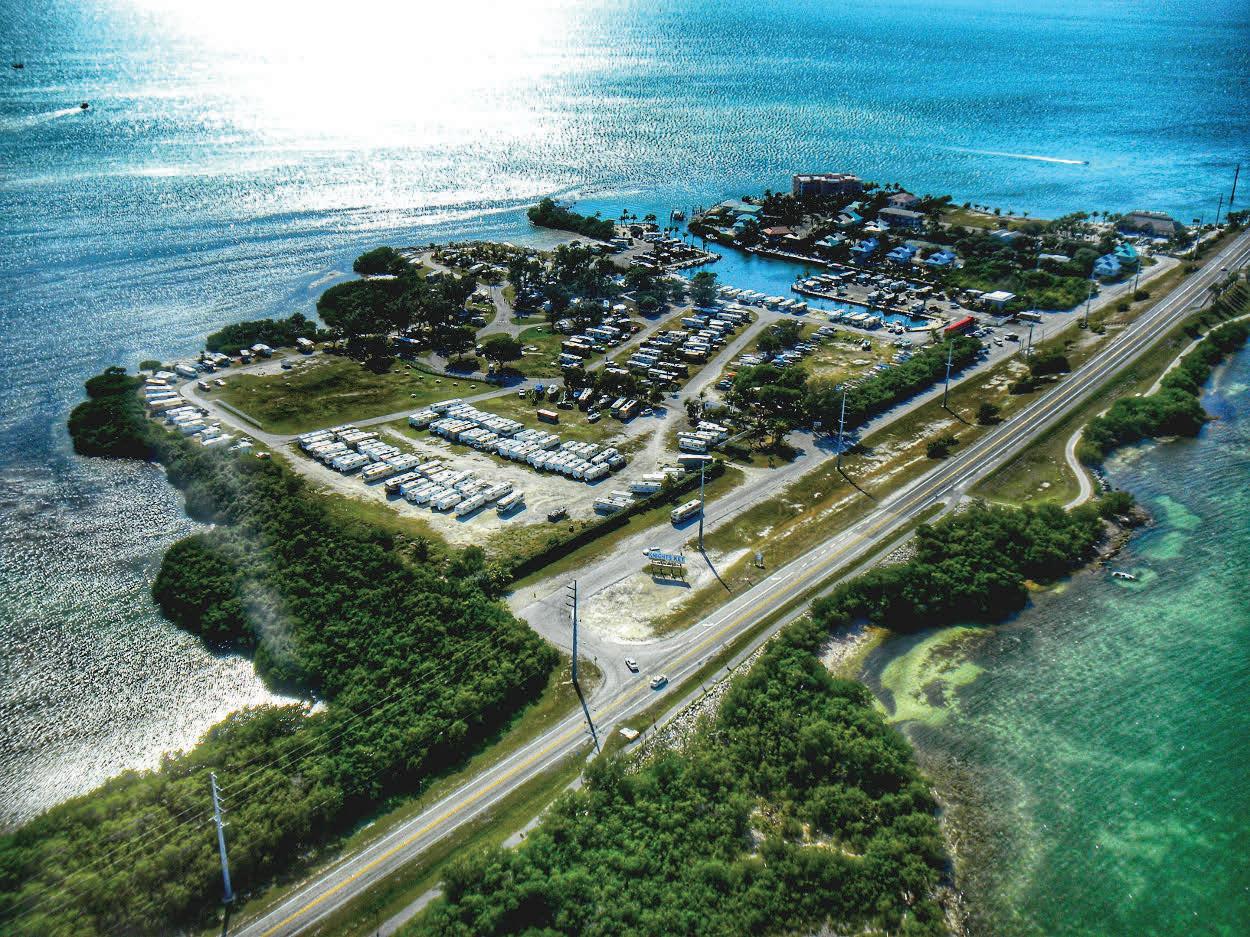

Events
& Tradeshows
MHI on the Hill
Tuesday, June 6 — Wednesday, June 7, 2023
Washington, D.C. | National Mall
The Salamander Resort and Spa
Held annually in conjunction with National Homeownership Month and HUD’s Innovative Housing Showcase, MHI invites members to the Capitol to convey industry priorities to Congress, staff, and policymakers, and to network with colleagues within the industry and in other segments of housing, as well as with guests, and the general public.
2023 MHCA Annual Conference and Golf Tournament
Wednesday, June 7 — Friday, June 9, 2023
WeKoPa Casino & Resort | Fort McDowell, Ariz.
MHCA offers a prime locale to meet, exhibit, and shop for the latest industry developments and trends. With awe-inspiring views and a day of great golfing, Manufactured Housing Communities of Arizona invites manufactured housing professionals for a productive three-day outing in the desert. Exhibit and sponsorship opportunities are available!
Innovative Housing Showcase
Friday, June 9 — Sunday, June 11, 2023
Washington, D.C. | National Mall
The U.S. Department of Housing and Urban Development, four years following its inaugural event, has announced the return of the Innovative Housing Showcase to provide a large, public display of innovative designs, structures, and advances in housing, particularly with a mind toward energy-efficiency, durability, and availability. The gathering coincides with National Homeownership Month as well as industry- and state-specific lobby efforts, including Manufactured Housing Institute’s annual industry fly-in event at the Capitol.
Florida Manufactured Housing Association Annual Convention
Thursday, June 15 — Friday, June 16, 2023
Orlando, Fla. | Orlando Hyatt
There is a return to Orlando with the FMHA Annual Convention, where members and guests will find help from other manufactured housing professionals in making connections or learning best practices. There will be an economic update, a review of recent and pending legislation, a disaster recovery update, and other trending topics in Florida and around the country. Attendance, exhibitor, and sponsorship opportunities are currently available.
EVENTS
10 | MAY / JUNE 2023 EDITION
Manufactured Housing Institute of South Carolina Summer Convention
Thursday, June 20 — Saturday, June 22, 2023
Myrtle Beach, S.C. | Hilton Oceanfront Resort
MHISC is meeting at the Hilton Oceanfront Resort for its annual summer gathering. It will host a golf tournament, committee meetings, and a state hall of fame awards ceremony and dinner. Join other manufactured housing professionals at the beach for networking, learning, and industry development. Exhibitor and sponsor opportunities remain, please contact the association for details.
2023 Multi-State Convention
Saturday, July 29 — Monday, July 31, 2023
Orange Beach, Ala. | Perdido Beach Resort
Join the Alabama, Louisiana, and Mississippi manufactured housing associations to explore valuable networking opportunities, attend banquets, educational seminars, and state-specific continuing education. Attendees can explore an upscale marina near the resort that offers deep-sea fishing, dolphin excursions, boutique shopping, a day spa, and local eateries. Of course, a round of golf is nearby at a number of signature courses. Registration, exhibit, and sponsorship opportunities are available.
RV/MH Hall of Fame Induction Dinner & Ceremony
Monday, Aug. 21, 2023
Elkhart, Ind. | RV/MH Hall of Fame and Conference Center
The RV/MH Hall of Fame each year invites industry professionals, family, and friends to celebrate the recent lineup of hall of fame inductees. The event starts with a cocktail mixer, followed by dinner and the induction ceremonies. The hall in Elkhart details the careers of hundreds of RV and MH professionals, including a library, event center, and museums for each of the industries.
MH FacTOURy Summit
Tuesday, Aug. 22 — Wednesday, Aug. 23, 2023
Elkhart, Ind. | RV/MH Hall of Fame and Conference Center and Northern Indiana Homebuilding Facilities
Attend two full days of factory tours and learning for retailers, community owner/operators and vendors from around the nation. G et the chance to come together to learn about the latest trends in product development, home building, management, finance, and sales.
SECO National Conference of Community Owners
Sunday, Sept. 10 — Wednesday, Sept. 13, 2023
Atlanta | Renaissance Atlanta Waverly Hotel and Convention Center
From industry panels, presentations, and roundtable discussions, to the networking mixers and professional exhibits, the SECO National Conference of Community Owners again seeks to improve on that fresh, compelling interaction and camaraderie. The event provides manufactured housing professionals with four days of high-level interaction, including educational seminars, panels, roundtables, fireside chats, mini TED talks, and open time for networking and deal-making.
If you have an event or gathering you would like to have listed with MHInsider, please contact us at:
www.mhvillage.com/pro/manufacturedhousing-industry-trade-shows/
MHINSIDER.COM | 11
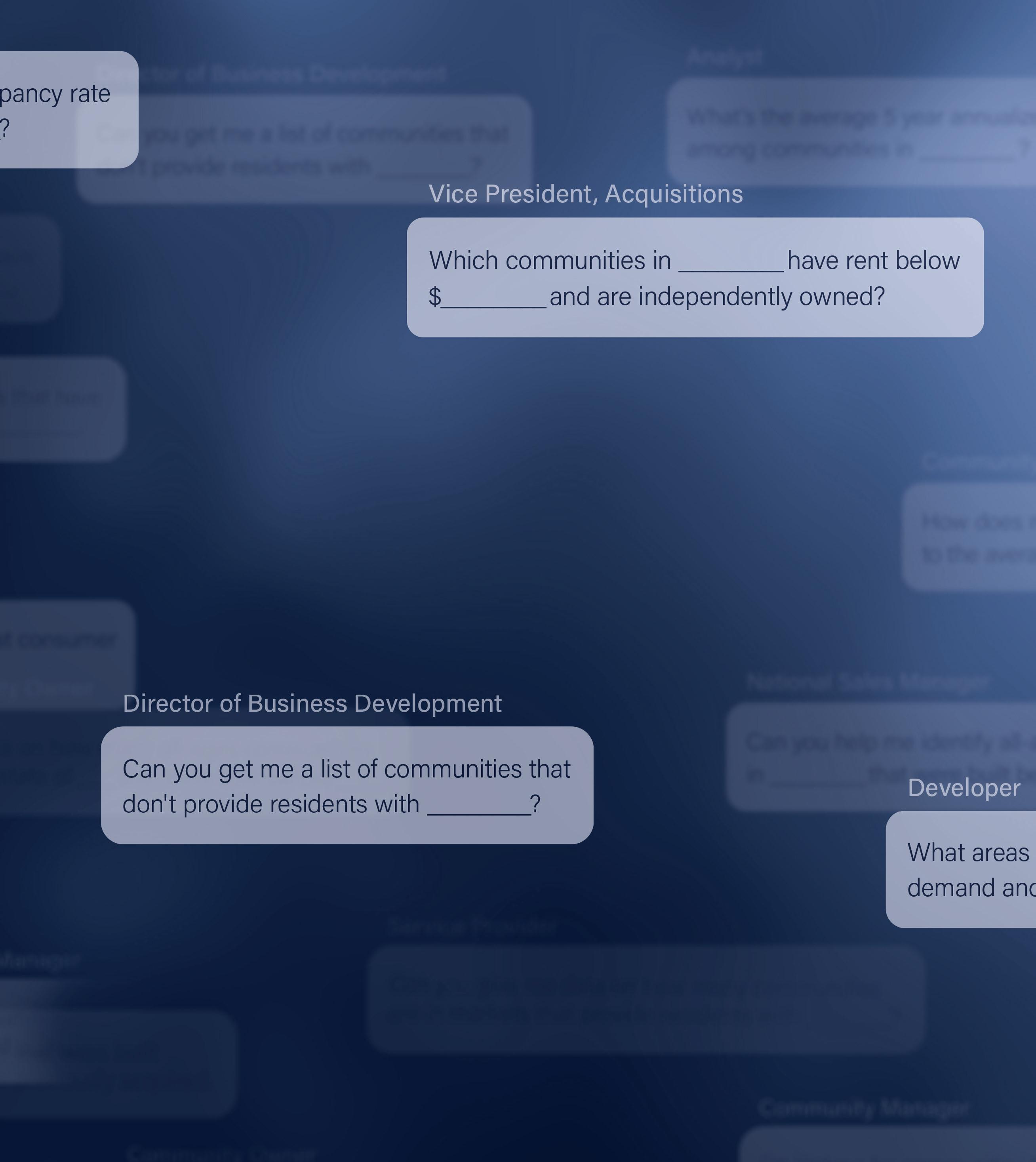
Let’s Fill In The Blanks TOGETHER. Datacomp Get the Answers You Need at: info.DatacompUSA.com/data Insights Powered by Data
There’s no such thing as one-size-fits all when it comes to data. That’s why Datacomp offers the most customizable and detailed insights in the manufactured housing industry. Whether you need rent and occupancy data, community attributes, home sales activity or overall industry trends, our custom data solutions can help fill in the blanks. From evaluating potential acquisitions, to benchmarking existing properties or uncovering new business opportunities, Datacomp can provide the answers you need for informed decision-making.
Seen & Heard
From the Tee Box
Jeff Merrill, business development manager for MHVillage, strikes the ball during the 17th Annual Oliver Technologies Golf Open at the Las Vegas Paiute Golf Resort.

80s Networking Lounge
MHInsider sponsored a networking lounge at the 2023 Congress and Expo, complete with full-size vintage arcade games.
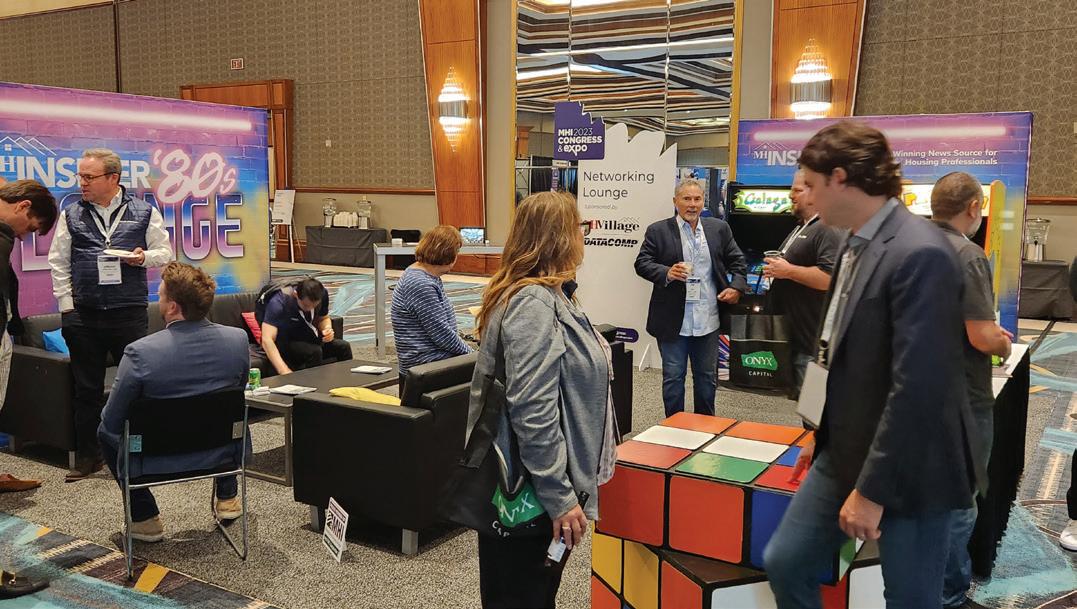
A Community Overview


Lesli Gooch, the CEO of MHI, moderates a panel of industry leaders in community ownership and management, from left Steve Schaub of Yes Communities, Sam Landy from UMH Properties, and Bill Raffoul of Sun Communities.
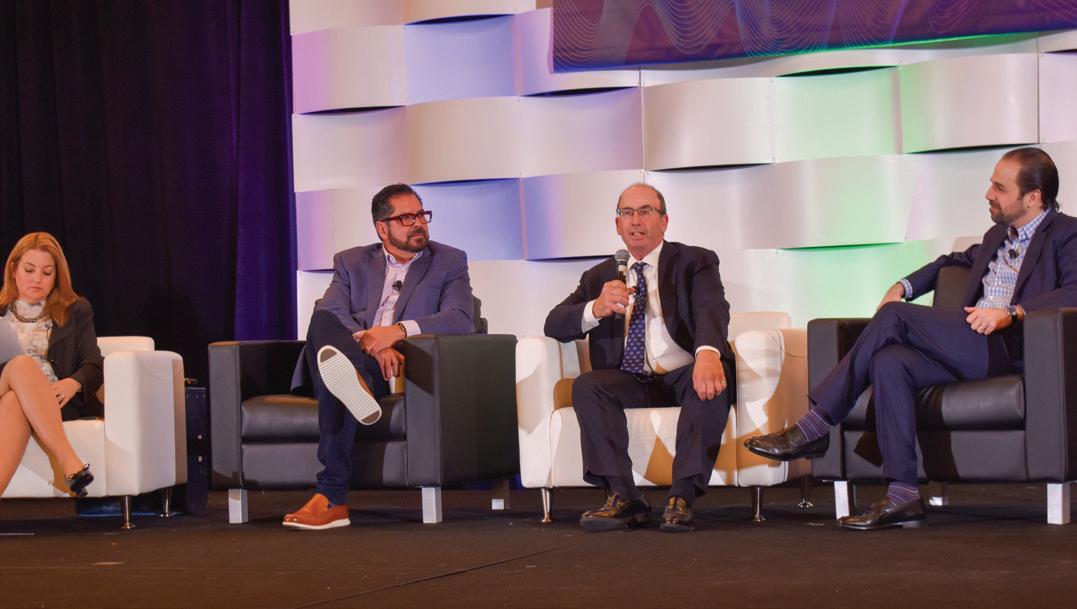
EVENTS
UMH PROPERTIES, INC. A PIONEER IN MANUFACTURED HOUSING
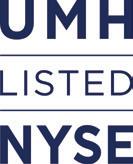



As a publicly traded REIT (NYSE:UMH), we have been providing quality a ordable housing since 1968. Our portfolio provides high pro t margins, recession resistant qualities, reliable income streams and the potential for long-term value appreciation.
• $1.9 billion in total enterprise value
• 135 communities, 25,700 homesites, 2 joint venture communities containing 363 homesites, 11 states
• Housing approximately 21,000 families
• 7,600 total acres, 3,800 acres in Marcellus and Utica Shale regions

 UMH Awarded 2021 Manufactured Home Community Operator of the Year and 2021 Retail Sales Center of the Year by the Manufactured Housing Institute For more information, visit www.umh.reit or contact ir@umh.com
UMH Awarded 2021 Manufactured Home Community Operator of the Year and 2021 Retail Sales Center of the Year by the Manufactured Housing Institute For more information, visit www.umh.reit or contact ir@umh.com
Advocating at the Expo
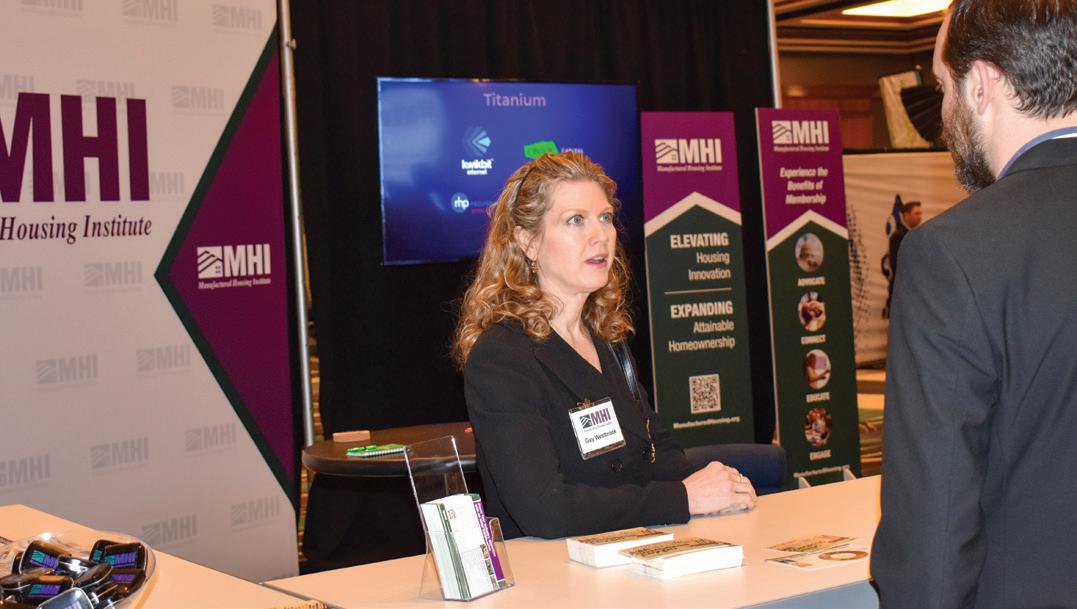
Gay Westbrook from MHI catches up with a member on the expo hall floor during the Congress and Expo at MGM Grand.
Catching up, Talking Shop
Rob Shouhyib and Kamal Shouhyib, of Choice Properties, talk with John Rogosich, center, of I. R. Management Group.
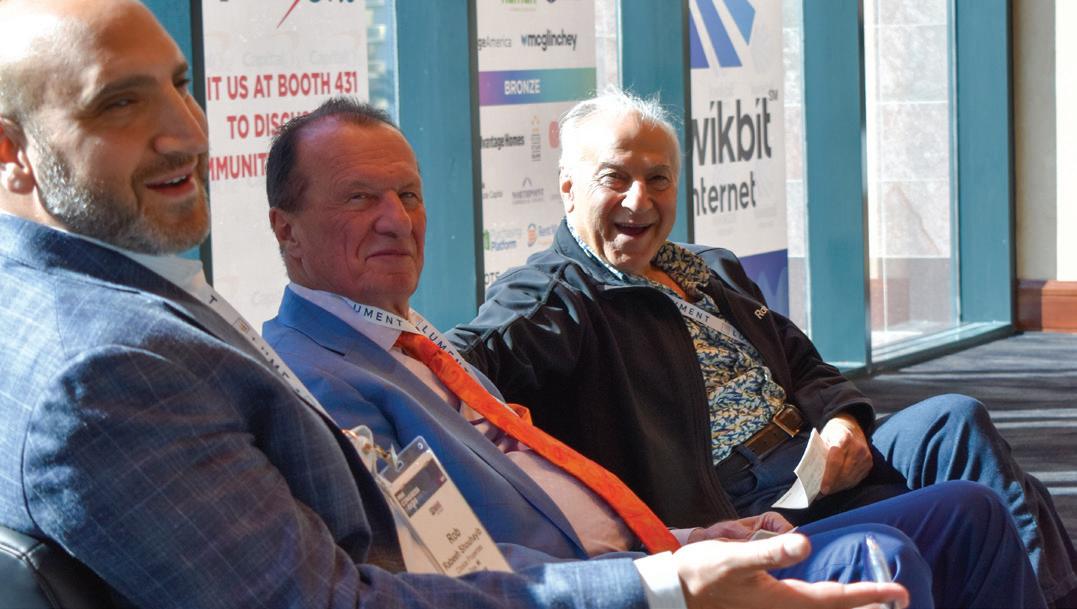
Blast from the Past
Manufactured housing professionals at Congress and Expo in Vegas found some time for an alternate type of gaming.

Learn the Latest

The educational offerings at the Congress and Expo in Vegas were well attended, and appreciated by new and seasoned professionals alike.
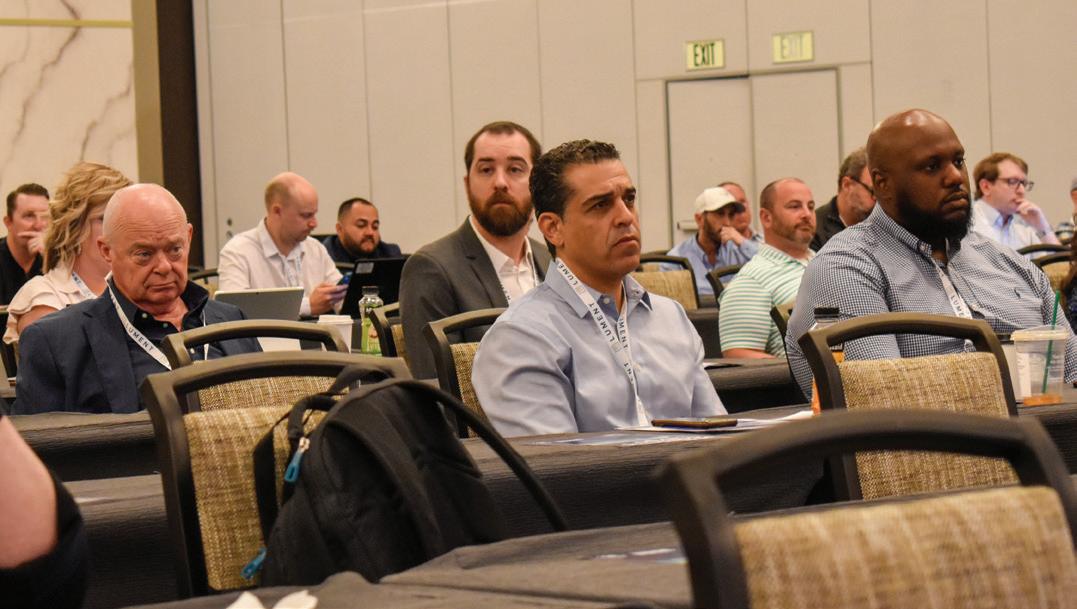
EVENTS MHINSIDER.COM | 15
Regulatory Environment, Stages of Development, and New Technology
by Mitch Gonzalez
The history of manufactured housing in its earliest form dates to 1764, when a two-story panelized frame dwelling was shipped from London to Cape Ann, Mass. By the early 1900s, the English were building custom vans, and an American devised a fifth-wheel hitch to attach a travel wagon to his roadster.
During World War II, the U.S. government purchased mobile homes for workers near plants. By the late 1940s, trailer lengths had increased to more than 30 feet and small bathrooms were added. In the 1960s, two-section mobile homes became popular, and a mobile home construction code was developed by the Mobile Home Craftsmen Guild.
In the 1970s, one mobile home was built for every three site-built homes compared to the last three years, where we have seen one manufactured home built for every 10 site-built homes. This is one of the many reasons our country has a severe lack of affordable housing.
Manufactured housing is a type of prefabricated housing that is largely assembled in factories and then transported to sites of use. It is regulated by the U.S. Department of Housing and Urban Development (HUD) since 1976. Manufactured homes are different from modular homes, which are also factory-built but comply with the building code for where they will be placed and are often treated as equivalent to site-built homes for zoning purposes.
Details on Zoning
Zoning is a tool that cities use to govern the use, size, and relation of buildings to their surroundings. Zoning for manufactured housing varies from jurisdiction
to jurisdiction and may restrict or eliminate their placement in certain areas.
Some of the common zoning devices that affect manufactured housing are…
· Outright bans
· Lot size requirements
· Density limits
· Restrictions on manufactured home communities
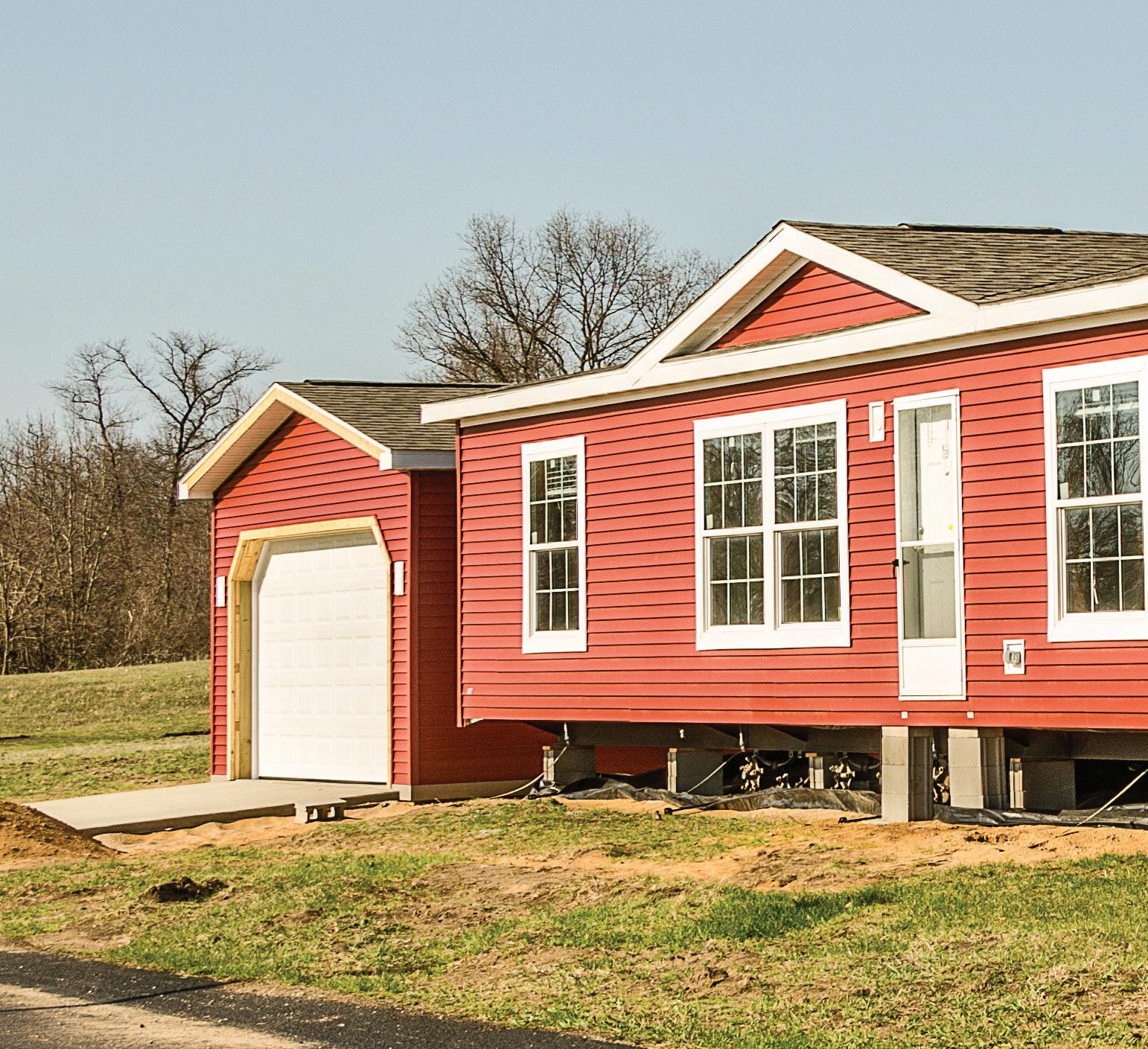
· Aesthetic standards
· Compatibility criteria
These zoning regulations may reduce the supply of affordable housing and may be discriminatory under the Fair Housing Act. State-level zoning restrictions against manufactured homes and communities are being targeted by legislators in Arizona, Maine, Mary-
16 | MAY / JUNE 2023 EDITION ECONOMY
land, Massachusetts, and North Carolina. As these states turn the corner in accepting our industry again, we will see more viable development opportunities.
Land Entitlement for Manufactured Housing
The process of entitlement for land development involves obtaining approvals from local authorities for the use and development of land. It may include rezoning, subdivision, site plan review, environmental review, variance, special use permit and other approvals depending on the project and location.
The entitlement process can be complex, time-consuming, and costly for developers of manufactured housing communities. It may also involve public hearings, community meetings, and negotiations with stakeholders.

Professional Services Involved in Land Development
A successful entitlement of a manufactured housing community requires a good land-use attorney, engineer, and site plan designer. These professionals can help navigate the complex zoning and permitting regulations, ensure compliance with environmental and safety standards, and optimize the layout and design of the community.
A good land-use attorney can advise on the legal aspects of the project, such as negotiating with local authorities, securing approvals and variances, and resolving any disputes or challenges. A good engineer can provide technical expertise on the infrastructure and utilities of the community, such as water, sewer, drainage, roads, and lighting. A good site plan designer can create a functional and attractive plan for the community, such as maximizing space utilization, enhancing aesthetics and accessibility, and incorporating amenities and features.
During the last year, we at Yale have tracked over 25,000 sites being developed across Texas, Arizona, and the Southeast. We are excited for what the future holds for new manufactured housing communities and hope the progress being made by some of these states continues to spread to other areas of the country. MHV
Mitch Gonzalez is the director of land sales and development for Yale finding the highest and best use of a property leveraging a diverse background in real estate investment. He previously ran a construction company providing general contracting services for brands such as Emcure Urgent Care, Jonna Properties, and Safeway Oil Company, overseeing $70M in closings.
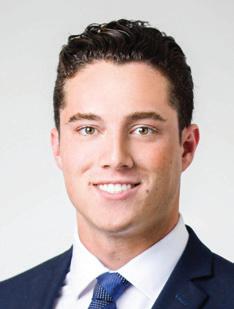
Bank Failures Raise Questions for Community Investors
 by Subhash Marineni
by Subhash Marineni
18 | MAY / JUNE 2023 EDITION
ECONOMY
In the wake of recent banking crises, park owners may be concerned about the impact on the manufactured housing sector, particularly the ability to finance acquisitions and greenfield developments. The crisis is expected to limit the availability of bank financing, cause an increase in the cost of borrowing, and perhaps a higher likelihood of a recession.
While attempting to predict the future, it is crucial to understand the drivers of the recent capital activity in the sector and assess their variability in a crisis.
The failure of three banks and questions on others during the past two months triggered a brief but deep panic in the capital markets, along with losses in stock markets. »

MHINSIDER.COM | 19
Silicon Valley Bank, the 16th largest bank in the U.S., precipitated the concern and caused investors to survey small to midsize banks that primarily served the technology sector. Once the second institution, Signature Bank, went down, the inevitable spillover effects began. The Federal Reserve’s inflation curbing efforts, including raising the interest rates, has resulted in unrealized losses on the bank’s loan portfolios – particularly those holding low yielding, longer duration bonds and loans. Given that the banks are not required to disclose “mark to market” losses on their bond and loan portfolios, we cannot fully understand the extent of the losses.
With the assurances from the regulators that tax payers will not pay for banks’ losses, it is critical that the banks are amply capitalized to cover all depositor claims. Bank regulators will continue to scrutinize the liquidity at the banks. Bank financing, tightening already, will experience further tightening.
Institutional capital activity in the manufactured housing sector has increased in recent years as institutional investors look for new investment opportunities to diversify their portfolios and generate attractive returns. This is driven by several factors, including:
· Growing demand: The need for affordable housing, particularly among aging baby boomers, has increased demand for manufactured homes, making them an attractive investment option.
· Strong returns: Manufactured home parks can offer attractive returns, particularly in areas with high demand for affordable housing.
· Lack of competition: The manufactured home park industry has not received the same level of investment as other real estate sec -
tors, creating opportunities for institutional equity to enter the market.
· Stable cash flow: Mobile home parks generate a steady stream of income from lot rents, offering the potential for long-term, inflation-protected income.
The role of institutional capital has been in the form of debt financing from banks (direct, and agency guarantees), commercial mortgage-backed securities issuers, and specialty finance companies. Equity financing has been in the form of direct equity investments, joint ventures, and other types of structured investments. Non-bank institutional capital providers to the sector include private equity groups, investment divisions of insurance companies and pension funds, structured capital groups, and REITs. The fragmented nature of the industry has limited the participation of a large number of institutional capital groups due to the lower number of investment opportunities that meet their minimum investment size criteria.
Historically, the manufactured housing sector has performed well during economic recessions. During a recession, demand for affordable housing tends to increase as more people seek lower-cost housing options, and manufactured homes offer an attractive alternative to traditional site-built homes.
Moreover, manufactured home parks tend to have lower turnover rates than traditional multifamily apartments during recessions, which helps maintain stable cash flows for park owners/investors. This is because residents who own their manufactured homes typically have lower mobility due to the cost of
20 | MAY / JUNE 2023 EDITION
ECONOMY
During a recession, demand for affordable housing tends to increase as more people seek lower-cost housing options, and manufactured homes offer an attractive alternative to stickbuilt homes.
moving and setting up their homes in a new location, which reduces the likelihood of vacancy.

Another trend particularly driving housing in general is the under supply of homes due to historic under building of single-family homes since the housing recession of 2008. For these reasons, manufactured housing sector is expected to continue to be one of the top performing asset classes in a recession case — therefore, institutional capital interest in the sector is expected to remain strong.
Cost and availability of debt are critical drivers of investor returns in any assets, particularly in real estate and related asset classes like manufactured homes given the high debt-to-equity ratios used to finance developments or acquisitions. As with any bank tightening, appetite for both quantum of debt and leverage tolerance in a deal decreases. Hence, park owners will be required to capitalize deals with more equity, which will lower the equity returns unless the rent increases net the increased cost of debt. Interest rate increases have a broad impact on the development or acquisition of the parks everywhere, but more so in rent-controlled states.

Financing acquisitions of existing communities has been and, will continue to be,more attractive for institutional capital than greenfield development of new communities. In addition to the existence of stable rent cash flows, sizable acquisitions provide an opportunity to deploy meaningful capital with one sponsor. Recent large equity/JV transactions in the sector have primarily centered around acquisitions. Given the risk associated with lot development, land banking by smaller investment groups remains the dominant way to finance development projects. Minimal large institutional capital appetite exists today in development financing. However, park owners with JV partners are better positioned to cultivate trust and garner capital partner’s support to fund opportunistic development projects.
In summary, due to the recession-resistant nature of the sector and limited opportunities for attractive returns in other asset classes, investor interest in the manufactured housing sector is expected to remain strong. MHV
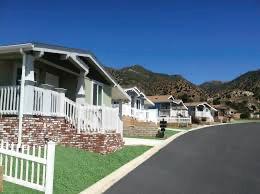

Subhash Marineni is a director at Bridgepoint Investment Banking with expertise advising business owners on capital raising involving equity and debt private placements, and mergers and acquisitions. Bridgepoint has deep capital connectivity and ability to source flexible capital to support acquisitions and growth. Subhash has recently advised on a preferred equity/JV partnership for a 2,300-homesite portfolio acquisition financing in New York. In 2021, he was presented with America’s Rising Star Dealmaker Award from Global M&A Network and was recognized in 2022 by The M&A Advisor with the Emerging Leaders Award.
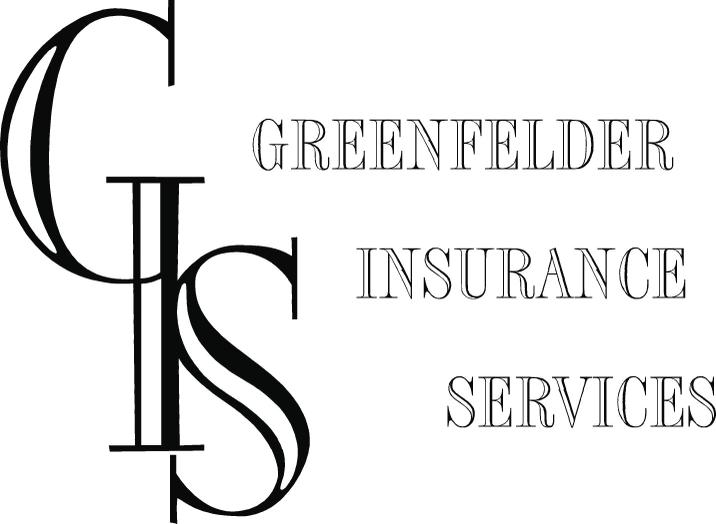

MHINSIDER.COM | 21
Go to http://subscriber.mhinsider.com on your computer or mobile device Manage Your MHInsider Subscription Online!
Industry Continues to Rally Against Department of Energy Standards
by Sean Vichinsky
The long-in-development “Energy Conservations Standards for Manufactured Housing” proposed by the U.S. Department of Energy were scheduled to take effect on May 31, and continue to face scrutiny from the manufactured housing industry even as a delay of the implementation seems likely.
Under these proposed DOE standards, manufactured homes would be subject to more stringent environmental scrutiny, a move that many in the industry have decried as unrealistic.
Chief among the criticisms is the fact that the May 31 deadline has offered industry professionals — most notably manufacturers — with barely a year to ensure they’re in compliance.
Others say that DOE’s enforcement standards are unclear, leaving manufacturers in the dark about how exactly they can reach full compliance.
On April 3, Sen. Tim Scott, (R), S.C., Ranking Member of the U.S. Senate Committee on Banking, Housing, and Urban Affairs, sent a letter to U.S. Department of Energy Sec. Jennifer Granholm urging her to immediately delay new standards.
“I am concerned the DOE Standards will unnecessarily limit consumer choices and raise costs for families seeking affordable homeownership opportunities,” Scott stated in his letter. “The DOE Standards are overly broad, unduly burdensome, and undermine commonsense efforts to increase supply and assist families looking for affordable housing opportunities.”
Some suppliers, amid lingering supply chain challenges, also face uncertainty when it comes to meeting the standards.
Craig Aspinall, the general manager of Michigan-based Capitol Supply & Services, spoke last year about the shortage of critical components and the ability to meet new energy regulations as a result.
“We have had to push back installs,” Aspinall said.
The Push to Delay Implementation
The Manufactured Housing Institute has launched a campaign to push the DOE toward a delay to help the industry better understand how to reach compliance, as well as how new standards will be enforced.
“Without a clear understanding of how the department intends to enforce these manufactured housing energy standards or how the standards will be evaluated for compliance, it is impossible for the industry to know whether or not its compliance efforts will be found satisfactory to DOE,” MHI stated in a message to members.
In an effort to push back the deadline, MHI is asking its members to speak out and convince the DOE to amend the ruling. Additionally, MHI has pursued legal action along with the Texas Manufactured Housing Association, and continue to await a response.
“The industry supports the Manufactured Housing Consensus Committee’s proposed updates to the energy efficiency requirements in the HUD Code, and HUD is currently in the process of updating the HUD Code with those recommendations,” MHI CEO Lesli Gooch said.
“However, that process will not be completed by the DOE deadline and MHI is asking the court to, at a minimum, delay the Final Rule until HUD has completed their process to ensure DOE standards are aligned with HUD Code regulations,” she said.
The Energy Department noted on March 23 in a request for input published to the Federal Register that a delay would offer more time to allow for greater understanding and education on how compliance will be handled. MHV
Sean Vichinsky is an editor of MHInsider and a marketing copywriter for MHVillage.

22 | MAY / JUNE 2023 EDITION ENERGY & EFFICIENCY
Get Online Reviews Working For Your Business Instead of Against It.

The new mh.reviews service from MHVillage is the only tool you need to collect, monitor and promote online reviews from happy customers.
Our system helps you tactfully ask and remind people for feedback, guides them through the process, and gives you a chance to reach unhappy customers before they write a negative review online.
Get More Stars and Real Reviews On Sites Like:



REVIEW MONITORING
Monitor reviews and respond to reviews on 100+ review sites. Make sure your team knows about reviews with daily email notifications.
REVIEW MARKETING
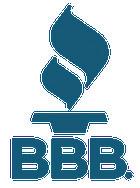

Automatically stream your best reviews with a widget on your website and share your best reviews on social media.
REVIEW REPORTING
Schedule review performance reports so you can clearly demonstrate the improvement of your reputation to everyone in your business.
GET MORE 5-STAR REVIEWS!
Call ( 877 ) 406-0232 to Get Started Or visit mh.reviews to check your online reputation for free.
93% OF CONSUMERS trust online reviews as much as personal recommendations from real people.
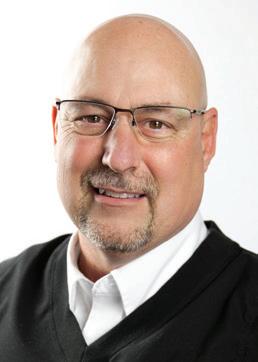
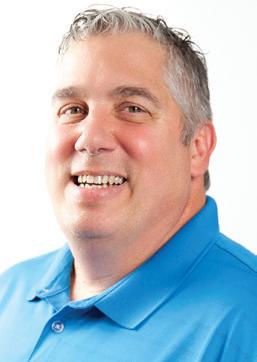

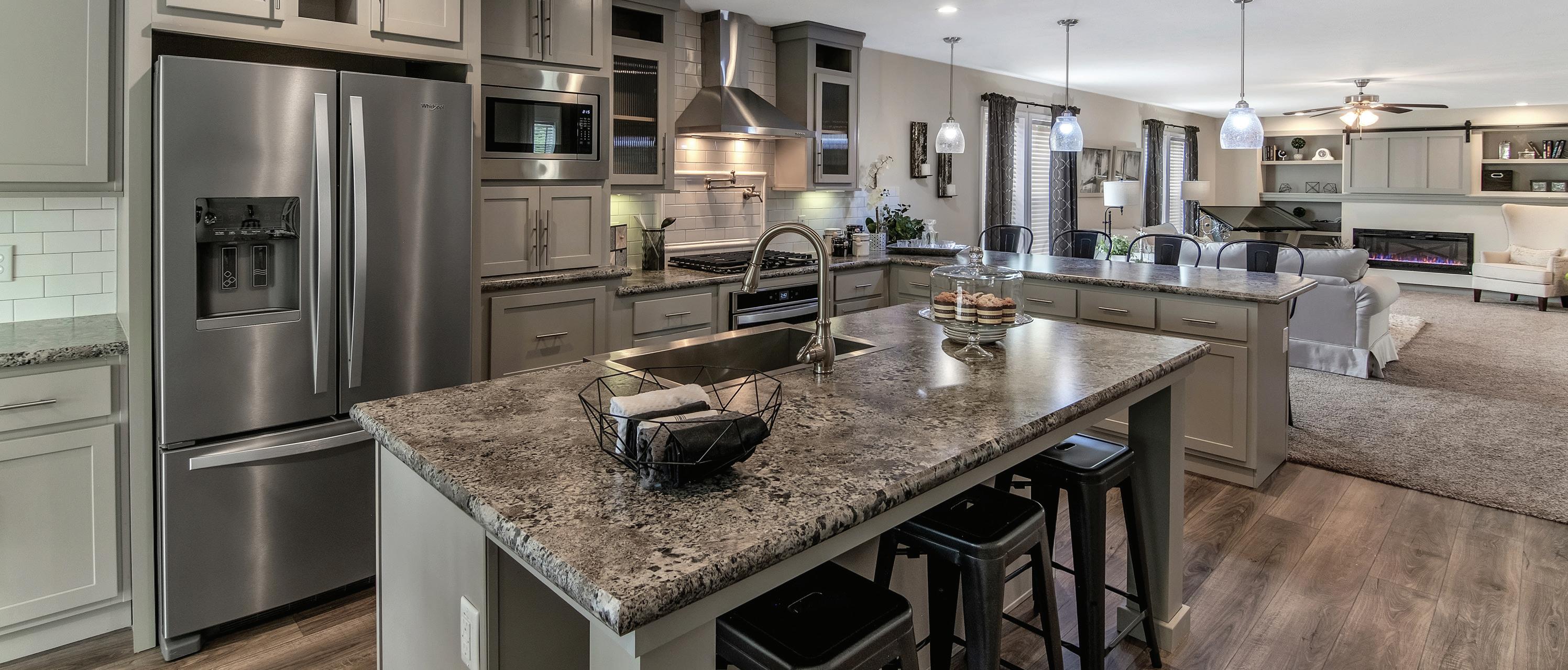
At GreenState Credit Union, our team of experienced lenders makes it easy to secure financing. Low Rates Low Closing Costs with No Points Fast Loan Closings in 7-10 business days No prepayment penalties In-House Lending Low Down Payments of just 10% of the home’s value Eric Oaks Assistant Vice President Regional Sales Representative EricOaks@GreenState.org NMLS# 728049 Serving: Illinois, Indiana, Iowa, and Wisconsin Tom Krehel Regional Sales Representative TomKrehel@GreenState.org NMLS# 1435538 Serving: Michigan and Ohio Contact us to learn more or apply online at GreenState.org/ManufacturedHomes Manufactured Home Loans Fast. Easy. Affordable.
New Communities: How to Best Capture and Use Solar Power
As the push for renewable energy continues, it’s becoming increasingly common for new residential developments, including new manufactured home communities, to plan for and implement solar efficiencies.
Incorporating solar power into designs can earn the developer tax credits, lower monthly operating expenses, and create perks for new residents.
But how can developers and builders ensure they're making the most of this sustainable resource?
How to Optimize Solar in New Construction
From the very start, it's important to conduct a feasibility study to determine the best locations for solar panels and the potential solar energy output for the area.
The purpose of a solar feasibility study is to identify any obstacles for a solar installation including shading
from trees or buildings, building orientation, or local weather patterns. When the best site locations for solar panels have been identified a developer can begin to contemplate incorporating solar power into the community design.

Tips for Installation, Infrastructure
Installation may involve the intentional design of south-facing roofs of common area buildings. Many community owners who use solar, whether in the design of a new development or as part of a project to upgrade amenities, have taken to installing solar panels atop parking structures. Solar installers are looking for flat, sturdy surfaces with that ideal south-facing perspective, although it should be noted that many sunny locations can do just fine with a mix of south-, east-, and west- facing structures. »
MHINSIDER.COM | 25
ENERGY & EFFICIENCY
In states and utility jurisdictions with strong net-metering regulations, solar installations are solid money-makers on their own. Net metering means that the power company credits you for times of day when you are over-producing and allows you to balance out non-producing times with near-zero fees. In other locations where net metering is weak or power rate structures are tilted to the evening, energy storage systems can help to maximize the benefits of solar power, including something as simple as a bank of batteries. This will allow excess energy produced during the day to be stored and used during times when solar energy production is lower or rates are higher, such as at night or on cloudy days.
With ample storage comes the opportunity to sell back to the electrical grid — coordinated by the local government or utility — any of the energy that would go unused by residents or the community.
“The economics for solar are sound across most of the Southeast, the Plains and Rocky Mountain states, and the Southwest. Getting a financial analysis for
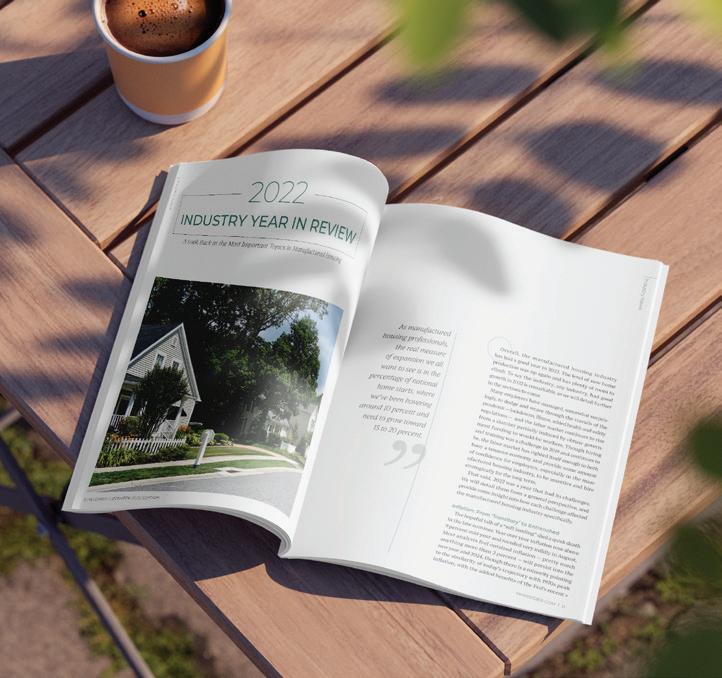





































your location and site plan is the key, and is a standard part of the evaluation process,” Nathan Stoddard of Phase 3 Photovoltaics said.
Homeowners and residents of all variety, from first-time homebuyers to retirees, have expressed an interest in using less energy to do more. Industry builders are constructing more energy-efficient homes with more insulation and better windows, for instance. Community owners have embraced sustainability and cost-saving strategies, too, which include the use of LED lights, motion sensors, high-efficiency HVAC, and smart devices. MHV

26 | MAY / JUNE EDITION
Manage Your Subscription Online Want MHInsider news in print and online, or just digital? Need to add or remove a colleague? Place a hold? Change an address? Use the subscriber number on your mailing label to manage your subscription or create your online account. Go to http://subscriber.mhinsider.com on your computer, tablet or phone. Thank You for Reading! ENERGY & EFFICIENCY To Advertise, call: 1-877-406-0232 Reach Over 30,000 Manufactured Housing Professionals in Print and Online

WAMH’s Mission to Advance Women in the Industry
 by Vanessa Perry
by Vanessa Perry
When considering workforce development in the manufactured housing industry it is quite fitting to highlight an organization whose mission is to elevate the women who contribute to it. Women Advancing Manufactured Housing does that and more. Established in 2021, WAMH is a non-profit organization that supports the industry in a women-led effort to improve the perception of this vital housing category throughout the U.S., and by helping enhance the knowledge of WAMH membership.
WAMH leadership consists of five executive committee members:
· WAMH Co-chair and Owner/Co-Founder of Dynamic MH Solutions Justine Natalie
· WAMH Co-chair and Regional Manager/Director of Marketing for Newport Pacific Capital Company Maria Horton
· WAMH Deputy Chair and Vice President of Product Management at LightBox Sherrie Clevenger
· WAMH Secretary and Owner of Affordable Casa Group Kim Shultz-Rainford
· WAMH Treasurer and Executive Vice President/Comptroller of Pentagon Properties Maryuri Barberan.
The executive committee conducts quarterly member meetings to discuss industry topics and hear presentations from guest speakers. Membership in the organization has already exceeded 300 industry professionals and continues to grow.
“WAMH was created about two years ago by a group of women who attended the SECO Conference,” Clevenger said. “During one of the virtual conference chatrooms, someone asked if there was a group for women in manufactured housing. After several
28 | MAY / JUNE 2023 EDITION WORKFORCE DEVELOPMENT
women showed interest, a discussion about the need for a group turned into a roundtable discussion the next evening. At that roundtable, our mission was drafted. One month later, our goals were finalized.”
Women Advancing Manufactured Housing Objectives and Programs

WAMH’s goals are to:
· Provide a supportive network of women and men to increase the presence and voice of women in the manufactured housing industry. WAHM is led by women and is open to all.
· Improve the perception of the manufactured housing industry.
· Create a collaborative effort for general industry answers and expand the knowledge of each WAMH member.
WAMH’s Programs Include:
· Workwear For Success—Provides needed funding to purchase attire for those who work in manufactured housing or a related industry.
· Excellence Scholarship —Offers educational opportunities for people who work in manufactured housing.
· WAMH High Five —Recognizes individuals for accomplishments, collaboration, or expanding member knowledge.
Horton said she believes the need for this organization has been in the hearts and on minds of many women in the manufactured housing industry for quite a while.
“Looking for a place to network with others in the industry, this dream quickly became a reality,” she said. “With the support of those who truly believed in the need, we were able to form WAMH.
“WAMH wants to make a difference and help others in the industry,” Horton said. “Many thanks to the women behind the scenes as well as the women owners and executives who are leading the way for our career growth.”
Shultz-Rainford said the need for women to have an increased presence and voice in the industry is strong.
“We approach problems differently and have the potential to make drastic improvements, as our members work in all facets of manufactured housing
every day,” Shultz-Rainford said. “The industry has suffered from a negative perception in the past and we are striving to improve it through exposure, education, and knowledge.”
As stated in WAMH’s goals, the organization is open to everyone.
“Our goal is not only to help women, but to advance the industry as a whole,” Natalie said. “WAMH programs are meant to help anyone in need of assistance, and we encourage all professionals to apply.”
The collaboration and knowledge shared between members can be truly invaluable.
“We are constantly helping each other grow because it truly takes a village to make a difference,” Barberan said.
Rent Manager’s Involvement in Women
Advancing Manufactured Housing
Rent Manager®, a provider of property management software, is a sponsor of WAMH, and proud to endorse the mission and vision of the organization.
“Rent Manager has participated in many, if not all, of our events to date,” Clevenger said. “Its team has supported WAMH members by sharing perspectives on agenda topics, as well insight during general industry conversation.
“The Rent Manager team interacts with people on many different levels in the industry and brings so much knowledge and experience to our WAMH members.”
To become a member of WAMH, simply request to join the WAMH LinkedIn group. To learn more about WAMH and become a supporter of the organization, visit the website at www.womenadvancingmanufacturedhousing.com. MHV
Vanessa Perry is a content developer for London Computer Systems, a developer of business-critical software whose flagship product is Rent Manager property management software, a fully customizable program with features including a double-entry accounting system, short-term rental resources, metered utilities tools, home asset tracking capabilities, intuitive mobile apps, more than 450 insightful reports, and an API that integrates with the best proptech providers on the market.
MHINSIDER.COM | 29
State, Local Impact on Industry Workforce
Logan Hanes, the executive director of the Kentucky Manufactured Housing Institute, recently outlined a series of initiatives for MHInsider that involve association staff and members at work in the field helping young people understand the value of the trades.
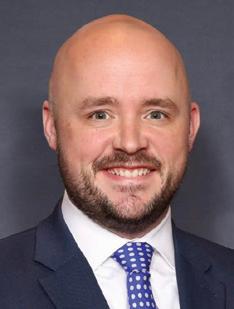

Logan, how does KMHI directly impact opportunities for students who might want to enter our industry?
KMHI offers seven $1,000 scholarships every year. Five of these scholarships are targeted to students who will be attending a trade school, apprenticeship, or going to a traditional university with a construction trade major.
Are you involved in any efforts to provide an immersive experience for young people?
K4C is a group of construction-focused organizations with a focus on providing two career days every September. These career days are very hands-on and allow students to operate heavy machinery, work on welding projects, and build carpentry projects. We have set up obstacle courses where students drive a
house tug through them, and we serve on the board to help organize the event.
We also work with SkillsUSA, a high school and post-secondary club for students to compete at the school, regional, state, and national levels in areas such as basic carpentry, advanced carpentry, welding, and something we call teamwork, which is a group project where four students do carpentry, plumbing, electrical, and masonry. KMHI has sponsored these competitions and chaired many of them. Here, we create and design the project, assemble judges, and grade the projects.
Tell me something that you feel is important for students to consider.
A few years ago, I created a marketing campaign where we talked about how the average college graduate pays off their student loans at 42. Your net worth finally becomes zero assuming you have no other debt. If a student goes into a trade and makes $50,000 a year, which is the average gross salary in Kentucky for a construction trade worker, and they invest 10% of their income into an aggressive growth mutual fund, by 38 they would have a $1 million net worth based on historic compound interest. MHV
30 | MAY / JUNE 2023 EDITION
WORKFORCE DEVELOPMENT
EACH COMMERCIAL SOLAR PROJECT IS DESIGNED AND DEVELOPED IN-HOUSE, FROM START TO FINISH, BEGINNING WITH OUR PROPRIETARY
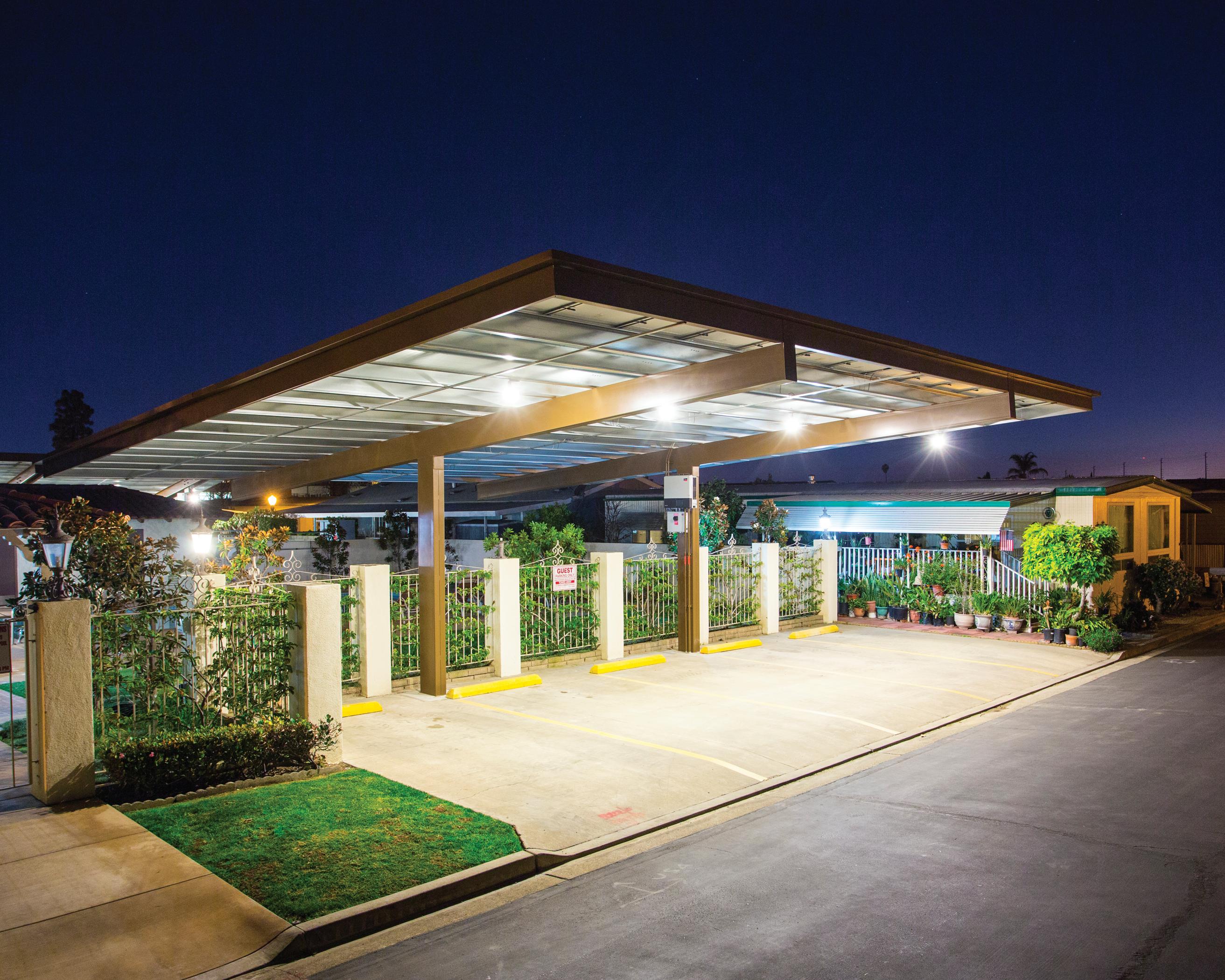
WWW.SHOREBREAKENERGY.COM 9 4 9 . 5 0 2 . 0 8 0 0 CLSB # A, C10-972616
HOME PARK SOLAR
THE LEADER IN MOBILE
ENERGY
SOLAR ENERGY AUDIT • DESIGN & ENGINEERING • INSTALLATION • MONITORING • MAINTENANCE
SOLAR
ANALYSIS/AUDIT
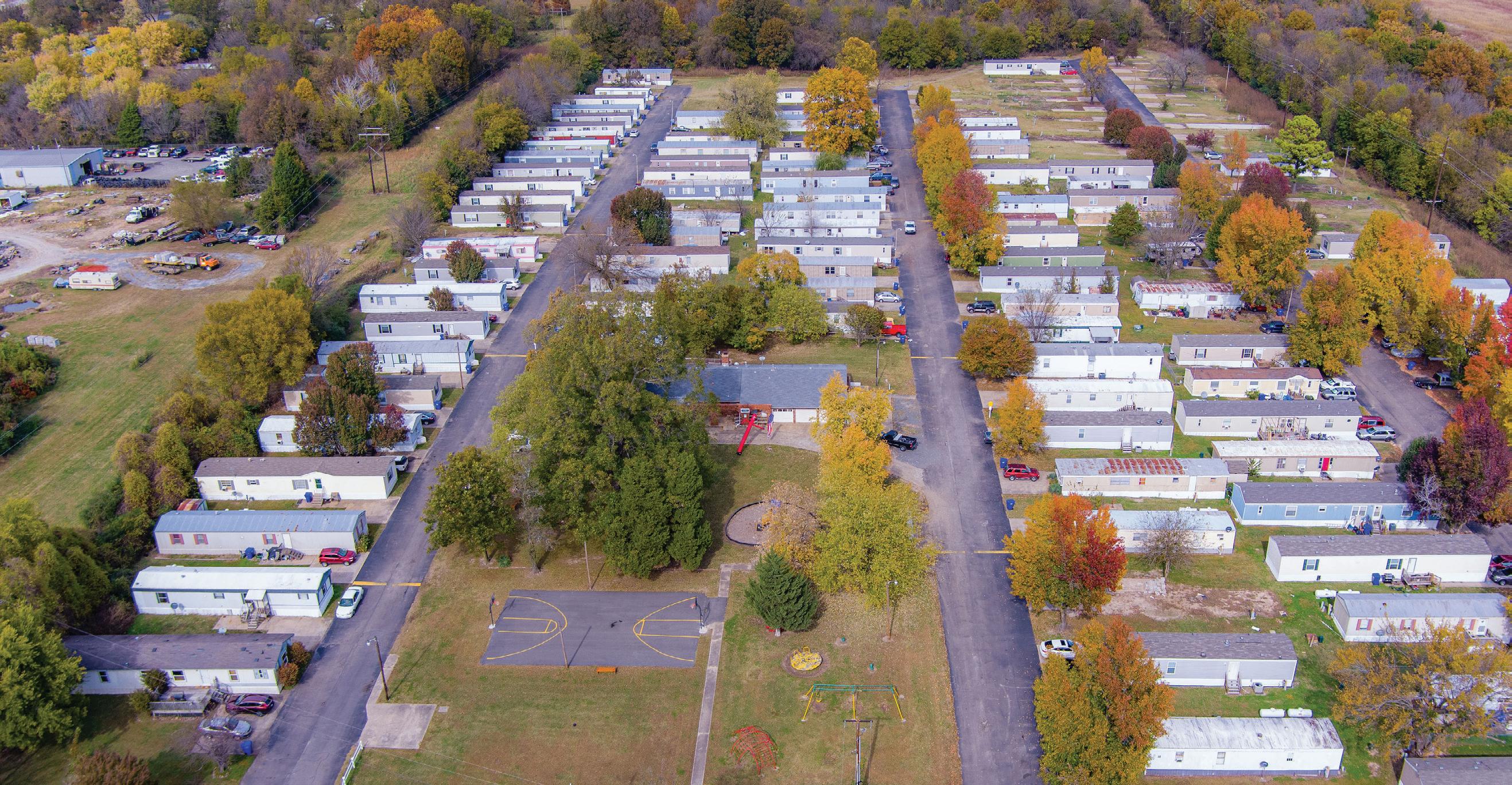


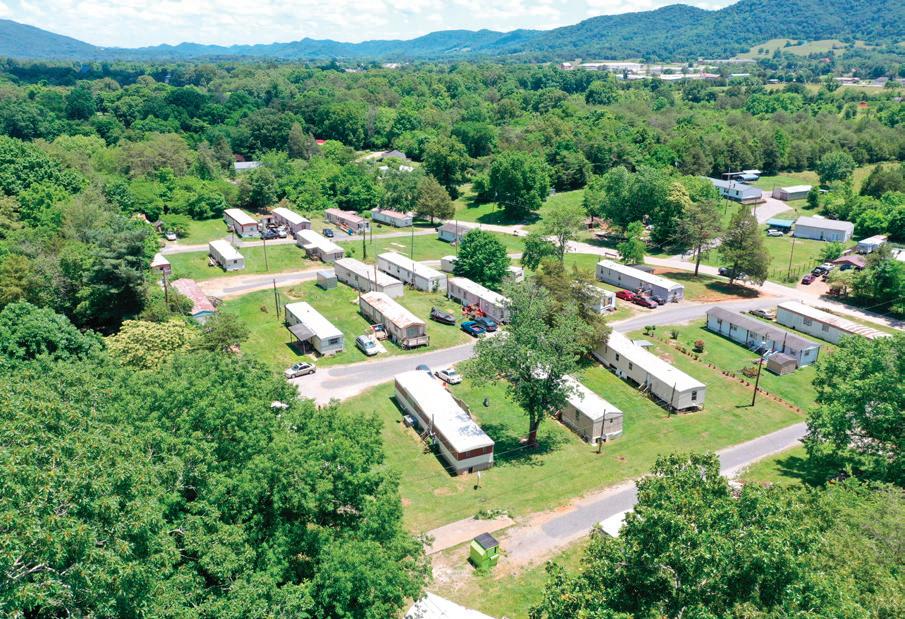
800-309-5008 or CLT@vmf.com Park Owned Home Income Considered Up to 80% LTV 30 Year Amortization Quick Closings Flexible Terms $700,000 min loan amount FLEXIBLE TERMS: Vanderbilt Mortgage and Finance, Inc., 500 Alcoa Trail, Maryville, TN 37804, 865-380-3000, NMLS #1561, (http: //www.nmlsconsumeraccess.org/), AZ Lic. #BK-0902616. Loans made or arranged pursuant to a California Finance Lenders Law License. All Loans Subject to Credit Approval. A Berkshire Hathaway Company MULTI PARK IN AUBURN, GA MULTI PARK IN WAKE FOREST, NC MULTI PARK IN EAST TENNESSEE $7,625,000 $4,500,000 $2,000,000 RECENT FUNDINGS We Finance Communities. Contact Seth, Austin & Libba today for your community financing needs at
Tax Saving Strategies for Community Owners

‘Where Does the Money Go?’
The Power of Choice: Exploring Real-World Examples
Bruce Jones is the founder and CEO of TaxWealth, a California-based tax analysis and solutions research company that helps its clients solve capital gains and other tax problems by using tax deferral and other planning methods.
As a manufactured home community owner, the decision to sell can be fraught with uncertainty, especially when it comes to tax implications. In today's market, many are wondering, "Where does my money go?" For those who have been operating for decades, this question is even more pressing.

But there are ways to improve financial outcomes when selling, by minimizing capital gains taxes and maximizing liquid assets to invest.
Understanding Tax Deferral Strategies: Exchange or Installment Sale



When selling a manufactured home community, the tax codes offer planning options that can significantly reduce out-of-pocket expenses, such as capital gains taxes. Two key strategies include tax-deferred exchanges and installment sales.
A tax-deferred exchange involves purchasing a new property of equal or greater value than the property being sold. This postpones the capital gains taxes the seller would have otherwise paid. However, this option may not be ideal for those looking to retire and divest from property ownership.
An installment sale is a contract that allows the seller to defer taxes for decades. This option allows for a tax-free lump sum that is nearly equivalent to the sale proceeds, with no qualification on how it may be reinvested.
“Property and business owners are often surprised to learn that their tax obligation when they decide to sell may be even higher than the current 20% federal capital gains tax and the state tax rate they would also have to pay,” Jones said. “Manufactured home community owners can benefit greatly from tax deferral strategies like exchanges or installment sales to address their tax obligations and achieve their financial goals. Understanding all the options and the potential tax implications when selling a property is crucial. The good news is that they have choices.”
For instance, a California property owner who had a $10 million property with a taxable gain of $7.5 million would face $2.8 million in capital gains taxes. If they opted for a conventional sale, they would receive $2.7 million after paying off the debt and taxes. But by using a tax deferral planning approach, the property owner was able to pay off the debt at the time of the sale, defer taxes for decades, and receive $5.5 million tax-free to reinvest. MHV

MHINSIDER.COM | 33 LAND USE
Your Hassle Free Solution to Risk Management mhwconline.com MHWC NEW HOME WARRANTIES Written Insured New Home Warranties for Manufactured Homes 800-247-1812 x2188 | sales@mhwconline.com
Changing the Rules for Affordable Homes in Opportunity Zones

LAND USE
In March, UMH Properties CEO Sam Landy introduced a letter to the Senate Finance Committee in support of potential changes to opportunity zones that would allow for an influx of much needed affordable housing.
An opportunity zone is a geographic area designated by the United States government where certain investments can receive preferential tax treatment in order to spur economic development and job creation in economically distressed communities. These zones were created as part of the Tax Cuts and Jobs Act of 2017.
Investors who invest capital gains into Qualified Opportunity Funds that then invest in qualified businesses or properties within designated zones may be eligible for tax benefits, such as temporary deferral, reduction, and even elimination of certain capital gains taxes. The purpose of this program is to encourage investment in underdeveloped communities and provide investors with a tax incentive to put their capital to work.
In a conversation with MHInsider, Landy said he and his team conducted a field survey of opportunity zones that would be viable locations for manufactured housing.
“There are manufactured home communities in opportunity zones that need to be upgraded, and promising properties where we can raise money to build new communities,” Landy said. “We have identified $100 million in investment opportunities in six months, and we continue to survey new areas.”
The lone caveat in taking advantage of an opportunity zone for manufactured housing professionals is the requirement that investment must come from equity interest income realized within the last 180 days.
“What does it matter where the money comes from when we’re talking about satisfying a need that everyone agrees on in affordable housing?” Landy asked.
The language change as proposed is captured in a simple 54-word appendix to the code:
(d) Additional Flexibility for Investments in Manufactured Home Communities
Investments in manufactured housing communities that meet all other requirements of this section shall be eligible for the tax treatment in subsection (c), notwithstanding a failure to meet the requirements of subsection (a)(1)(A) of having a gain during the 180-day period prior to such investment.
“We know everyone is interested in much-needed new housing, so we’re simply asking to waive that 180-day requirement for this reliable type of housing,” Landy said. “It’s going to fall right into the investment horizon for those interested in our efforts.”
The March 7 hearing on “Tax Policy’s Role in Increasing Affordable Housing Supply for Working Families” was called by Chairman Sen. Ron Wyden, (D), of Oregon, and Ranking Member Mike Crapo, (R), of Idaho. In addition to testimony provided by UMH and Landy, the Manufactured Housing Institute provided its support for the potential change, and suggested support for manufactured housing i n other areas of the tax code.
“MHI also asks the Committee to explore ways to make current tax incentive programs more effective in generating investments for manufactured home communities,” MHI stated for the record. “Manufactured home communities are a critical affordable housing model. Because of the financial and lifestyle benefits of owning a manufactured home versus the limitations that come with renting an apartment or buying a condominium or other site-built home, millions of individuals and families have chosen to live in land-lease manufactured home communities.”
The industry awaits discussion on the bipartisan topic of reducing barriers for affordable housing and the potential for a bill on the change in opportunity zone requirements.
“As much as anyone can be optimistic that legislation is going to be adopted, we are optimistic,” Landy said.
What follows is a full, unedited republishing of Landy’s letter to the committee. »
MHINSIDER.COM | 35
Written Statement of Sam Landy President and CEO of UMH Properties
3499 Route 9 Suite 3C Freehold, NJ 07728
Senate Finance Committee Hearing
March 7, 2023
“Tax Policy’s Role in Increasing Affordable Housing Supply for Working Families”
I am pleased to submit this statement for the record for the March 7, 2023, Senate Finance Committee Hearing on “Tax Policy’s Role Increasing in Affordable Housing Supply for Working Families.”
I am submitting this statement in order to request that the Committee consider adoption of legislation to amend the existing Opportunity Zone statute to promote affordable workforce housing.
I am the President and CEO of UMH Properties Inc., one of the premier owners and operators of manufactured home communities in the Nation. UMH Properties is publicly traded on the New York Stock Exchange. We currently own 135 manufactured home communities in 11 states with approximately 25,700 developed homesites. Seven of our communities are currently located in Opportunity Zones. I have worked in the manufactured housing industry since 1985 and have been President of UMH Properties since 1994.
UMH Properties has a 55-year history of providing quality affordable housing in manufactured home communities. Videos of our communities are available on our website and showcase the high-quality affordable housing that can be delivered through investment in manufactured home communities. We rent 1,000 sq. ft. three bedroom, two bath, modern, energy efficient, vinyl sided, shingle roofed homes on 5,000 sq. ft. lots for $800 per month and up, to families with household income of $32,000 and up. We also sell both single section 1,000 sq. ft. homes and 1,800 sq. ft. multi-section manufactured homes to people who buy the home and rent the lot. Those homes sell from $80,000 to $250,000 and have lot rents as low as $400 per month in our community.
Manufactured housing is the most affordable homeownership option available for low- and moderate-income families in America. The average income of a manufactured home buyer is $35,000
– while the average income of a home buyer buying a site-built home is over $100,000. Residents of manufactured home communities consist of people of all ages, family status, and incomes. We find that many residents seek manufactured housing based on the lower monthly payment derived from owning a financed manufactured home and renting a lot in a community as compared to owning land for the home and paying a mortgage and taxes on that land or renting an apartment or buying a house. Other residents use the proceeds of the sale of an existing home to pay all cash for a manufactured home and then only pay the lot rent. And other residents do not have the down payment or other ability to qualify for financing the purchase of a manufactured home and chose to rent the manufactured home. Further many people see themselves as needing a short term, less then three-year, affordable housing solution and see renting a manufactured home in a community as the best lowest cost solution. Since 2011 we have rented over 9,000 manufactured homes for monthly rent as low as $800 per month.
Manufactured home communities – also known as land-lease communities - are a critical model for the delivery of affordable manufactured homes. 51% of new manufactured homes are currently being placed in manufactured home communities. There are more than 43,000 land-lease communities in the U.S., representing almost 4.3 million homesites. These communities offer sites for families to place their manufactured homes, with professional management of the community and amenities that go with it.
One of the greatest challenges facing older manufactured home communities is the need for an infusion of funds to address neglected capital improvements like roads, sewer, and water. UMH Properties has been highly successful in purchasing aging manufactured home communities in need of significant capital repairs - in order to modernize them and thereby protect the value of the investments of the manufactured homeowners living in those communities at affordable land lease rental rates. Further we add rental homes to fill the vacant lots in those communities and increase the supply of affordable work force housing in the community.
36 | MAY / JUNE 2023 EDITION
LAND USE
These purchases and improvements of aging communities require significant investments.
UMH Properties has a total market capitalization of approximately $2 billion, with gross revenue of over $190 million per year. UMH invests over $70 million a year in new rental homes and capital improvements to improve our manufactured home communities. These investments allow us to provide our residents with the highest quality affordable housing at the most reasonable rates. UMH shareholders include the pension funds that our residents have equity interests in.
UMH has successfully renovated and upgraded seven manufactured home communities in opportunity zones and sees the brilliance of the idea of tax incentives attracting capital to previously underinvested areas of the country. UMH’s experience in opportunity zones and renovating communities in Nashville and Memphis convince us that the concept of providing investors who make ten-year investments in affordable housing in opportunity zones with tax benefits results in the increased supply of badly needed affordable housing and further attracts employers and additional jobs and tax revenue to areas of the country that previously suffered from economic stagnation.
increase the pool of capital flowing into opportunity zones to create affordable housing.
It is our opinion that the greater the supply of funds invested in affordable housing in opportunity zones the quicker the area will become economically able to be self-sufficient from growing tax revenue that employers seeking the quality work force a supply of affordable housing will bring to the areas provide.
There are more than 43,000 land-lease communities in the U.S., representing almost 4.3 million homesites. These communities offer sites for families to place their manufactured homes, with professional management of the community and amenities that go with it.
We therefore seek removal of the existing opportunity zone requirement that investments be a reinvestment of funds from a capital gain realized in the preceding 180 days provided the investment is for affordable housing through manufactured homes in opportunity zones. With this amendment any funds invested in affordable housing in opportunity zones should receive a stepped-up basis if the investment is held for ten years or longer. Legislatively, this could be achieved in a simple manner, by creating a short new subsection in the statute that would grant authority for this. We have attached a draft of our proposal.
UMH believes that the current opportunity zone fund law could be amended slightly so that far more meaningful investment is made in affordable housing in opportunity zones. Our experience is that the existing law inadvertently limits the pool of capital available to create affordable housing in opportunity zones by requiring those funds come from existing capital gains. That requirement is the basis for the criticism of the opportunity zone program only being available to the wealthy who have capital gains. We believe opening up affordable housing investments through opportunity zones to all investors will greatly
With this change, we are confident that UMH Properties and other manufactured home community operators could access significant new investment funds to help build and modernize communities in opportunity zones nationwide that facilitate the most affordable housing option available, manufactured homes.
This approach is narrow and targeted. It would not facilitate investments that could be criticized as deviating from the objectives and intent of the Opportunity Zone program. It is limited to investments that facilitate affordable manufactured housing- a high priority for Congress and the Administration and an important public policy objective.
Finally, it would not allow investors to access the deferment and potential permanent elimination for capital gains that have already taken place. Since the latter is the most costly component of Opportunity »
MHINSIDER.COM | 37

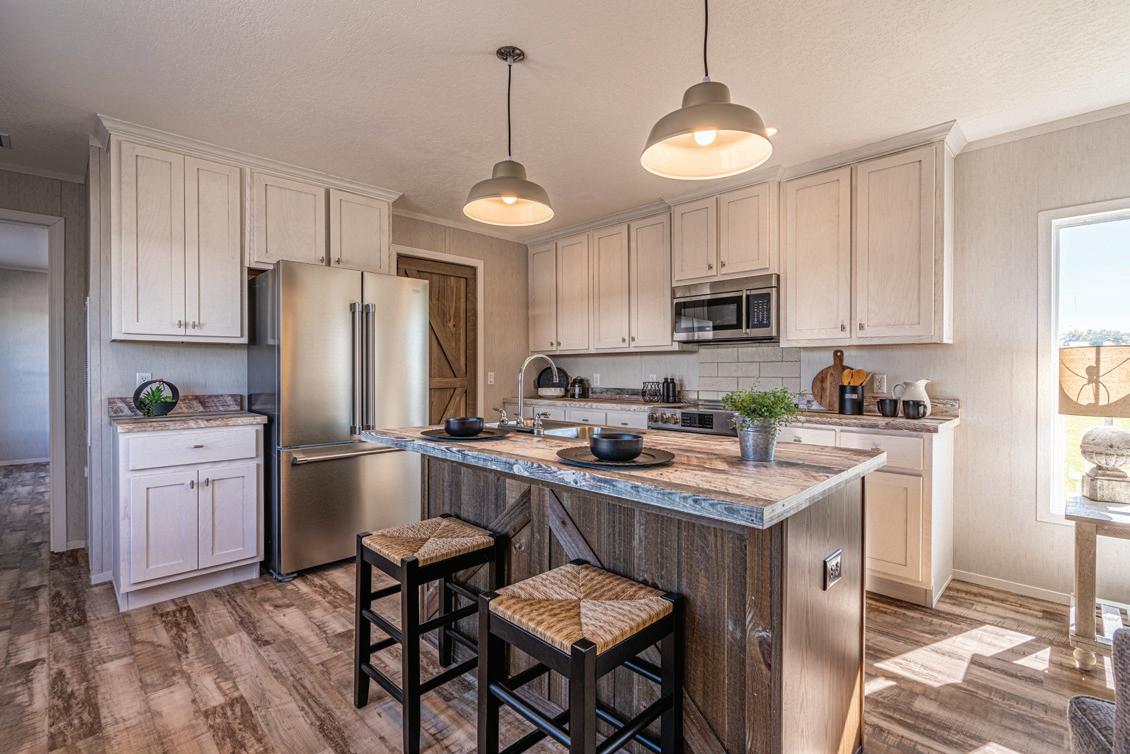
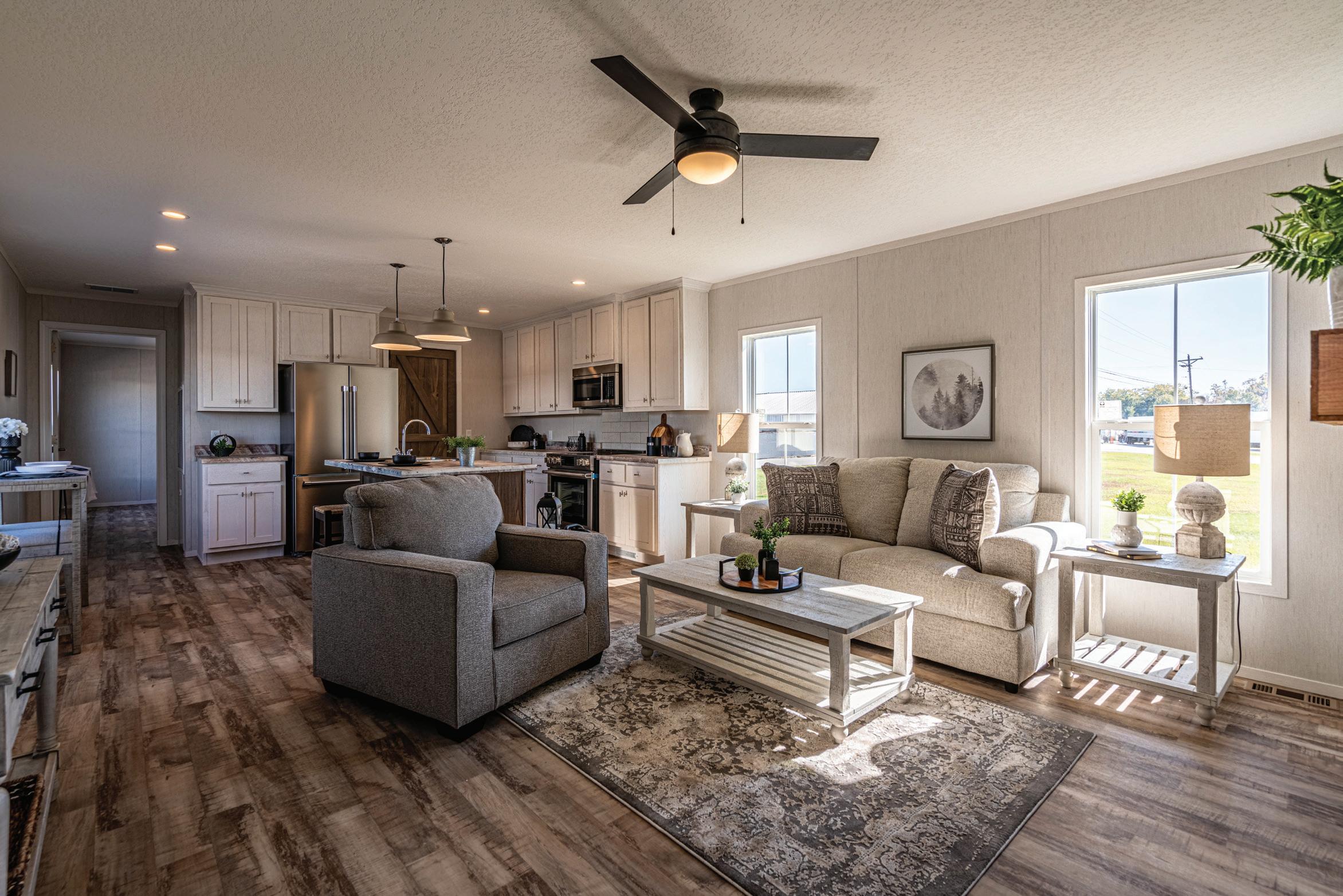
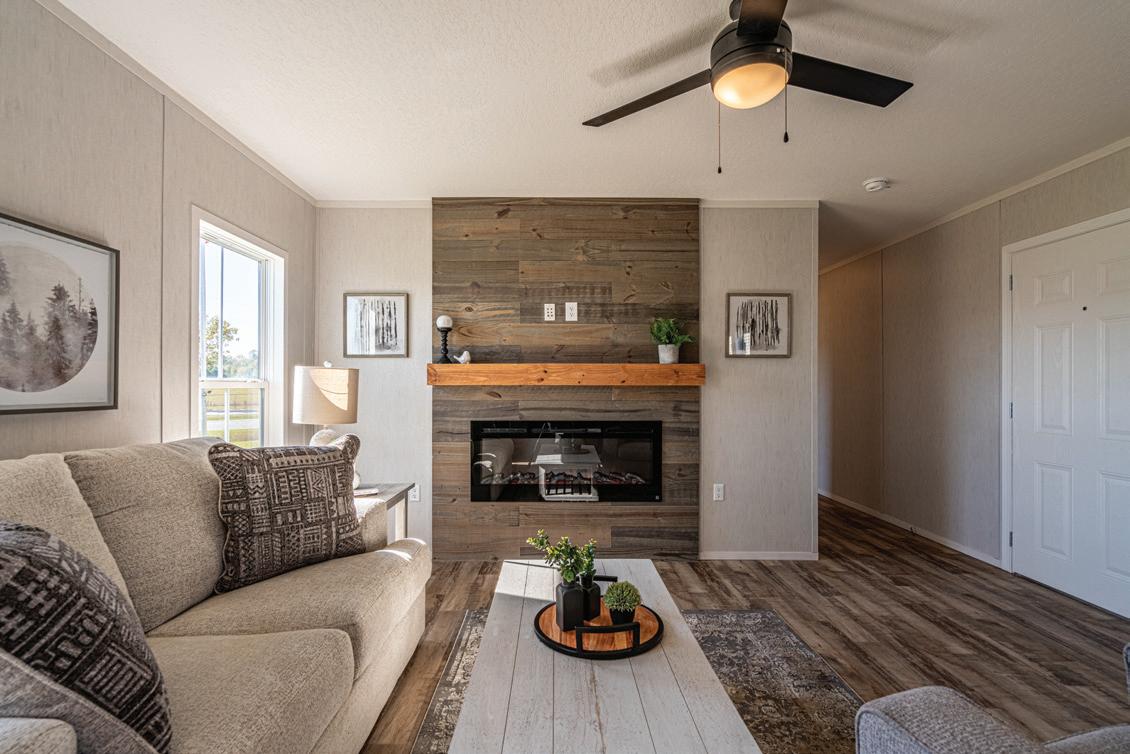




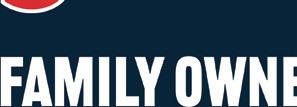











Zone tax treatment and since the proposed flexibility is narrowly targeted to a specific limited activity, we believe the tax scoring cost of this provision would be very small, while the societal and economic benefits would be substantial.

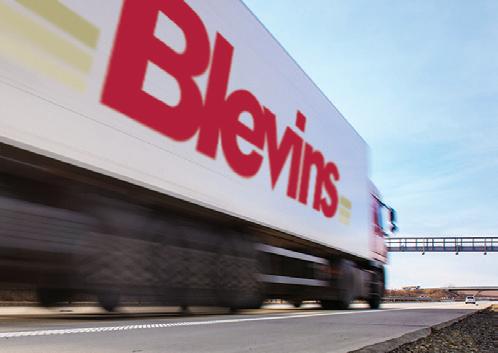

I also understand that inflation is currently creating hardship for some resident homeowners in manufactured home communities due to rent increases and I’d like to address that issue based on my 47-year experience in the industry. The solution to the problem regarding newly built communities is to follow the Florida policy of requiring a prospectus from the community owner disclosing all potential fees and rent increases before a person purchases a home or moves it into a community. That prospectus coupled with a long-term lease that matches the term of the loan on the home results in fairness for the community owner and the resident. In the case of UMH new home buyers are offered a long-term lease, usually 20-25 years, that allows rent increases of CPI or 5%, whichever is more, plus pass through of increases in water, sewer, garbage and taxes. This results in
reasonable rent increases that cause minimal to no friction between UMH and our residents. Except for the 2009-2011 period anyone who bought a home from UMH was able to sell it for more than they paid us for it, provided they properly maintained it.
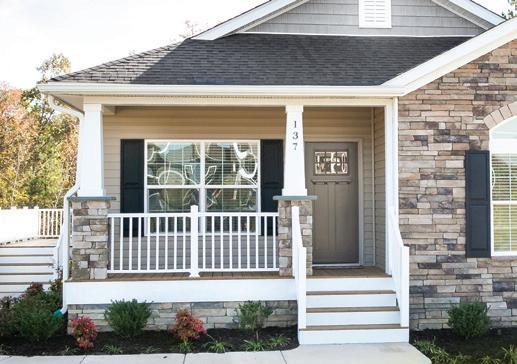
Regarding existing communities there are laws on the books in most states prohibiting unconscionable rent increases. Further there is a covenant of good faith and fair dealing in all contracts. There are 43,000 existing communities and I am certain the problems you hear about pertaining to rent increases are coming from a very small percentage of those communities.
In closing, I thank the Committee for the opportunity to submit this statement and I would be happy to make myself available to Committee staff to discuss this initiative in more detail. MHV
40 | MAY / JUNE 2023 EDITION
LAND USE TWO TIME AWARD WINNER MHI SUPPLIER OF THE YEAR TWO TIME AWARD WINNER MHI SUPPLIER OF THE YEAR CONNECTING PEOPLE WITH PRODUCTS THAT ENHANCE HOMES www. BLEVINSINC .com Visit www.BLEVINSINC.com to find which of our 15 LOCATIONS is nearest YOU! Since 1971, Blevins has been family owned and operated. Our COMMITMENT to OUR CUSTOMERS is to o er the best products in the industry. Whether you are down the street or across the country, Blevins is proud of our ability to get product in your hands quickly with over $30 million in inventory from any one of our STRATEGICALLY LOCATED BRANCHES As an INDUSTRY LEADING SUPPLIER, our dependability ensures the right products get to you at the right time. Go to http://subscriber.mhinsider.com on your computer or mobile device Manage Your MHInsider Subscription Online!


Water Submetering Optimized for Mobile Home Parks Call us Now for Info: 303-217-5990 Save 30% on your Water Bill! www.MetronSubmetering.com with Advanced Analytics TM Flow Rate 0.0 0.5 1.0 1.5 2.0 2.5 3.0 3.5 GPM Consumption 05:00 07:00 09:00 11:00 13:00 15:00 17:00 19:00 21:00 0 10 20 30 40 50 60 70 80 G 00:00 02:00 04:00 06:00 08:00 10:00 12:00 14:00 16:00 18:00 20:00 22:00 Flow Rate 0.0 0.5 1.0 1.5 2.0 2.5 3.0 3.5 GPM Toilet Flush Sink Usage Shower Kitchen Use Toilet Flapper Leak! Time 5:05 5:10 5:15 5:25 5:20 5:30 5:35 5:40 5:45 5:50 5:55 Unit 21C Increase ROI + Property Value Protect your property from water damage and likely decrease insurance premiums with emergency leak detection Pinpoint water loss in your parks piping system

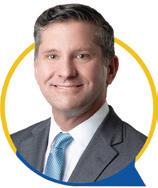
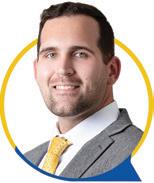
















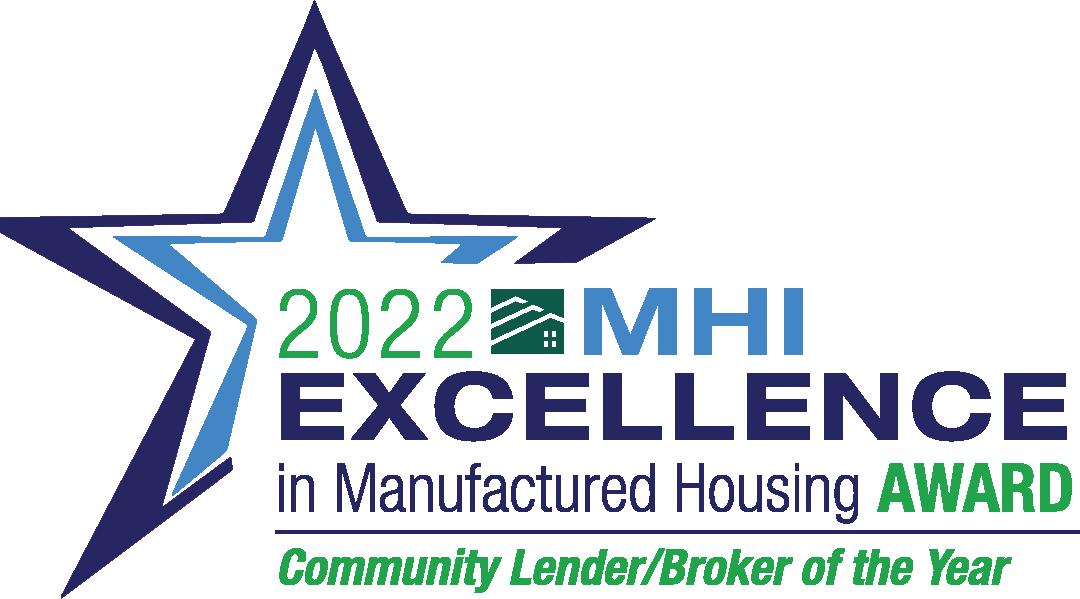
734-447-6952 MITCH GONZALEZ DIRECTOR OF LAND SALES & DEVELOPMENT 917-847-2304 JAKE LEVIN DIRECTOR OF EQUITY CAPITAL MARKETS 904-864-3978 GREG RAMSEY VICE PRESIDENT OF LENDING 305-760-9060 CHRIS SAN JOSE PRESIDENT OF LENDING 424-228-6200 CHAD LEDY PACIFIC NORTHWEST 818-474-1031 DAN COOK PACIFIC SOUTHWEST 415-686-8694 MAX HERNANDEZ GRAND CANYON 720-636-6551 BRIAN MCDONALD ROCKY MOUNTAINS 312-858-8906 KEN SCHEFLER UPPER MIDWEST 303-323-5649 DANA SMITH SOUTHWEST 305-978-0769 CHARLES CASTELLANO SOUTHEAST 305-588-5302 JAMES MCCAUGHAN MIDWEST 985-373-3472 HARRISON BELL MID-ATLANTIC 386-623-4623 JAMES COOK FL/NATIONAL YALE REALTY YALE CAPITAL YALE DEVELOPMENT The Only True Nationwide Team A Full-Service Shop Tailored Lending Options Yale Sellers Net 10-20% More Contact Us for a FREE Detailed Analysis & Valuation

Yale has successfully closed over 550 transactions. IN A CROWD OF OPTIONS ONE STANDS ABOVE THE REST Gain from our perspective. yaleadvisors www.yaleadvisors.com

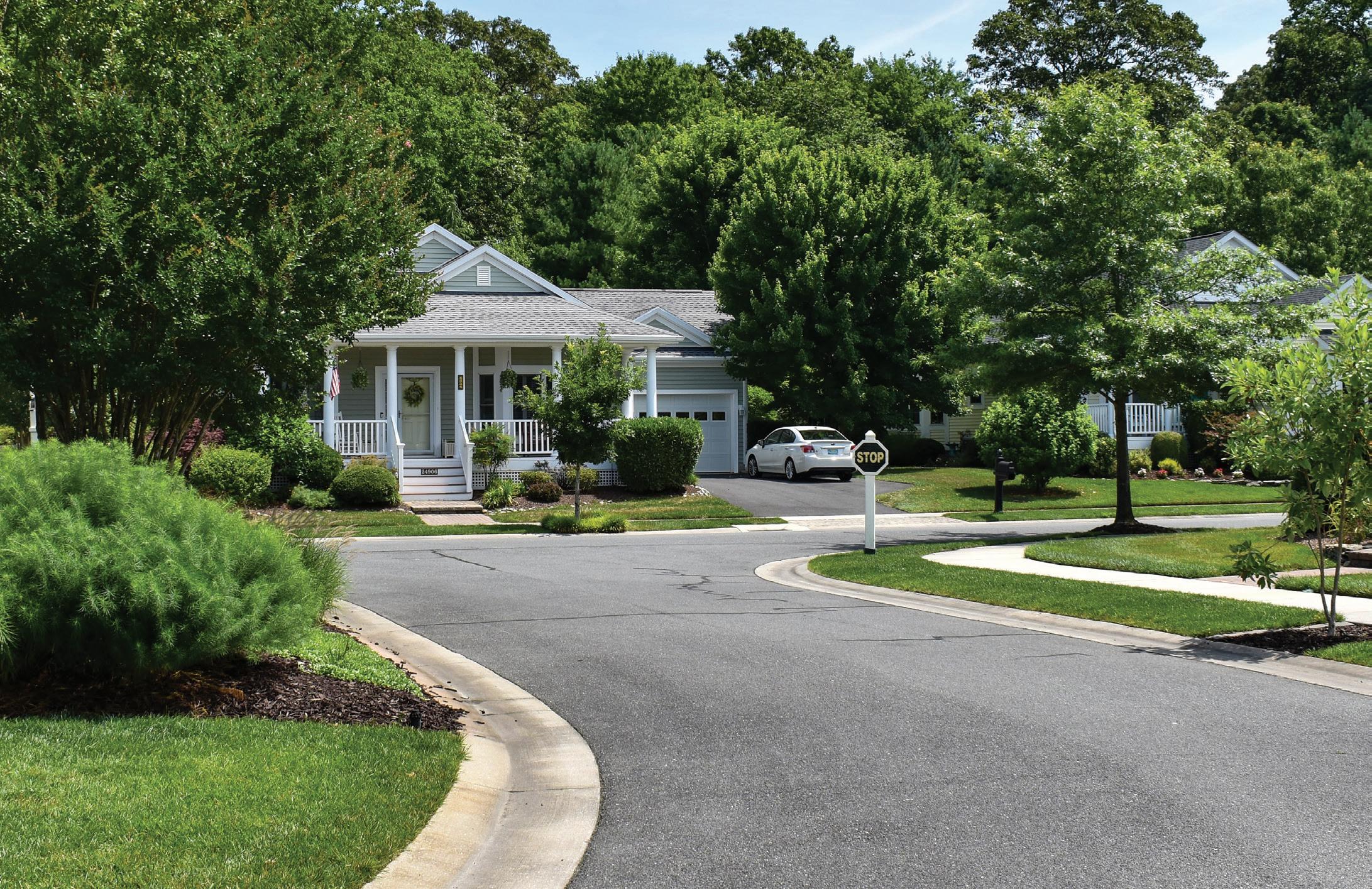
44 | MAY / JUNE 2023 EDITION LAND USE
Baywood, a community in coastal Delaware, shows what is possible in thoughtful design.
Through the Eyes of a Landscape Architect
by Donald Westphal
There is a lot of talk within the manufactured housing industry about image these days. As a landscape architect and planner of manufactured housing communities for more than 50 years, image has been an important consideration in the design and the focus of my activities in the industry. It is the source of great frustration to me that many new communities are still being designed like the trailer parks of the past.
Row on row of new homes spread out like dominoes on the land, with little apparent thought given to the final appearance of the community and the image it will portray for generations to come. Most developments are laid out by draftsmen in engineering offices with little training in effective image planning.
Why is it so?
Do developers, engineers, designers,and planners feel that our customers don’t deserve better? Is there an assumption that creative planning is too costly? Is enough energy being expended by the national and state industry organizations to promote good design as an important part of our image building strategy? Are we doing enough to educate the planners in good design and encourage and approve projects that are attractive and desirable living environments?
Our counterparts in the site-built housing business are keenly aware of the benefits of
creative planning. The traditional neighborhood development movement, open space conservation planning, planned unit developments, cluster designs, and curvilinear concepts are stock in trade for the better developers. The appearance of their developments from the street, curb appeal, and sizzle of their homes is as important a part of their merchandising effort as their floor plans, interior decorating, and furnishings. Models are creatively furnished inside and attractively landscaped outside to excite and stimulate the customer. Builder’s displays at development model centers are creatively done with renderings illustrating the final and complete appearance of the home package.
Contrast this to the way the majority of manufactured homes and developments are merchandised. Far too often our industry’s homes are pictured as “plain Jane” boxes devoid of the elements that would make it a home rather than a house. These same units regularly are shown to the public at sales centers without these important added elements.
Manufactured home community owners and subdivision developers also miss an opportunity when houses are permitted in developments without the simplest of requirements that would assure curb appeal. Even simple appearance requirements would help to assure growth in the value of the »
MHINSIDER.COM | 45
improvement in the appearance of homes on narrower homesites.
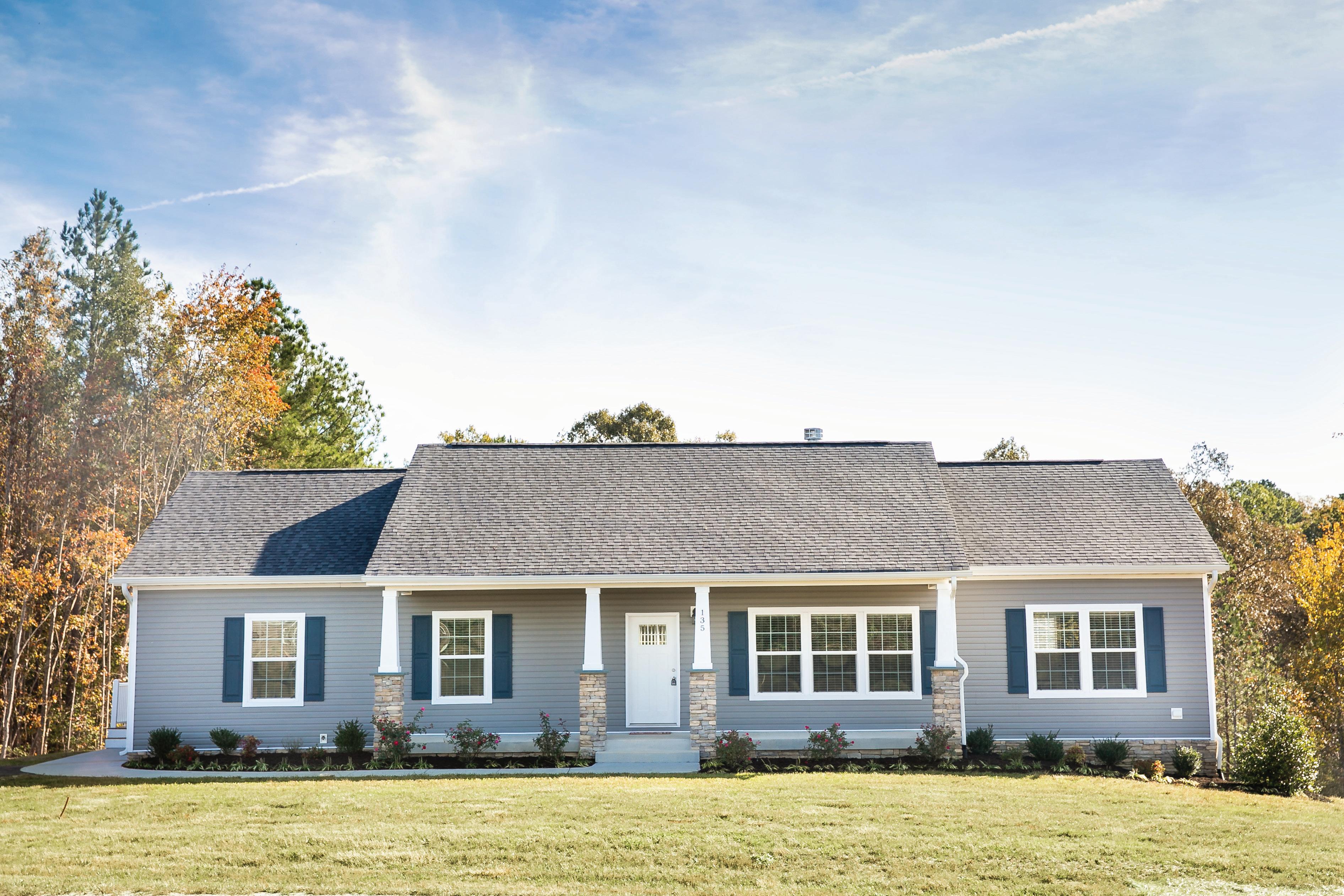
Time after time I still hear negative comment from opponents to new developments at zoning hearings about the unattractive appearance of our homes and communities. Most of this is well earned from our past performance. Perhaps if our industry were to place more emphasis on the final product, the completed home, we could more rapidly move toward greater public acceptance of manufactured homes. We always show images of attractive homes and communities at zon-
rapidly Home Only Land Home FHA VA
Study upon study sponsored by MHI have shown that with sensitivity to detail and proper presentation our homes are welcomed in most neighborhoods.

Chris Turturro NMLS 134837 972-217-5186 cturturro@cascadeloans.com www.ask-cade.com Ask Cade Scan our QR code or visit or website:


move toward greater public acceptance of manufactured We o er a variety of home loan options. Let our knowledgeable and friendly team help you find the right loan program for your customers. CONTACT for more info. This is a business to business communication and is intended for industry professionals only. This is not intended to be, and should not be, distributed to the consumer or general public. Contact Cascade for licensing information. Cascade Financial Services | 877-869-7082 2701 E. Insight Way, Suite 150 | Chandler, AZ 85286 11/2022
Unfortunately, these wide lots result in a significant increase in development cost and a reduction in density. Even developers of high-end subdivisions focus on lot width and density.
A few manufacturers are placing emphasis on CrossMod homes, homes that look good on larger lots and in scattered site settings. These too often only fit on wider lots. On the other hand, an increasing number of what we call “community series” homes place emphasis on the appearance of the narrow end of the home and has been shown to be a great
I am certain that continuing to develop new “parks” and selling incomplete homes will perpetuate the industry stereotypes that have held us down. And I am convinced that the continued growth in of our share of housing in America is dependent on our ability and willingness to view each new home sold and each new development as an opportunity to improve the image of manufactured housing. MHV

46 | MAY / JUNE 2023 EDITION
Donald C. Westphal, Associates, LLC, winner of seven Community of the Year Awards, has a 50-year history of planning great manufactured home communities and is still enthusiastically serving the industry. Learn more at www. dcwestphal.com. homes.
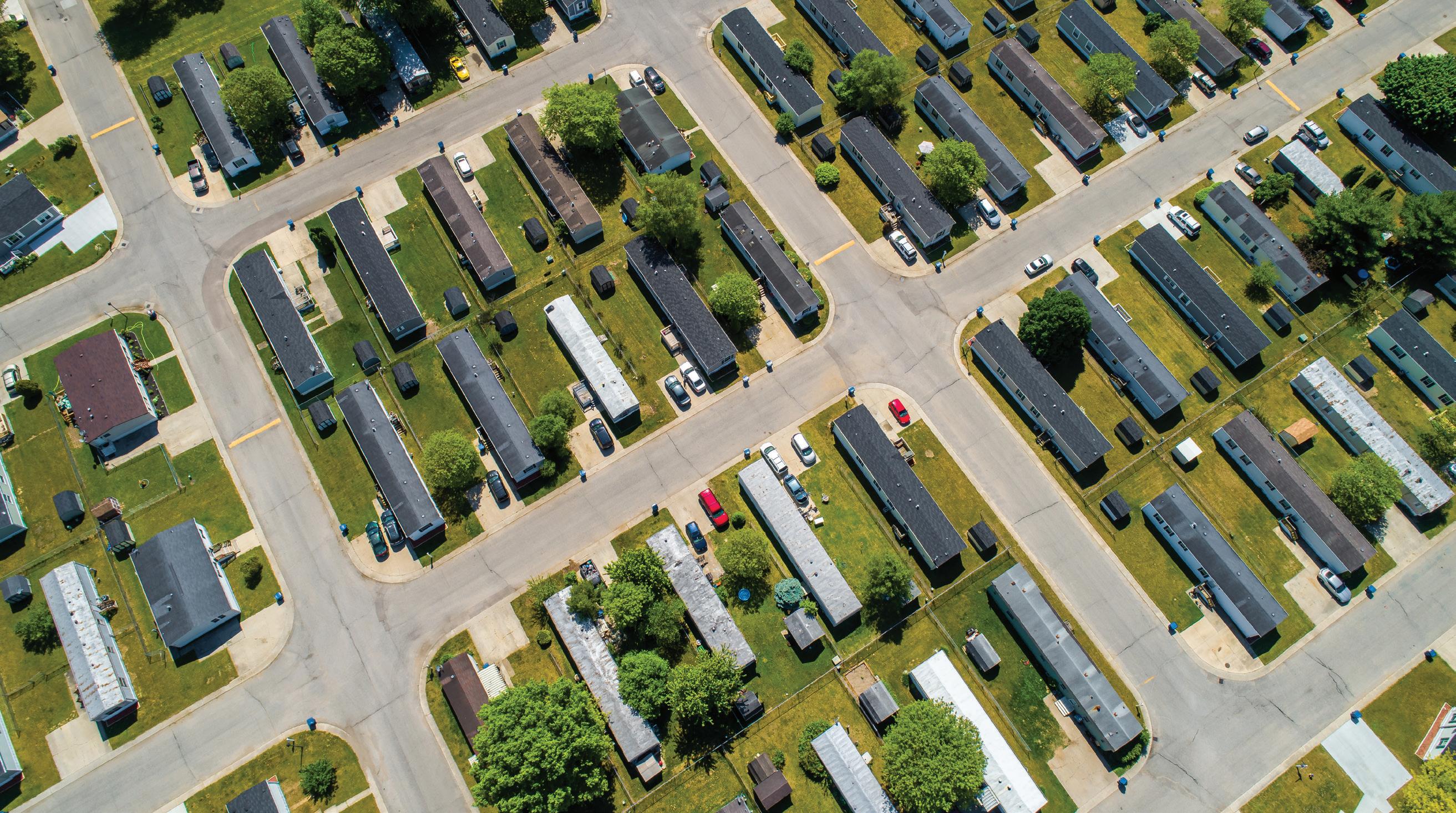
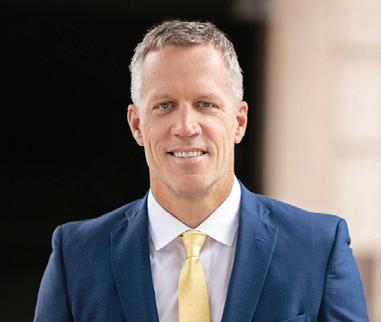

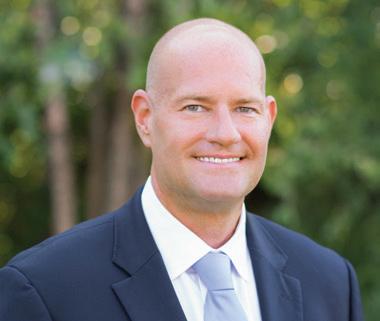
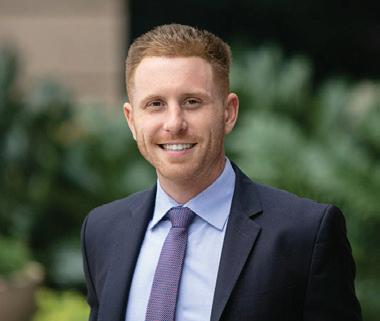

Your Partner for Value and Profitability. CapstoneMH.com KEVAN ENGER Managing Partner direct: 407.494.8541 office: 800.261.9464 ext. 7004 kevan@capstone-companies.com IAN HILPL Partner direct: 315.406.0900 office: 800.261.9464 ext. 7008 ian@capstone-companies.com BRIAN HUMMELL Director direct: 614.318.5482 office: 800.261.9464 ext. 7011 hummell@capstone-companies.com HUNTER LAROCCA Senior Advisor direct: 407.227.9643 office: 800.261.9464 ext. 7012 hunter@capstone-companies.com JON WILSMAN Investment Sales Advisor direct: 386.871.4716 office: 800.261.9464 ext. 7024 jwilsman@capstone-companies.com OUR TEAM OF EXPERTS CAPSTONE MANUFACTURED HOUSING Nationwide leader in multi-housing investment sales. UNDER CONTRACT $977M TRANSACTION VOLUME 2022 CLOSINGS 5,742 SITES 51 COMMUNITIES $405M TRANSACTION VOLUME
WHEN TO CLOSE A COMMUNITY
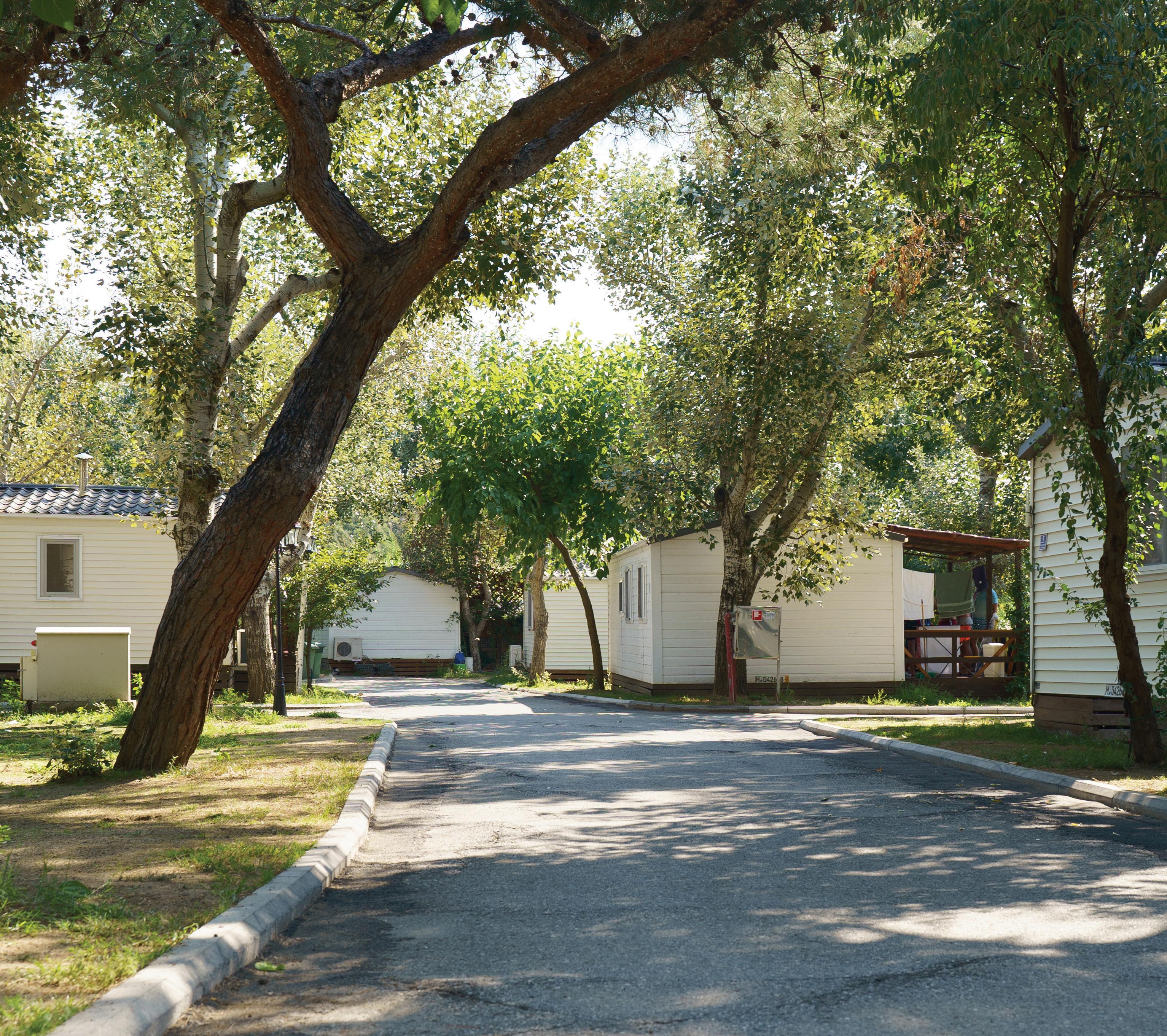
Tough Decisions When Infrastructure Ages
by Steven Blank
LAND USE
One of the big selling points behind the boom of manufactured housing community sales since the early 2000s has been that more communities have closed than are being built, creating a dwindling supply.
Some community closures are a result of repurposing for a higher and better land use in regard to per-acre monetary value increase. Another reason could be a deteriorating community infrastructure, mixed with low occupancy and/or other factors that lowers the value of the community.
As an industry, we like to say that community closures are a bad thing, but is this always the case?
Investors are drawn to MHC deals for the potential return, coupled with factors such as strength of market, occupancy, and ability to operate. The piece of the equation that often is overlooked is the community infrastructure, mainly the water, sewer, and electric.
As a third-party community operator of over 12,000 units, our company assists investors with due diligence for potential acquisitions. Our job in assisting community acquisitions is not only to point out the opportunities, but more importantly, identify the issues. Once the issues and potential deal breaking pitfalls have been monetized, the investor can make a more educated decision on the validity of the purchase and possibilities of success.
A Bit of Background on Manufactured Home Communities

For the past 15 plus years manufactured housing communities have received a lot of institutional attention, but a large percentage of communities were not built to institutional standards. They were built in the 1950s and 1960s and often the route was the most cost-efficient approach when constructing the infrastructure. What this means is, even though you can fill empty sites with new homes, or that the cash flow might be good on day one, the community could actually be beyond its planned useful life.
The most common infrastructure issue in communities is water leaks. Most of the time you can quantify the extent of leaking mains and service leads with simple math. The common practice would be to obtain the actual usage from the community’s main meter for a set period, divide it by the number »
MHINSIDER.COM | 49
of occupied sites and again by the days covered by the same master meter period (depending on the meter you sometimes need to convert the usage to gallons). You now have your usage per day per occupied site. Health departments typically want to make sure that a community can provide 200 gallons per day to each homesite based on full occupancy. The reality is that actual usage should be closer to 100 GPD. If you are grossly exceeding the norm than you must assume you have infrastructure leaks.
The easy statement is — “Well, just fix the leaks.” The reality is more complicated.
The Consequences of Dated Infrastructure
Often, water leaks are caused by faulty mains and service leads that have exceeded their useful life. So, even if you do pinpoint and fix a leak, other leaks may occur. Worse than that is if you don’t shut the mains down properly or make the mistake of opening gate valves too aggressively, you can again cause more leaks. We see communities that have usage as high as 500 GPD per homesite, which equates to tens of thousands of dollars per month in expenses and a lot of wasted resources. Water lines can be replaced, but the cost is dependent on the size of the community, and the scope of work, among other factors. These projects easily exceed $100,000. If you have a community that was purchased at today’s high cap rates, it is very possible that the cost of new water lines will result in insolvency, at worst, or an investment that will take years to get back to even.
Let’s take an example of a community in Indiana that we recently evaluated. Going in, the capitalization rate was solid, giving the investors a strong projected first-year return, coupled with the ability to add additional revenue through filling vacant sites in a good market.
Everything looked good until we put a camera in the sewer lines and saw that this community, built in 1955, had sewer mains constructed with Orangeburg pipe. Orangeburg pipe is made of ground wood pulp bound together by coal tar pitch. Orangeburg pipe has a typical lifespan of 50 years and then begins to deteriorate. The cost to replace the sewer mains would be hundreds of thousands of dollars and given the small size of the community, the property would not
be able to handle that large of a capital investment. Our client passed on the deal, but that community eventually will need to face the reality that the sewer infrastructure will fail unless tremendous capital improvements are made.
Community Owned Utilities
The above examples assume being connected to municipal utilities, but communities often have private water and sewer systems. The cost of a new wastewater treatment plant can easily exceed $1 million and if the plant was built in the 1950s, 60s, or 70s there is a chance it is nearing the end of its useful life. If a wastewater treatment plant fails in a small community, can it withstand a million dollar capital improvement?
Added risks are that new standards for discharge may no longer tolerate the chemical levels produced, even by a new system.
In addition to staying on top of the mechanical infrastructure, new testing standards for organics, like arsenic, can call for the installation of a filtration system, which easily can exceed $1 million.
Yes, these nightmares do occur.
It is extremely difficult in 2023 to economically construct a new manufactured home community, especially for smaller organizations. Even if you are successful in obtaining the zoning, only a few areas of the country have strong enough markets to provide the absorption necessary to make the investment worthwhile. This, among other factors, contribute to investors looking the other way at infrastructure issues in existing communities. Don’t let this happen with your investment dollars.
Not all communities are built equally, and investors need to remember the golden rule — In our case, the land is our asset, not the home. New homes can be brought in a lot easier than new infrastructure. MHV
Steven Blank is the president of Blank Family Communities, a third-party management group in the Midwest, with 10 years of MH owner/operator experience and membership in the MMHA.

50 | MAY / JUNE 2023 EDITION
LAND USE
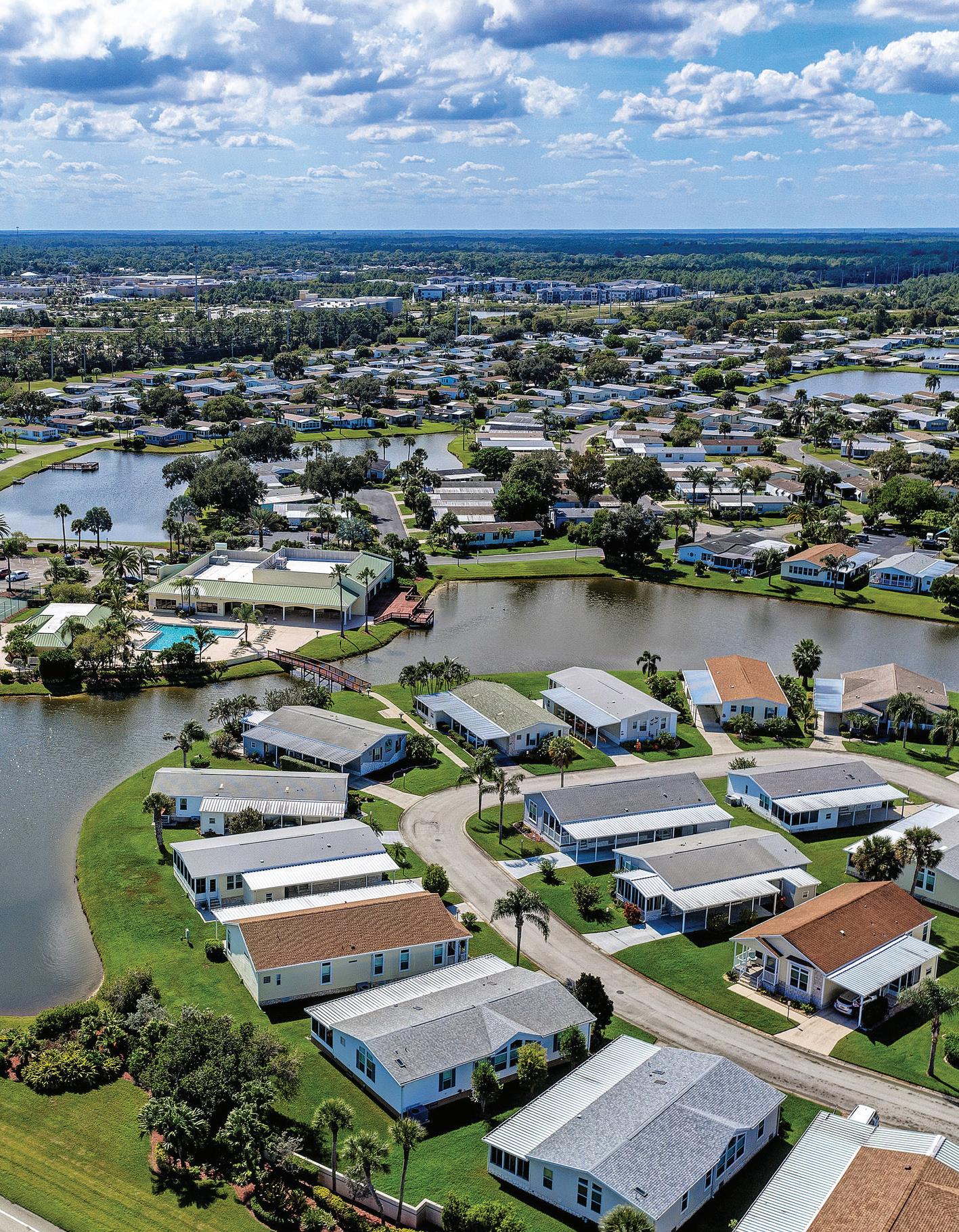
The only software built specifically for manufactured housing. 800.747.0259 . ManageAmerica.com 20+ Years of Experience Handling All Aspects of the Resident Life Cycle Everything from Resident Screening to Utility Billing & Electronic Payment Solutions Learn More New look, same company, and still...
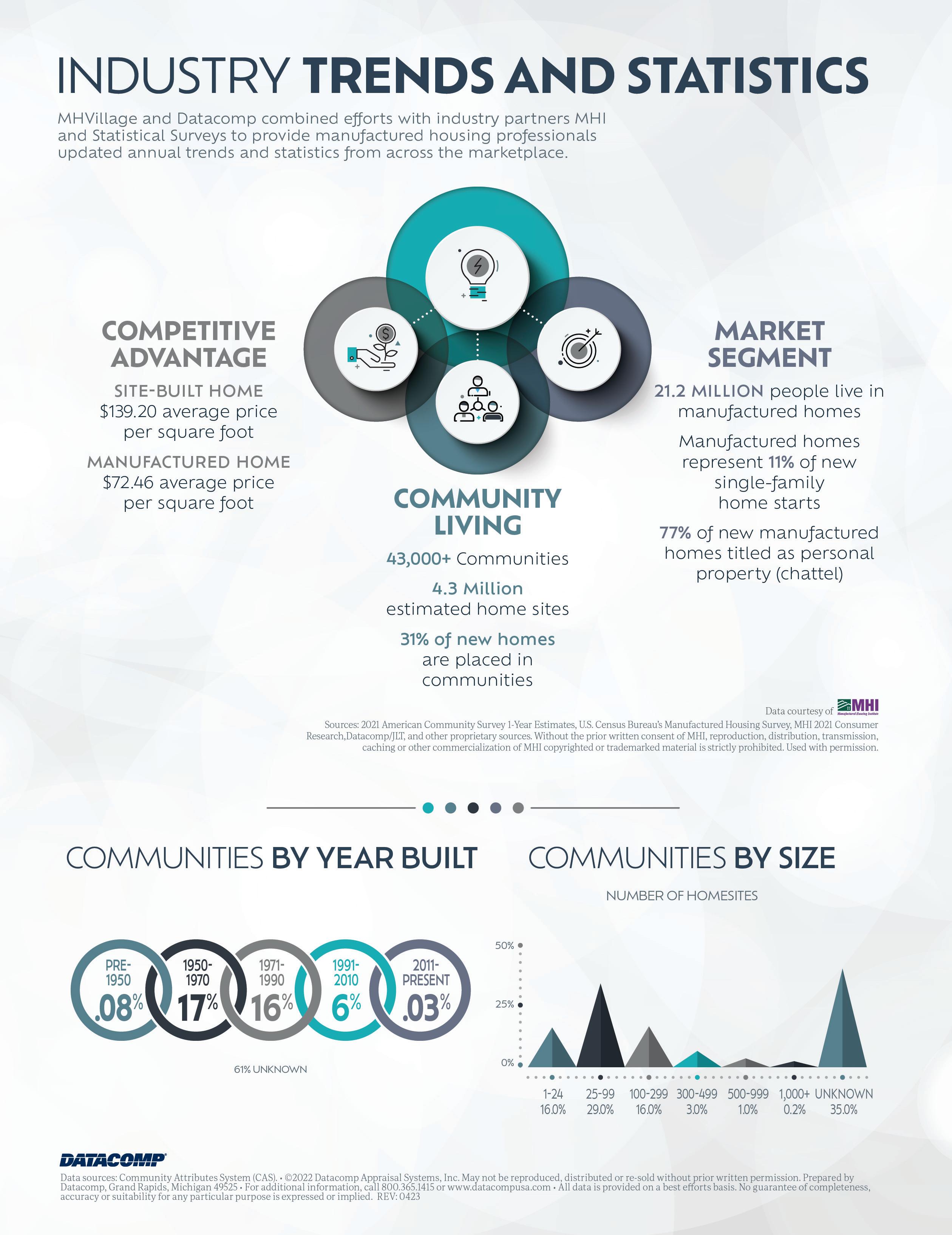
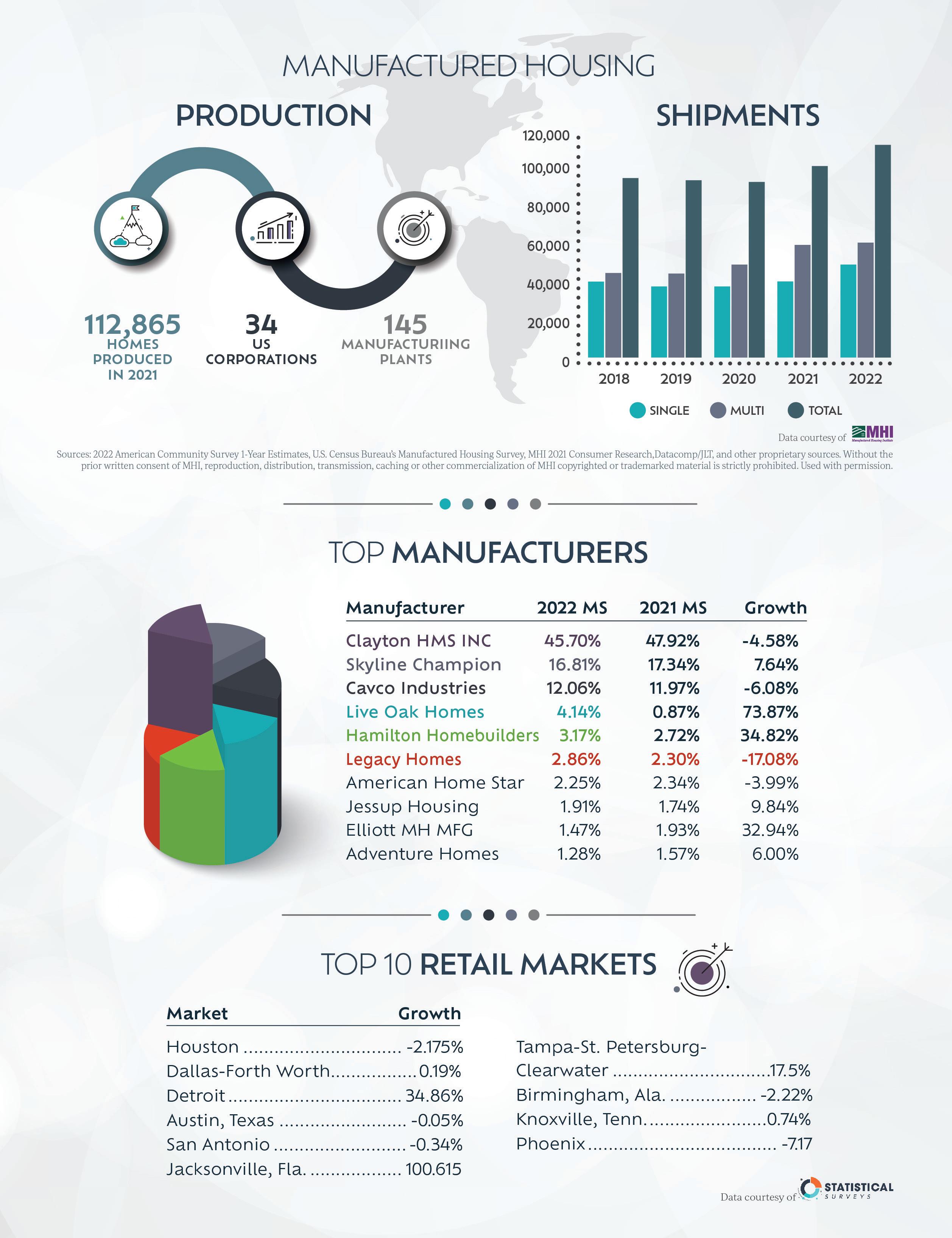
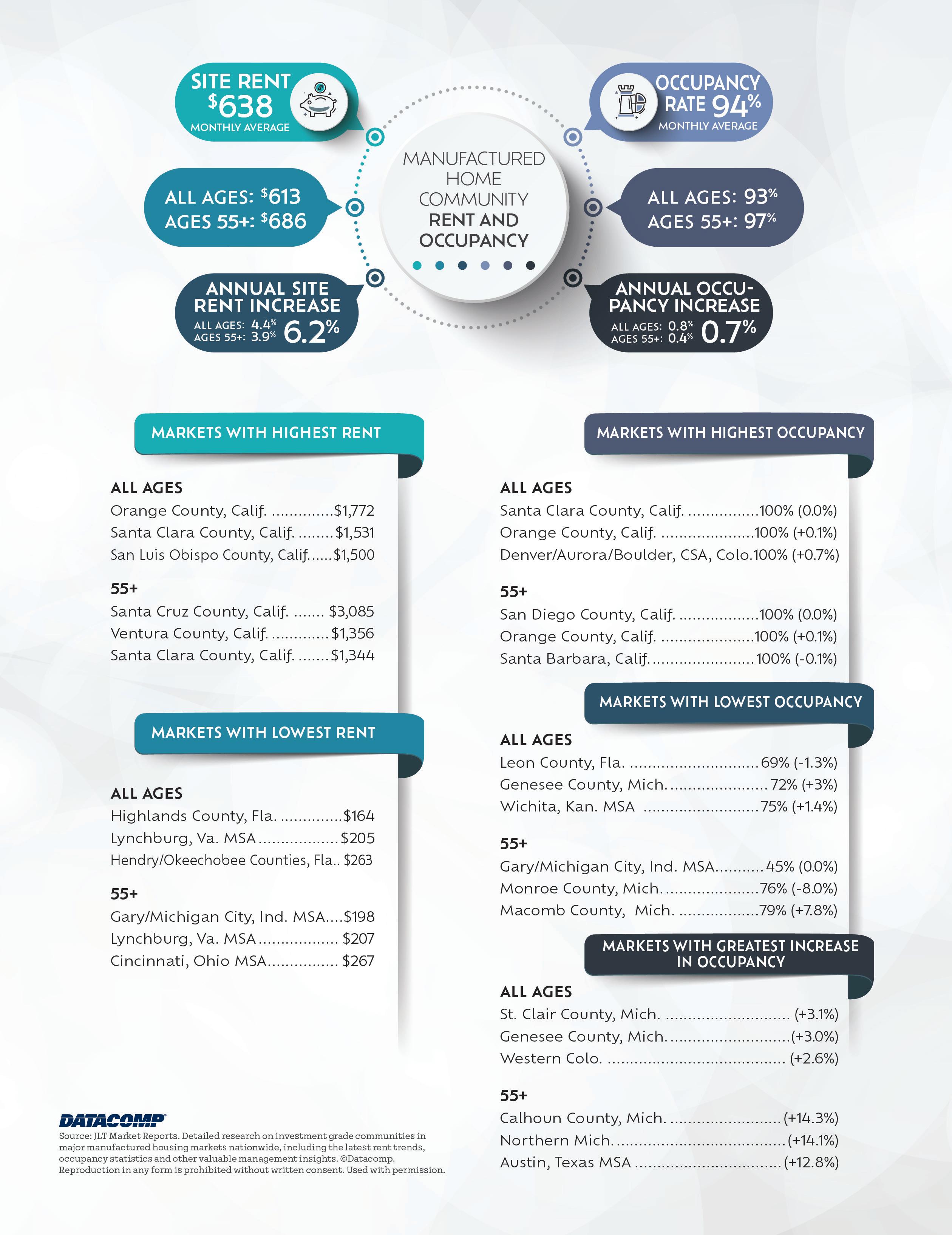
54 | MAY / JUNE 2023 EDITION INDUSTRY TRENDS
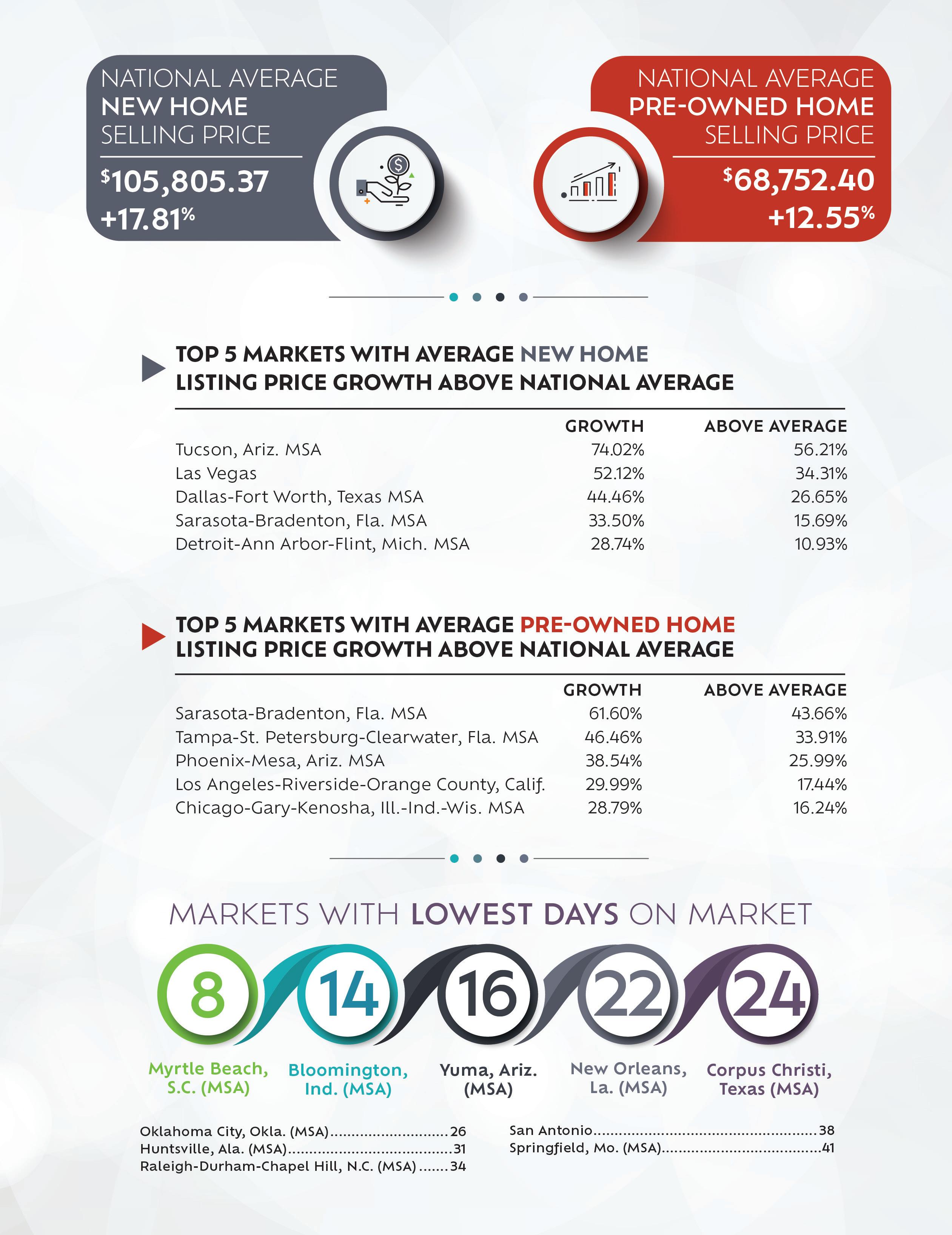
MHINSIDER.COM | 55

This document is for information purposes only and we reserve the right to change any part of this policy without notice. This document is not for consumer use. This is not an advertisement to extend consumer credit as defined by Regulation Z. NMLS #2280 OUR SERVICES RETAIL PROGRAMS Designed to help you sell more homes! Our new consumer and retailer lending tools will make selling homes a breeze! FLOOR PLAN C.A.S.H. PROGRAM Tailored to your specific floor plan needs! Our Communities A ordable Spec Home Program is a winning vacant lot solution for the customer and the community owner. Consumer lending programs for applicants of all credit scores New online credit application that is FASTER. SMARTER. SIMPLER. Customer’s are receiving their decision faster than ever... often in as little as 5-10 minutes! No “due-in-full” date... EVER! No curtailments for 12 months CONTACT US TODAY! 866-709-6989 sales@21stmortgage.com www.21stmortgage.com CONTACT US TODAY! 844-343-9383 prospect@21stmortgage.com We provide capital to purchase new homes including setup expenses. No money out of pocket - no payments for 12 months. A ordable consumer financing for new or used homes is available for all credit scores on homes you own in your community. Want to learn more about our C.A.S.H. Program? Visit our website... www.21stcommunitylending.com 21st Mortgage Corporation | 620 Market Street, Suite 100 | Knoxville, TN 37902 Long term rental home financing available to community owners to rent homes to tenants.

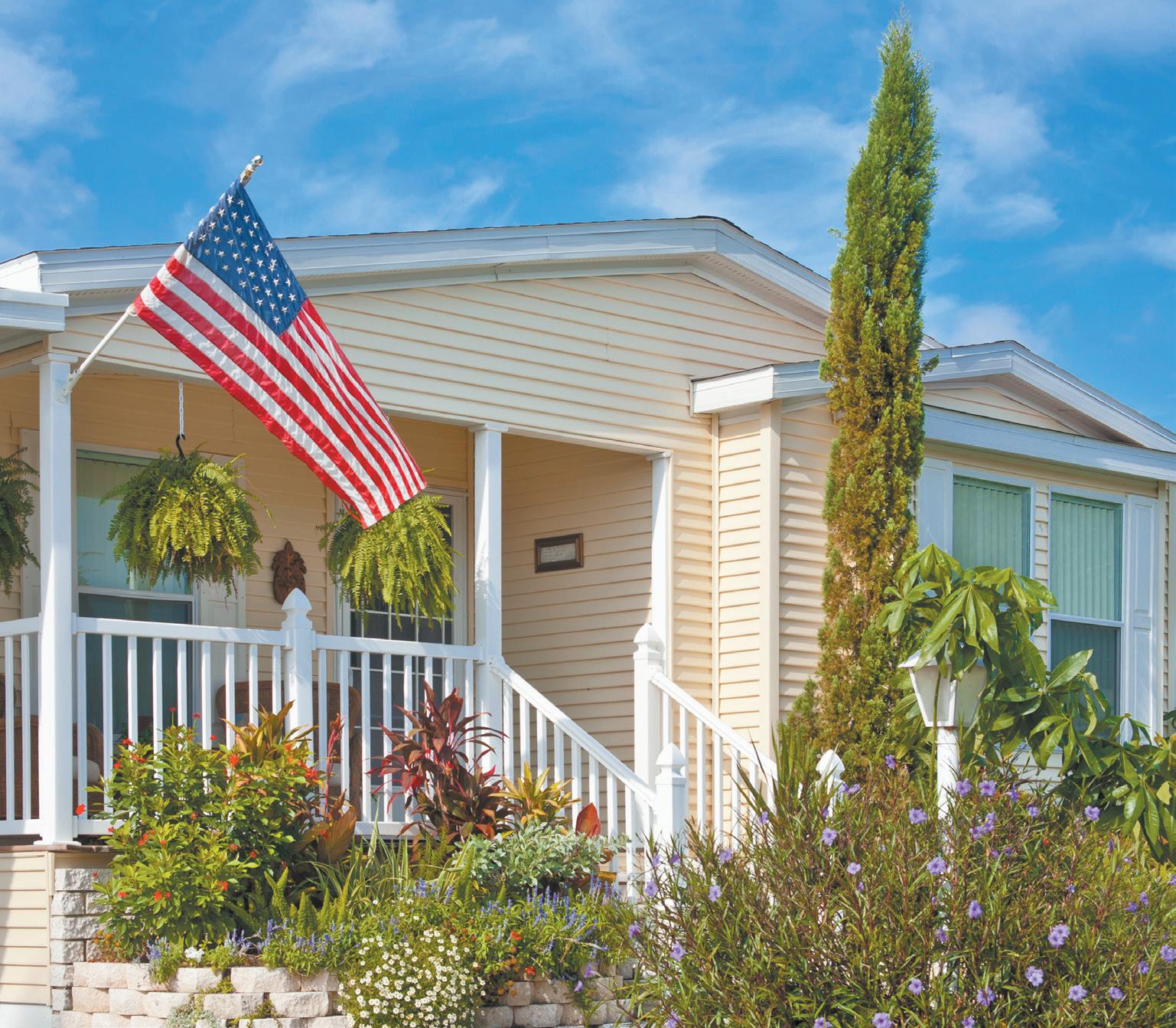
FAST ACCURATE RELIABLE Nationwide, Market-Based Home Valuation & Inspections. www.datacompusa.com
HOME SALES HEAT MAP
STATE-BY-STATE
HOMES SOLD • 2022 0 500 1,000 3,000 7,000 11,000 58 | MAY / JUNE 2023 EDITION
CA FL MI AZ TX
Sales (in Millions) $300 $200 $100 $0
form
of: MHINSIDER.COM | 59
Average
Source: Based on new and pre-owned manufactured homes listed on MHVillage.com from April 2022 to May 2023. ©MHVillage. Reproduction in any
is prohibited without written consent. Used with permission. Data Courtesy
MHINSIDER MARKETPLACE OVERVIEW:
A Summary of Publicly Traded Companies in the Manufactured Housing Industry
Industry Snapshot on MH REITs, Builders, and Supply
A New Marketplace Feature from MHInsider
For MHInsider’s State of the Industry edition, we provide readers with a summary overview of publicly traded companies in manufactured housing, including the real estate investment trusts. To best track market trends and analysis, bookmark MHInsider. com and subscribe to our bi-weekly newsletter. MHInsider makes every effort to provide meaningful features and trend stories in the magazine, but for breaking news on the economy and markets the MHInsider blog is the place to be. (All information is updated as of April 11, 2023)
Cavco Industries — (CVCO)
Phoenix.
Company description: Cavco Industries, Inc. is a company that specializes in the design, production, and sale of manufactured homes, primarily within the United States. The company operates through two main segments, namely the Factory-Built Housing and Financial Services segments. Its manufactured homes are sold under various brands, including Cavco, Fleetwood, Palm Harbor, Nationwide, Fairmont, Friendship, Chariot Eagle, Destiny, Commodore,
Colony, Pennwest, R-Anell, Manorwood, and MidCountry. In addition to its core business of manufacturing homes, Cavco also builds park model RVs, vacation cabins, and various types of factory-built commercial structures such as apartment buildings, condominiums, hotels, workforce housing, schools, and housing for the United States military troops.
Trades on the New York Stock Exchange

Stock Price: $287.00
Estimated One-Year Earnings Growth: -13.4%
60 | MAY / JUNE 2023 EDITION
INDUSTRY TRENDS
Equity LifeStyle Properties — (ELS) Chicago

Company description: Headquartered in Chicago, ELS is a self-managed and self-administered real estate investment trust (REIT). Currently, the company owns or holds an interest in more than 420 high-quality properties across 33 states and British Columbia. These properties comprise better than 161,200 homesites.
Trades on the New York Stock Exchange
Stock Price: $66.91
Estimated One-Year Earnings Growth: 8.7%
Flagship Communities — (MHCUS)
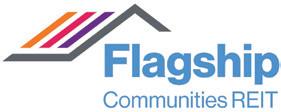
Northern Kentucky
Company description: Flagship Communities Real Estate Investment Trust is a recently established, internally-managed, open-ended real estate investment trust that operates under the laws of the Province of Ontario via a declaration of trust. The REIT has been created with the purpose of owning and managing a selection of income-generating manufactured housing communities, which are situated in Kentucky, Indiana, Ohio, and Tennessee. Additionally, the REIT owns a fleet of manufactured homes that are available for lease to residents of these housing communities.
Trades on the Toronto Stock Exchange
Stock Price: $17.63
Estimated One-Year Earnings Growth: N/A
Legacy Housing — (LEGH)
Bedford, Texas
Company description: Legacy Housing Corporation is a company that focuses on the construction, sale, and financing of manufactured homes and tiny houses primarily in the southern region of the United States. The company is involved in the manufacturing and transportation of mobile homes, as well as providing wholesale financing to dealers and mobile home parks, and retail financing options to consumers. In addition to this, Legacy Housing Corporation offers floor plan financing for independent retailers, consumer financing for its products, and financing to manufactured housing community owners who purchase its products for use in their rental housing communities.

Trades on the New York Stock Exchange
Price: $22.22
Estimated One-Year Earnings Growth: 1.9%
Patrick Industries — (PATK)
Elkhart, Ind.
Company description: Patrick Industries, Inc. is a company that specializes in the manufacturing and distribution of components, building products, and materials to the recreational vehicle, marine, manufactured housing, and industrial markets across the United States, Mexico, China, and Canada. The company’s Manufacturing segment is responsible for creating and selling various laminated products, including furniture, shelving, wall, countertop, and cabinet products, as well as cabinet doors, fiberglass bath fixtures, and tile systems. Additionally, the segment produces hardwood furniture, vinyl printing, amplifiers, tower speakers, soundbars, and subwoofers. The company is also involved in solid surface, granite, and quartz countertop fabrication, aluminum products, fiberglass, plastic components and more.
Trades on NASDAQ Stock Price: $68.90
Estimated One-Year Earnings Growth: 18%
Skyline-Champion Corporation — (SKY)

Troy, Mich.
Company description: Skyline Champion Corporation is a North American company that specializes in producing and selling factory-built housing. The company provides a range of manufactured and modular homes, park model RVs, accessory dwelling units, and modular buildings that cater to both the multi-family and hospitality sectors. The homes are constructed under a variety of brand names, including Skyline Homes, Champion Home Builders, Genesis Homes, Athens Park Models, Dutch Housing, Atlantic Homes, Excel Homes, Homes of Merit, New Era, Redman Homes, ScotBilt Homes, Shore Park, Silvercrest, and Titan Homes in the United States, as well as Moduline and SRI Homes in western Canada.
Trades on the New York Stock Exchange Stock Price: $69.79
Estimated One-Year Earnings Growth: -40.3%
MHINSIDER.COM | 61
Sun Communities — (SUI) Dearborn, Mich.

Company Description: Sun Communities, Inc. is a Real Estate Investment Trust (REIT) that has ownership, operational control, or interest in a portfolio of more than 600 developed properties, which include manufactured housing (MH), recreational vehicle (RV), and marina properties. The portfolio is comprised of nearly 159,300 developed sites and over 45,700 wet slips and dry storage spaces that span across 39 states, Canada, Puerto Rico, and the UK.
Trades on the New York Stock Exchange
Stock Price: $141.80
Estimated One-Year Earnings Growth: 10.1%
UMH Properties — (UMH) Freehold, N.J.
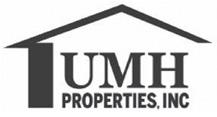
Company description: UMH Properties, Inc. is a publicly traded equity Real Estate Investment Trust (REIT) that has been in operation since 1968. The company owns and operates more than 120 manufactured home communities that collectively contain approximately 23,400 developed homesites. These communities are situated in New Jersey, New York, Ohio, Pennsylvania, Tennessee, Indiana, Michigan, and Maryland. Additionally, the company is expanding through a joint venture with interests in Florida and moving west. UMH also has a portfolio of REIT securities.
Trades on the New York Stock Exchange
Stock Price: $15.18
Estimated One-Year Earnings Growth: 128.6%
62 | MAY / JUNE 2023 EDITION
INDUSTRY TRENDS 518-725-5000 info@firstcreditcorp.com | www.firstcreditcorp.com MH Lending You Can Trust Since 1985 Manufactured Home Lending in Land-Leased Communities Please contact us to learn about: • Offering the Industry’s Lowest Interest Rates
Fast and Easy Closings
Most Credit Decisions in One Business Day
•
•
MANUFACTURED HOUSING & RV GROUP
Maximize Your Park Value the market is seeing record breaking prices for manufactured home properties and RV resorts as well as never- before seen deal velocity. We will help you maximize in the current market.
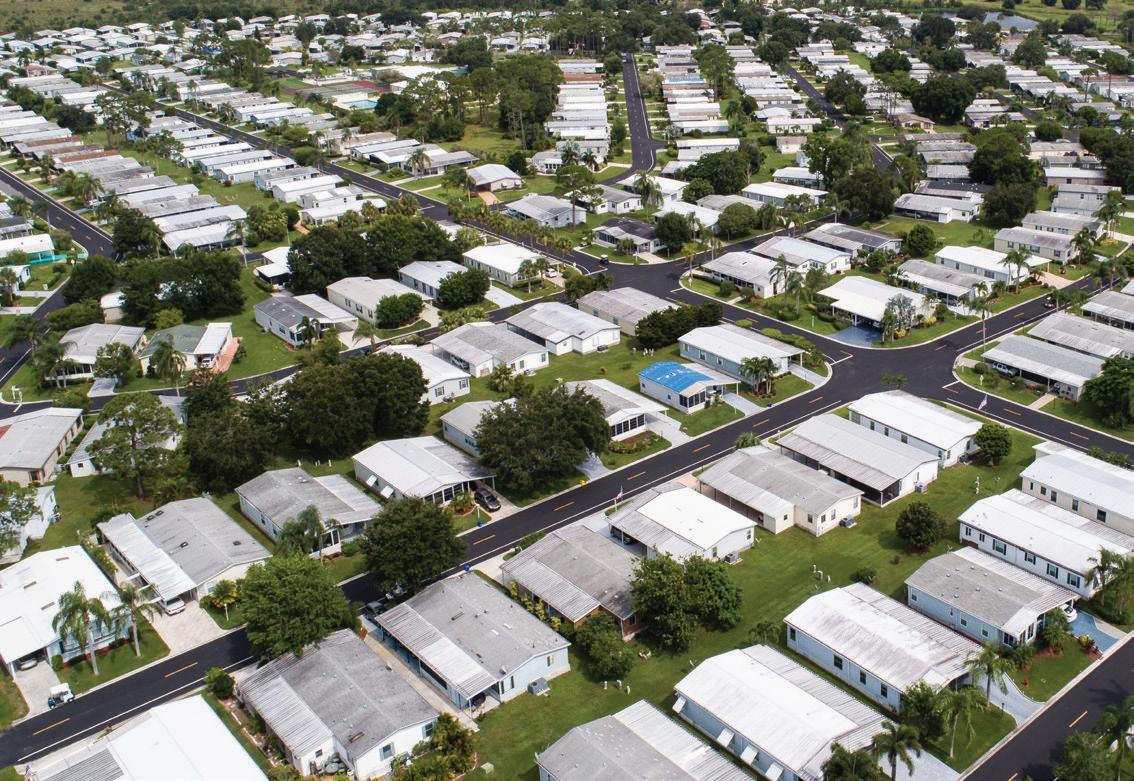
+1
The MHRV Team is a culmination of the most established and respected experts in the Industry. Most notably, Mike Nissley and Bruce Nell who have been in the MHRV space for decades. Mike is considered one of the top brokers in the space and has assisted in closing more than $100B in transactions.
Bruce Nell is a best in class appraiser in the asset class given his penetration into the market early on and as appraised more than $500B worth of assets with $80B+ specifically in the MHRV space.

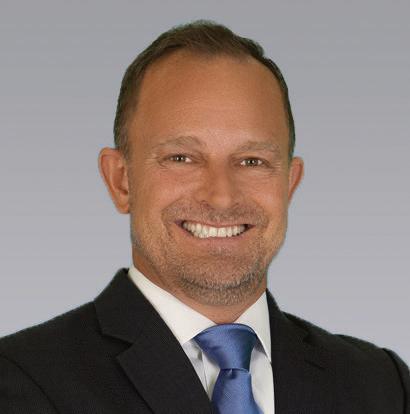
Both have established relationship spanning decades in the field and will bring a level of professionalism and incredible network that isn’t accessible by other firms.
This Senior-level team is supported by a strong roster of professionals that have been in Commercial Real Estate for 30+ years with institutional experience with banks and private equity groups. This ensures streamlined execution and best in class service to the team.
$80 Billion of MHRV Appraisals each year the Valuation & Advisory team appraises more than 1,500 manufactured home communities ranging from single to large multi-state portfolios.
50+ Years Experience specifically in the MHRV asset class and many of our team members are MH & RV Park owners and property managers themselves.
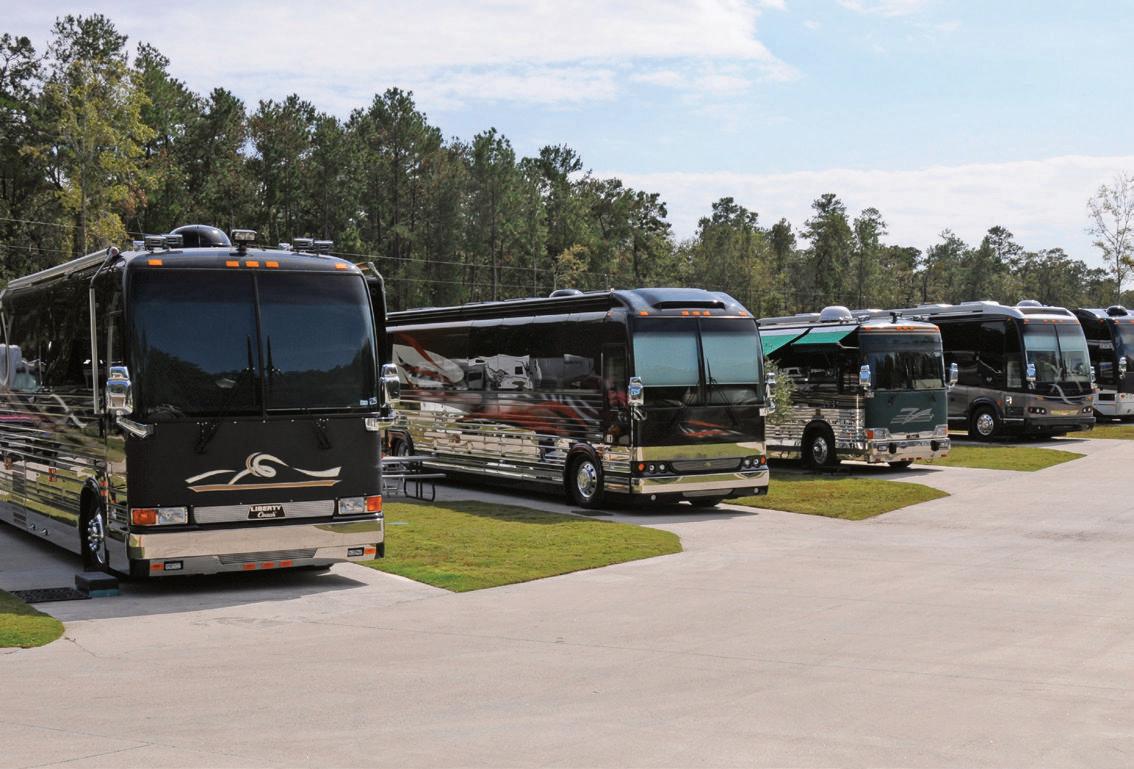
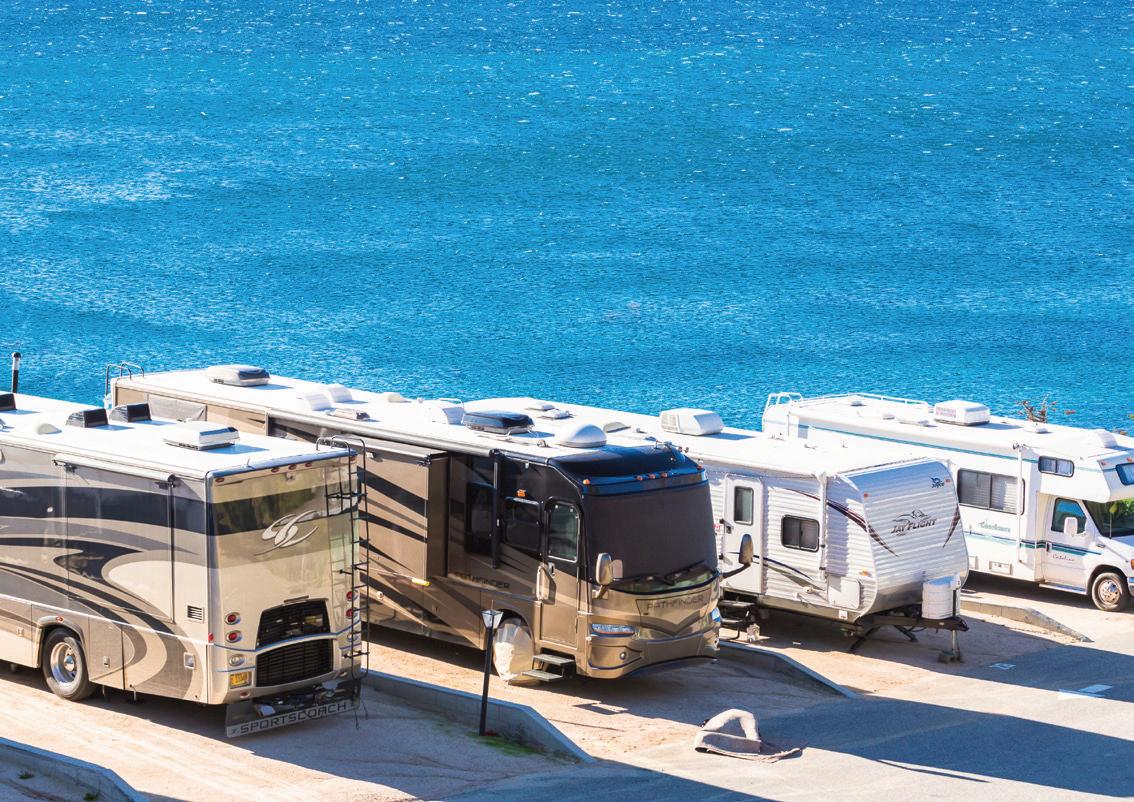
Off Market Opportunities we have a wealth of off market properties that are ideal opportunities for 1031 buyers to acquire.
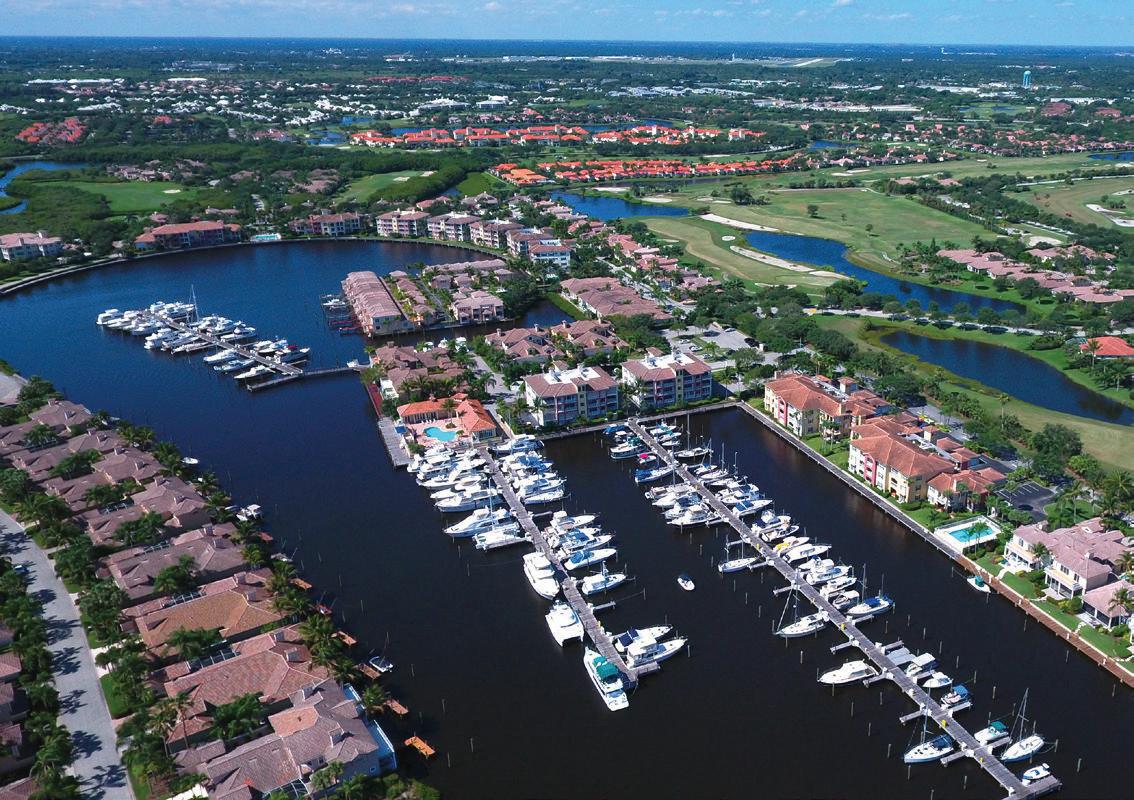
30+ Years of Institutional Experience with banks & private equity groups.
Accelerating success.
561 479 1588 mike.nissley@colliers.com
Michael J. Nissley National MHRV Director +1 614 437 4687 bruce.nell@colliers.com
Bruce Nell, MAI, MRICS, AI-GRS Valuation & Advisory
Capstone MH Regional Expense Comparison








































































































































































































































































Capstone MH, a leading U.S. broker of manufactured home communities, conducted a survey of 2022 operating expenses and reported them by region. MHInsider prepared a summary of the findings, with a focus on total operating expenses per unit by region. The full report with expanded data sets


































































on 435 communities and 52,090 homesites can be found at www.capstonemh.com. The summary, and full report, should be viewed as a tool to evaluate the market and is in no way intended to be a replacement for thorough due diligence.































INDUSTRY TRENDS
Repairs&MaintenanceContractorServicesGeneral&AdminMarketingSalaries&PayrollManagementFeeInsuranceUtilities UtilityPlantOperationRealEstateTaxes $600 $450 $300 $150 $0 Midwest Region Total Operating Expenses Per Unit Repairs&MaintenanceContractorServicesGeneral&AdminMarketingSalaries&PayrollManagementFeeInsuranceUtilities UtilityPlantOperationRealEstateTaxes $600 $450 $300 $150 $0 Southeast Region Total Operating Expenses Per Unit Southwest Region Total Operating Expenses Per Unit Repairs&MaintenanceContractorServicesGeneral&AdminMarketingSalaries&PayrollManagementFeeInsuranceUtilities UtilityPlantOperationRealEstateTaxes $600 $450 $300 $150 $0 Northeast Region Total Operating Expenses Per Unit 64 | MAY / JUNE 2023 EDITION







































































































































































































MHINSIDER.COM | 65 West Region Total Operating Expenses Per Unit Repairs&MaintenanceContractorServicesGeneral&AdminMarketingSalaries&PayrollManagementFeeInsuranceUtilities UtilityPlantOperationRealEstateTaxes $1,200 $1,050 $900 $750 $600 $450 $300 $150 $0 Repairs&Maintenance
General&AdminMarketing
Utilities UtilityPlantOperationRealEstateTaxes $600 $450 $300 $150 $0 Midwest Region Total Operating Expenses Per Unit Repairs&MaintenanceContractorServicesGeneral&AdminMarketingSalaries&PayrollManagementFeeInsuranceUtilities UtilityPlantOperationRealEstateTaxes $600 $450 $300 $150 $0 Southeast Region Total Operating Expenses Per Unit Repairs&MaintenanceContractorServicesGeneral&AdminMarketing
Utilities UtilityPlantOperationRealEstateTaxes $750 $600 $450 $300 $150 $0 Southwest Region Total Operating Expenses Per Unit Repairs&Maintenance
$0
ContractorServices
Salaries&PayrollManagementFeeInsurance
Salaries&PayrollManagementFeeInsurance
ContractorServicesGeneral&AdminMarketingSalaries&PayrollManagementFeeInsuranceUtilities UtilityPlantOperationRealEstateTaxes
We are excited to announce the release of our 17th annual Manufactured Home Community Financing Handbook and Market Update. What started as a niche sector has quickly grown over the years into the tremendous industry we are proud to be a part of today.
To learn more and download your copy, visit wellsfargo.com/mhc
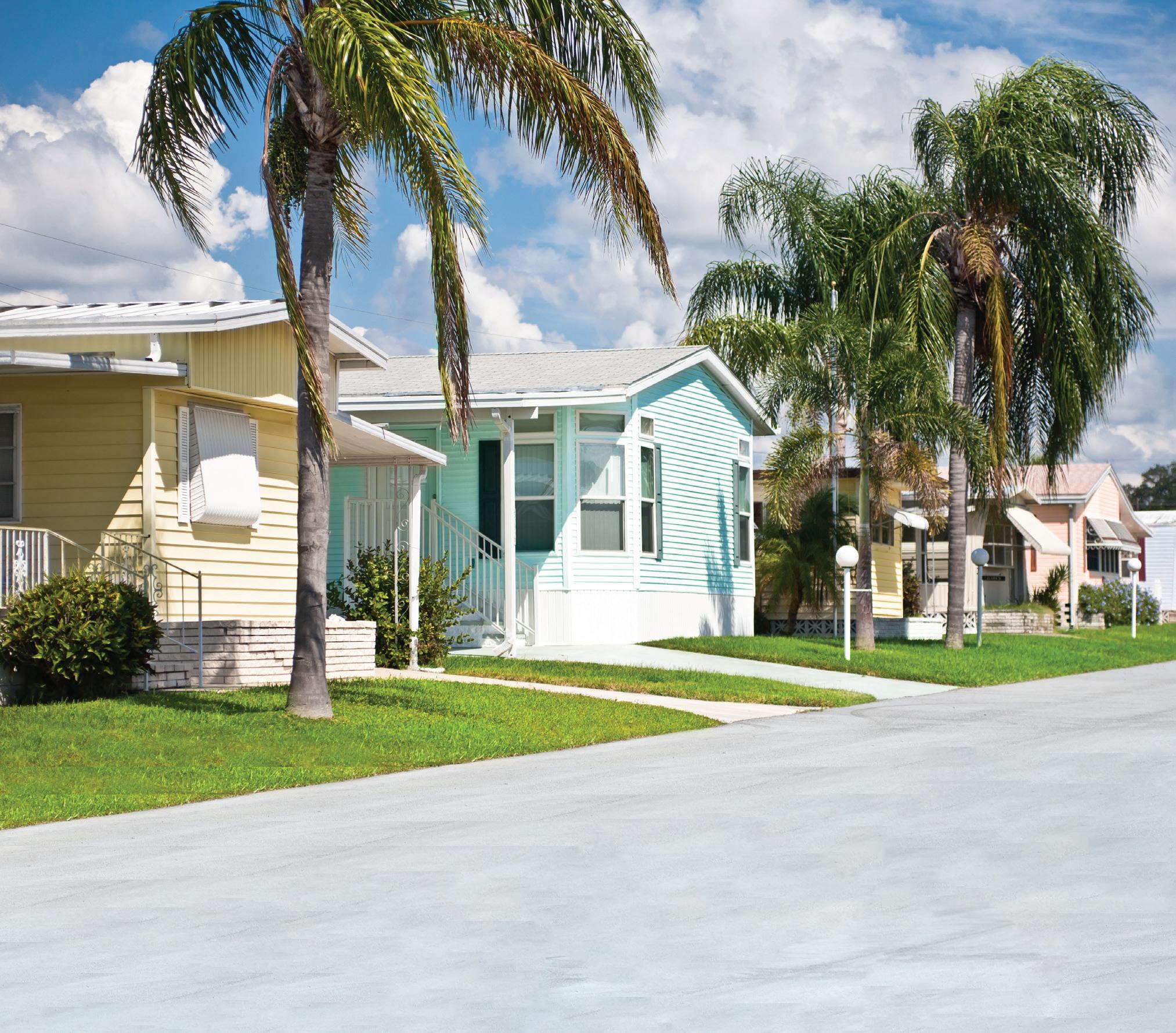
Home Communities
Wells Fargo Commercial Real Estate Manufactured
© 2023 Wells Fargo Bank, N.A. All rights reserved. Member FDIC. PDS-3857579
Petosa
Tony
760-505-9001
Bertino
17th annual Manufactured Home Community Financing Handbook and Market Update
tpetosa@wellsfargo.com Nick
858-336-0782 nick.bertino@wellsfargo.com
Zippy Streaks Full Circle from Finance, Through Community Ownership, Into FinTech
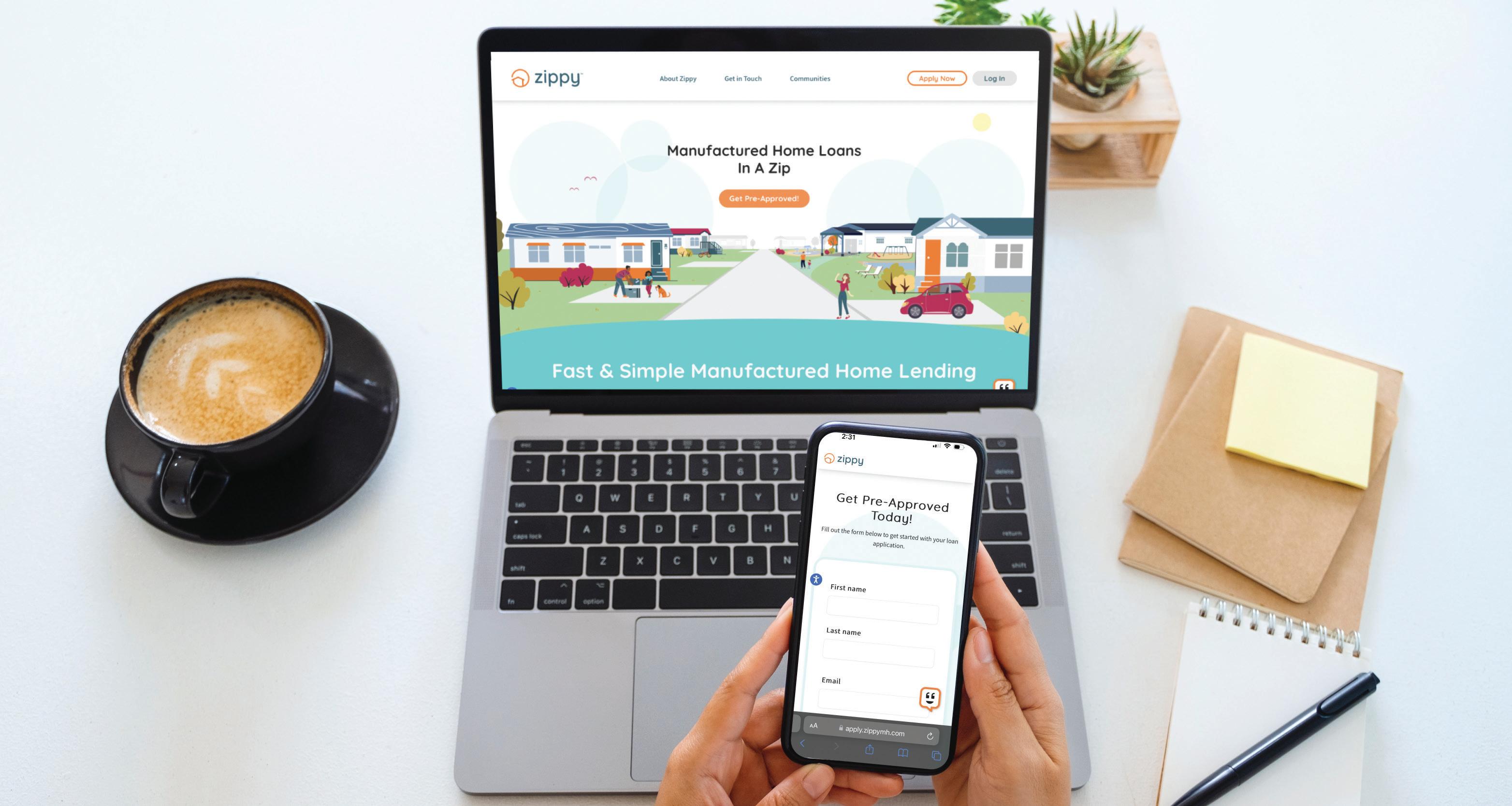 by Patrick Revere
by Patrick Revere
After working together for years in finance with an industry giant and getting their feet wet turning around a manufactured home community they acquired together, Ben Halliday and Jordan Bucy decided to blend their banking and real estate experience to start Zippy, a new community-focused chattel lender.
A Journey Started in Community Development
It took some time to find the right entry point. Initially, the two looked at a lot of deals they found interesting, but often didn’t pencil. Eventually the pair landed on a value-add community in Lubbock, Texas, though not without some hesitation.
Turns out the hesitation, at this point long passed, was somewhat founded.
“The community we bought was pretty run down, 20 years of deferred maintenance. The sewer and water were bad, half the sites had no water and only a dozen of the homes of the 91 sites were actually viable homes,” Zippy CEO Ben Halliday said. “We spent our nights and weekends there for three years. We focused on property management during the week and then on the weekend we’d go on-site and get to work on redevelopment.”
“We’d stay at the community on the weekends, sleeping in one of the available houses for sale at the time, digging sewer lines and rehabbing homes. It was hard »
MHINSIDER.COM | 67 TECHNOLOGY
work, but it was even more rewarding,” Zippy COO and President Jordan Bucy said.
The pair eventually replaced the old infrastructure, landscaped and installed new amenities including a playground, dog park, and party pavilion. During this time, Halliday and Bucy brought in and sold new homes to fill up the original development. Beyond the joy in seeing new homeowners relish in their upgraded community, one of the proudest moments was when the City of Lubbock visited during a rezoning initiative to add 32 lots on adjacent land.
“Several council members and planning officials visited our community to inspect the progress, as part of their diligence,” Halliday said. “We were so proud to host them and thankful we ultimately got approval to add to our growing community. The mayor gave us a nod and thanked us ‘for bringing affordable housing to Lubbock’. That was immensely appreciated.”
They built a digital sales process using available technology selling a handful of homes a month, mainly as a result of social ads and the community’s website.
“It worked great, but it all broke down during financing,” Halliday said. “We wanted a process that was more modern, friendly and fast for us and the homebuyer. But it was 2017, and there were few options for community operators to offer customers a digital home buying experience.”
You see the value of the well-built, modern, good-looking homes. And as we’re putting new homes in we’re also adding amenities. It feels really good,” he said. “You put in a playground and come back and see the kids playing at the playground, how can that not feel good?
– Jordan Bucy
The Next Journey
It took a few years of trial and error, but Bucy and Halliday finished their project at The Lone Star community and began to contemplate what was next for them.
“Maybe our background as bankers led us here, or our continued obsession with the home buying experience — probably both — but we couldn’t get over the finance experience and the lack of tools and technology available,” Halliday said.
Reflection on a Problem and Developing a Tech-Driven Solution
As Halliday and Bucy worked in the community, they developed a passion for manufactured housing. They were proud of the neighborhood that formed over the years, and proud of the homes so many families called home. But one big challenge kept nagging them.
“Since we were five hours away during the work week, we took advantage of modern property management tools and took our homeowners online for payments and maintenance requests, and it was well-received — no more paper checks!” Bucy said. “That’s when we knew our industry was ready for digital.”
Faced with a decision between a planned new development, or a completely new venture in MH lending, the two landed on Zippy. Halliday admits the pair was more excited about developing a community from the ground up, but the Zippy co-founders kept discussing how they would hit their infill goals and deliver home ownership “the way it should be” and the financing experience always dominated the conversation.
Yet unnamed, the Zippy of their dreams would be a snappy, modern lending platform for today’s consumer, a web-based experience that is seamless and nearly immediate, backed by a team of industry veterans and experienced technologists.
“Let’s go fix this problem,” Halliday recalls saying to his now co-founder Bucy.
Bucy cemented the decision with what would be Zippy’s mantra, “Let’s do this.”
68 | MAY / JUNE 2023 EDITION
TECHNOLOGY
Great Tech + Amazing People = Happy Homeowners
So much of the industry was still paper-based at that time, and there was plenty of room for growth. When the pandemic hit, the housing sector went on a rocket ride and the fuel it needed was efficient finance technology.
“We wanted to create a digital front door for the homeownership journey for manufactured housing,” Bucy said. “This allows us to accept and work applications from anywhere in the world, 24-7. And that really opens things up.”
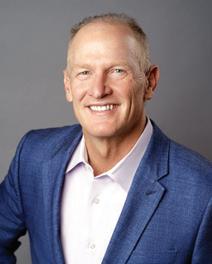
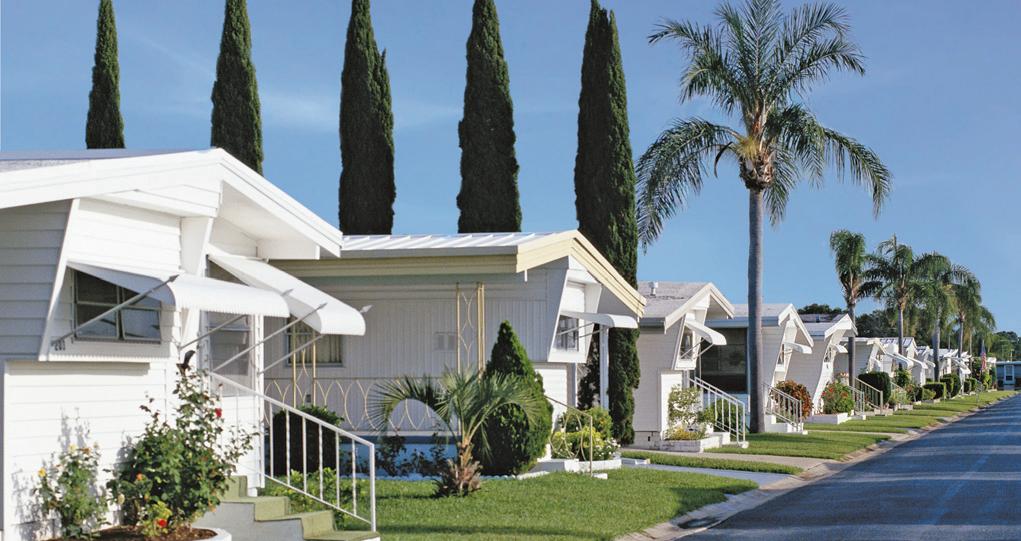
A top priority early on was the philosophy of partnering with a homebuyer in a way that delivers all the benefits of modern technology, paired with a dedicated home buying guide.
“We have a single person who works with the homebuyer all the way through the journey. We spent a lot of time envisioning and building a virtual close, where today our bilingual closers walk a buyer through their loan documents in a virtual closing room, ensuring they’re set up for success, from start to finish,” Bucy continued. “Of course, a hugely important stakeholder in MH ownership is the retailer. This part was the easiest to build, as we’d spent years dreaming up what we wish we had while selling homes.”
Zippy’s digital borrower portal keeps sellers updated on loan progress in real time, delivering new leads, loan status updates, document requests, closing updates, and digital marketing tools.
The Zippy Application Process

“The home buyer pulls out a smartphone and takes a photo of a QR code that pops up a form to gain residence at that specific community,” Halliday said. “It then lets us know there is someone who is interested in buying.”
The form has 10 fields. It is made to look simple from the user’s perspective, but contains a large amount of custom-built technology that runs sophisticated information about the location, community, and home, and then about the buyer.

“We can get a good offer to the buyer within seconds,” Bucy said.


The response to the original inquiry pops up in the app, and simultaneously goes to the applicant’s email.
Then an individual they refer to as your designated ZippyGuide, a licensed mortgage loan originator, immediately places a call to the applicant to congratulate them on the beginning of their home buying journey, and asks them about their goals.
The customer is invited to a borrower portal, and can move forward independently uploading documents and making decisions only the consumer can make. Among other questions, it asks about the desired term for a loan, down payment amount, approximate home price, and whether the inquiry is for a single home or more than one. The closing can be done on a smartphone from any location and typically takes 15 minutes.
“The home buyer has all the information they need to make the right decision for themselves,” Bucy said. “We also recognize the challenges of the community owner and manager, so we have a custom-built portal that a community manager can load all of their info into and interact with us on the home buying journey so they know what’s happening throughout the process.” »
MHINSIDER.COM | 69
Kurt Kelley - President Manufactured Home Retailers Manufactured Home Community Owners 800-458-4320 service@mobileagency.com Call or email today for a free consultation Special INSURANCE PROGRAMS with Industry Leading Value INSURANCE MOBILE 800-458-4320 • Retailers • Communities • Developers • Transporters • Installers Protect Your Investments
The average residential transaction in the U.S. takes more than a month, Zippy currently averages half of that, and can close what they call “Go Go Go” loans in as little as five days, when everyone is aligned.
Fintech Draws Investor Interest
At press time, Zippy was available to customers in 12 states — Alabama, Arizona, Florida, Georgia, Indiana, Kansas, Oregon, Kentucky, Michigan, Missouri, Texas, and Virginia. The plan is to double its presence during 2023, thanks to a strategic partnership with FirstBank.
“FirstBank has extensive experience in manufactured home lending and has invested in fintech partnerships that enable us to offer innovative solutions that meet the needs of our customers,” FirstBank Chief Innovations Officer Wade Peery said. “In today’s housing market, finding new paths to affordable homeownership is critical. This partnership will make buying a home possible for many new individuals and families.”
Connecting with Community Owners, Residents
Halliday credits Bucy for identifying the manufactured housing industry opportunity, and Bucy credits Halliday with the inspiration to bring new technology to the space. The pair have continued to enjoy community ownership, building a great lending platform, and coming up with new ways to provide great places to live.
“We developed this really strong passion for the industry,” Bucy said.

“You see the value of well built, modern, good looking homes and the communities our industry is building today are truly stunning places to live,” he said. “These days it’s more home loans than playground building, but it still feels really good.”
Halliday said he and the Zippy team have loads of pride in the industry.
“We’re making a real impact on housing affordability,” Halliday said. “It will be our life’s work to help our industry deliver great homes to great people, and we’re so proud to do it.” MHV
70 | MAY / JUNE 2023 EDITION
TECHNOLOGY
SKYVIEW ADVISORS EMPLOY TECH-FIRST APPROACH
Jay Crotty, the co-founder of SkyView Advisors, believes that the commercial real estate industry is at a crucial point in its history. Crotty started his career at the traditional brokerage model in 2001. After several years of success in the multifamily sector, he stepped away in 2008 to buy and sell an electronic component and aerospace hardware company. However, his passion remained in commercial real estate. He came back into the industry several years later to form SkyView Advisors with Ryan Clark, an attorney and his lifelong best friend. They set out on a mission to revolutionize the way commercial real estate is bought and sold.
With ample experience and a significant footprint in the industry, Crotty and his colleagues have a track record, but they have also worked hard to bring in experts from outside the traditional model.
The founders view their firm as a technology company and talent development business that happens to sell real estate, one of the largest markets in the world. It has invested in Salesforce, Microsoft, and custom AI solutions to make a more efficient business model.

SkyView Advisors specializes in three asset classes: self-storage, manufactured housing, and healthcare real estate. It has created an offer portal that allows clients to submit their best and final offer through the website. According to Crotty, Covid was a great accelerator for this kind of use and interaction, particularly among the 55-year-old demographic.
"We're thinking about this for other industries, and how we can lead in this way," Crotty said. "Every member of our team thinks about it and talks about it all the time."
There is plenty of room to grow in manufactured housing, as well as in other industries and markets. The historical demand for resilient asset classes such as manufactured housing, healthcare real estate, and self-storage is fueled by long-term owners who are ready to sell. Crotty said he and his team
have been studying manufactured housing for a long time, and there are other asset classes they continue to investigate.
"From the very start of the company, we knew we were going to go into multiple asset classes," Crotty said.
Innovation being one of its core values, SkyView Advisors takes it upon itself to lead the trend.
"A great model for us is Rocket Mortgage, if you think of what that marketplace was… highly fragmented, there are still people sitting in wood-paneled offices. But it's become more about a 'mortgage in a box.' You can pull up the phone app and get a mortgage."
SkyView Advisors has handled more than any other brokerage for self-storage to this point in 2023 and had $1 billion in transaction volume last year.
Crotty and Clark have built a system that delivers exceptional value in self-storage, creating millions of dollars in additional revenue for owners over the past decade. This system is designed to ensure the same quality of service across other asset classes, including manufactured housing.
"We're business people first, entrepreneurs," Crotty said. "There's not been a ton of innovation, and why would you when it's been such a great business, a great builder of wealth? But it will change, it has to change." MHV
MHINSIDER.COM | 71
TECHNOLOGY
What Made Insurance So Much More Expensive?
 by Kurt Kelley
by Kurt Kelley
INSURANCE
Calamity of Events
Contributed
Increases
A Grand
Have
to
The Insurance Service Office data shows that 7 of the 10 largest insured loss years in American history were in the last 10 years.
The Manufactured Housing Institute’s annual National Community Council Spring Forum in Las Vegas included a lot of conversation about the increased cost of doing business, including on the insurance front. Many community owners today face challenges adequately and cost-effectively insuring their assets. The challenges can be particularly onerous if a portfolio has multiple coastal and/or high wind/hail risk locations in the interior of the U.S. that mean insurance is a key risk and expense item. Insurance has moved to the main stage. So, why is insurance availability shrinking and while the cost is increasing?
Inflation
The National Builders Association estimates the cost to build or repair a structure increased over 50 percent between 2019 and 2022. Property insurance limits, and thus premiums, rise proportionately with replacement and repair costs.
Catastrophic Property Damage Events Are Rising
While tropical storm numbers haven’t increased the past 30 years as climate doomsayers predicted, the property damage they’ve caused has climbed due to increased concentration and cost of coastal properties. The Insurance Service Office data shows that 7 of the 10 largest insured loss years in American history were in the last 10 years. Total insured losses averaged 40 percent more the past 10 years than the prior 10-year period. In 2021, there were a record 25 events that caused insurance losses in excess of $1 billion. Colorado had 12 natural disasters from 1982 to 2001 and 45 natural disasters from 2002-2021. In Kansas, natural disasters increased 288 percent in the last 20 years.
Nuclear Sized Jury Verdicts are Increasing
The press’ demonization of business owners, landlords being at the top of that list, has left jury pools increasingly hostile to businesses. Jury verdicts over $10 million, called “nuclear verdicts” as they often destroy a company, are up significantly. A
billion-dollar judgment in favor of a single plaintiff was recently issued for the first time. Bodily injury judgments involving brain or spinal cord damage typically result in judgments exceeding the value of everything the plaintiff owns, plus insurance limits.
Insurance Companies Lost Money the Past Four Years Straight
Insurance provider have been left with no choice but to call on invested capital to cover losses, reducing their capacity to insure while building values simultaneously increase. This means less insurance capacity chasing growing opportunities. In short, there hasn’t been enough capital flowing into the insurance world to meet demand.
Reinsurance Costs are Up Dramatically
Due to the number of catastrophic events and resulting losses, the reinsurance companies that backstop front line insurance companies have raised their rates and increased insurance company loss retention levels. January 2023 reinsurance renewals resulted in reinsurance rate increases of 40 percent on average according to the Insurance Journal. Reinsurance costs normally account for quarter to a third of an insurance company’s overall expenses. Fortunately, there are actions that property owners can take to help manage expenditures. Here’s a list of just a few:
• Take full advantage of loss control inspection services offered by your insurance companies. Send your insurance company a proactive reply to all of their recommendations.
• Shift your high-risk activities to third parties who provide proof of insurance. Examples for park owners include tree trimming, snow and ice removal, rental home repairs, and utility system maintenance.
• Avoid high-risk properties and assets. Properties in high wind, flood and fire risk zones as well as old rental home portfolios with significant deferred maintenance.
• Challenge counterproductive lender insurance requests. Challenge lenders demanding $5 million »
MHINSIDER.COM | 73
excess liability coverage on $1 million investments, or property coverage on dirt and cement home sites, or a $750,000 coverage limit on a $50,000 boiler, or replacement cost coverage for flood risk (these are all actual lender demands, and the last one doesn’t even exist). Invite the lender’s insurance team to visit with your insurance agent to discuss unproductive or unrealistic insurance demands. Don’t get me wrong, as an insurance agent, I’m all for ridiculous high-cost lender insurance requests, but my clients don’t share my enthusiasm.
• Conduct regular risk-reduction inspections of your community. See the “Manufactured Home Community Self-Inspection Report” provided at the Mobile Insurance website.
• Use a rental home move-in checklist. Rental home operations come with elevated liability versus site rental only. See the “Rental Home Move-In Checklist”.
• Work with an insurance pro. Your insurance agent should know your business and have access to
multiple insurance companies they can choose between on your behalf.
While no property owner is exempt from insurance marketplace realities, your individual property management experience, and insurance loss history play a huge role in the coverage offers and pricing you receive. Investing in risk reduction and property improvement offers an excellent return on investment. MHV
Kurt Kelley is the president of Mobile Insurance, an agency specializing in insurance for manufactured home communities and retailers. Named top commercial insurance agency by American Modern Insurance Group, Mobile Insurance is a member of numerous insurance companies’ policy development and advisory teams, and is one of the largest manufactured home specialty agencies in the country.

ADVOCATE CONNECT EDUCATE ENGAGE
MHI is the only national trade organization representing all segments of the factory-built housing industry. MHI members include home builders, retailers, community operators, lenders, suppliers and affiliated state organizations. We are a trusted partner and industry leader that provides its members with a comprehensive range of advocacy, connections, education and engagement resources. Together, we are raising the bar and setting new standards of excellence.
74 | MAY / JUNE 2023 EDITION
OVER 1050 MEMBERS STRONG. JOIN US TODAY!
www.ManufacturedHousing.org I info@mfghome.org I 1655 Fort Myer Drive, Suite 200, Arlington, VA 22209
INSURANCE
THE TIME IS NOW The New MHVillage Appointment Scheduling Feature Has Launched! More Traffic. More Leads. More Sales (800) 397-2158 | MHVillage.com/advertise Already a client? Contact us for a complimentary marketing review of your account.
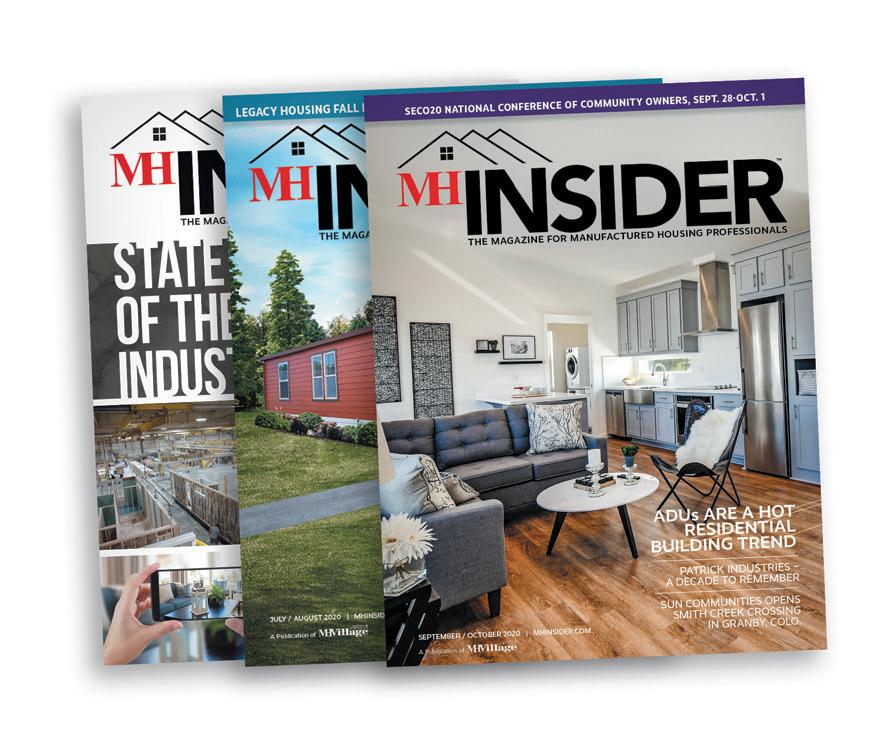

76 | MAY / JUNE 2023 EDITION Reach Over 39,000 Manufactured Housing Professionals with the MHInsider™ Magazine! Call (877 ) 406-0232 to Advertise or visit mhinsider.com/media-kit to request a media kit. With the country getting back to business, it is more important than ever to get your products and services in front of potential buyers to keep your sales pipeline full. As the premier news source for manufactured housing professionals, the MHInsider™ is the perfect vehicle to carry your advertising message to industry decision makers at communities, retailers, manufacturers, suppliers and service companies nationwide. ™ No One Else Comes Close


DATES, GROUPS & BOOKS THAT NARRATE MANUFACTURED HOUSING HISTORY
by George Allen, CPM Emeritus, MHM-Master
In this installment of Allen Legacy, we’re offering four areas of analysis that help to define manufactured housing and land-lease community historical performance. The categories we will look at are shipments, notable dates, events, and industry publications.
1955
When 111,900 mobile homes (some still called them “trailers”) were shipped nationwide.
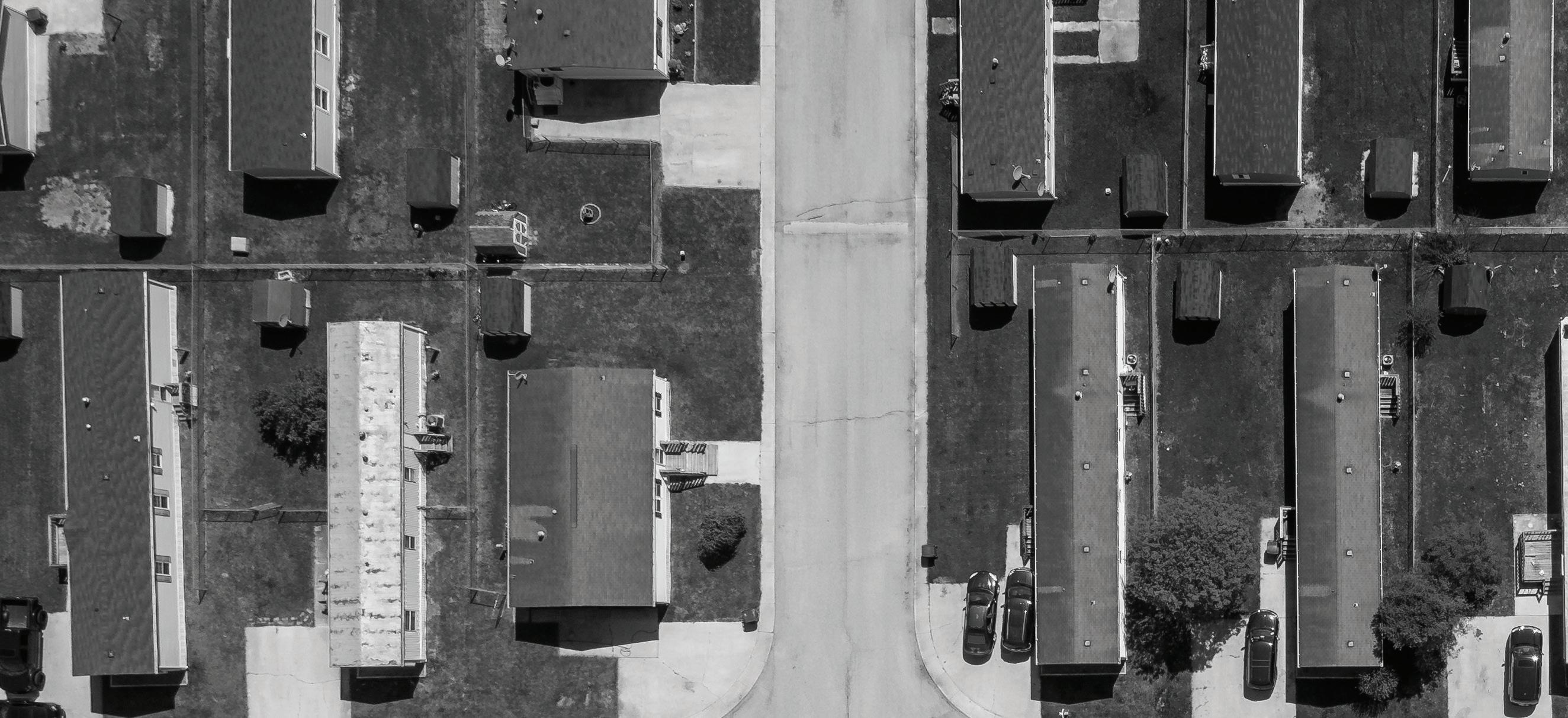
1973
Marked the industry’s highest year with 579,940 mobile home shipments! Two years before the HUD Code was legislated and implemented, launching the regulated era of the industry; also changed trade terminology from mobile home to manufactured housing.
1985
Manufactured Housing Association for Regulatory Reform (MHARR), a national advocacy group founded by a former MHI executive and smaller, regional HUD-Code housing manufacturers willing to fight for fewer and less expensive regulations. Widely Recognized as the MH industry’s present-day “Watchdog in Washington, DC”
1988
Self-published Mobile Home Park Management debuted and quickly sold out. The first book on this subject since the mid-1970s, during the mobile home
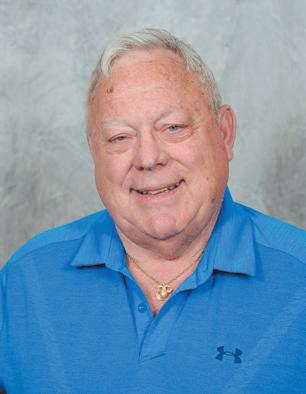
78 | MAY / JUNE 2023 EDITION
ALLEN LEGACY
park development heyday. Eighth edition, retitled “Community Management in the Manufactured Housing Industry”, and basis of the Manufactured Housing Manager (MHM) certification program.
1989
The ALLEN REPORT began its 31-year run as the annual “Who’s Who” among portfolio owners/operators of land-lease communities. The 29th edition is in the book “SWAN SONG”.
1992
MHI’s Manufactured Housing Educational Institute (MHEI) introduced its Accredited Community Manager program, roughly based on the Institute of Real Estate Management’s (IREM) Certified Property Manager (CPM) certification program.
1993
On Aug. 31, 1993, 19 (then) manufactured home community owners/operators Convened in Indianapolis to form an Industry Steering Committee to improve the national representation of the unique, income-producing property type, and educate Wall Street analysts of favorable performance statistics before several large property portfolios went public in 1994 as real estate investment trusts (REITs).
1995
Given the increasing volume of new HUD-Code housing shipments prior to the industry’s 1998 renaissance, “Development, Marketing & Operation of Manufactured Home Communities” co-authored by myself, the late David Alley, and Edward Hicks was an immediate success among developers of this type of property.
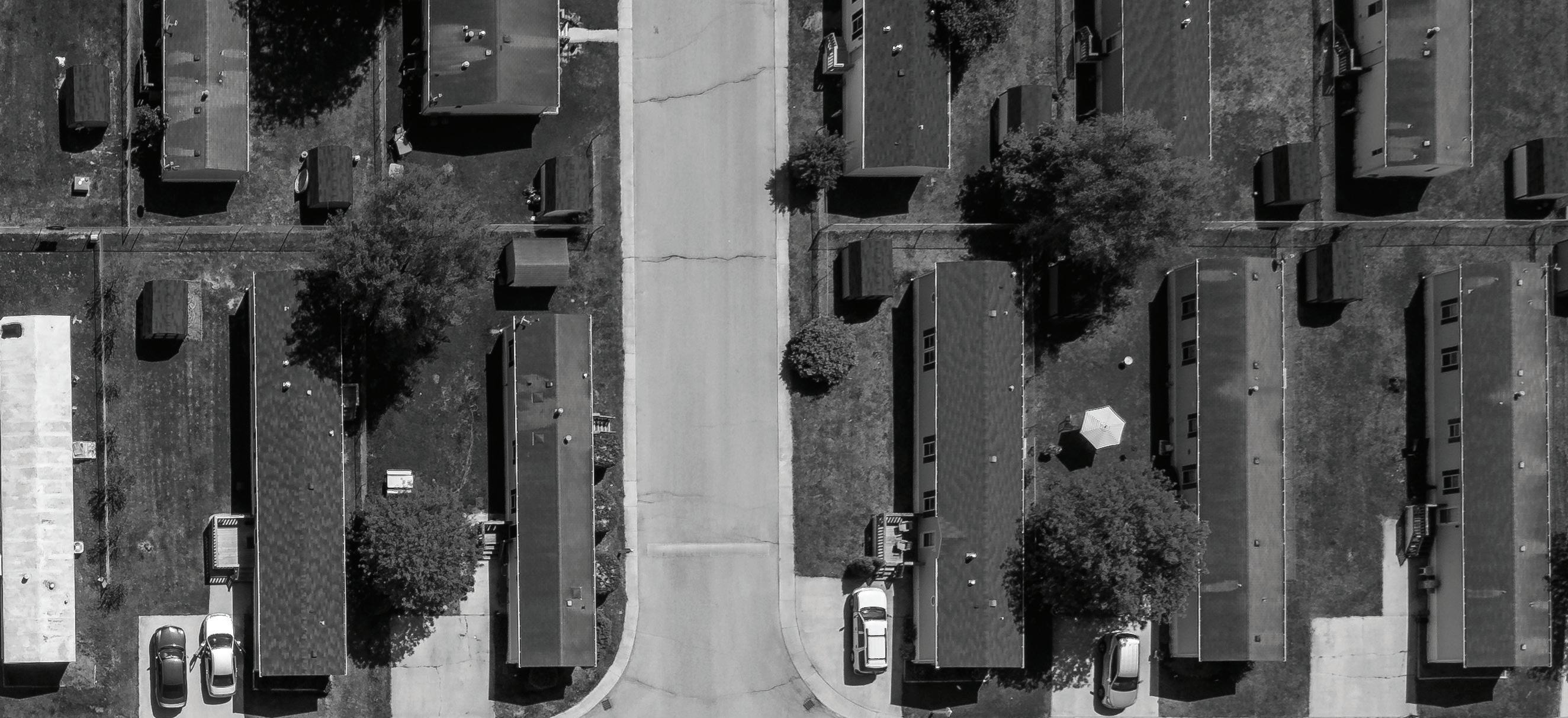
1996
On Jan. 1, 1996, MHI welcomed ISC members, and other community owners/operators, into the newly formed National Communities Council (NCC), later a bona fide division of the institute. A National Retailers Council (NRC) was launched at the same time. Both continue as MHI divisions to this day.
1997
Given the increasing interest in the acquisition of communities (i.e. post REIT formation), “How to Find, Buy, Manage & Sell a Manufactured Home Community” was published by J. Wiley & Sons of New York. It was the first, and still the only case-bound textbook published on this unique property type. It is no longer in print. »
MHINSIDER.COM | 79
1998
After 25 years of fluctuating annual shipment levels, the manufactured housing Industry enjoyed a mini-renaissance in 1998 with 372,943 homes shipped.
2001
GFA/PMN’s Manufactured Housing Manager (MHM) program was introduced; based on the text Community Management in the Manufactured Housing Industry.
2004
Urban Land Institute, through the influence of community portfolio owner/operator Randy Rowe, created the Manufactured Housing Communities Council (MHCC), as a quasi-think tank, serving HUD-Code housing manufacturers and land-lease community owners/operators nationwide. Unfortunately, due to high membership dues and expensive meeting costs, this otherwise worthy offering folded after a decade. Have there been other national trade groups in place over the past decades? Sure. Some are functioning today (e.g. SECO planning committee in Atlanta and Women Advancing Manufactured Housing otherwise known as WAMH), and some are not (e.g. Community Owners Business Alliance or COBA7 and National State of the Asset Class or NSAC).
2009
Industry’s nadir, the lowest year, with 48,789 manufactured homes shipped nationwide. This marked the beginning of another era in MH history; one sans easy access to chattel capital for “home alone” transactions, and a shift in retail sales from what we called street dealers to on-site within land-lease communities, another trade terminology change, in 2005.
2017
“SWAN SONG” is the history of the land-lease community real estate asset class, 1970 to the present day, and the official record of manufactured housing shipments (1955 to the present day). Upon its publication it was the first historical text to cover these topics since Allan Wallis’ “Wheel Estate”, first published in 1991 and updated in 1997. “Wheel Estate” is available on Amazon.com.
While more than a dozen books are in print today, covering different aspects of manufactured housing and land-lease communities, there are but four that have stood the test of time, and though several are decades old they continue to command a readership among businessmen and women wanting information about the industry and realty asset class.
2022
Not a statistical baseline, at 112,886 new manufactured homes shipped, simply “where we are now” going into 2023, virtually the same volume as in 1955, 67 years ago!
Where to go from here? With each passing day, manufactured housing and land-lease communities make history in one way or another. At present, its collective negative image issue extends beyond the paucity of professional property management, now featuring a contemporary-era challenge often driven by insensitive, inexperienced, and/or self-interested institutional investors who acquire land-lease communities then markedly increase monthly rates on rental homesites within their recently purchased properties. Result? While HUD recognizes our industry and realty asset class as the epitome of affordable housing, we continue to languish due to lack of raw land development into new communities, and aggressive pricing of homeowners/sites. If you agree, you should be pressuring state and national trade bodies to address these issues and more! MHV
George Allen has owned and fee-managed land-lease communities since 1978. He’s a former MHI Industry Person of the Year and a member of the RV/MH Hall of Fame. He has been designated a Certified Property Manager-Emeritus and a Manufactured Housing Manager-Master. He’s also a senior consultant and staff writer with EducateMHC. Allen can be reached at (317) 881-3815 and gfa7156@aol.com.
80 | MAY / JUNE 2023 EDITION ALLEN LEGACY
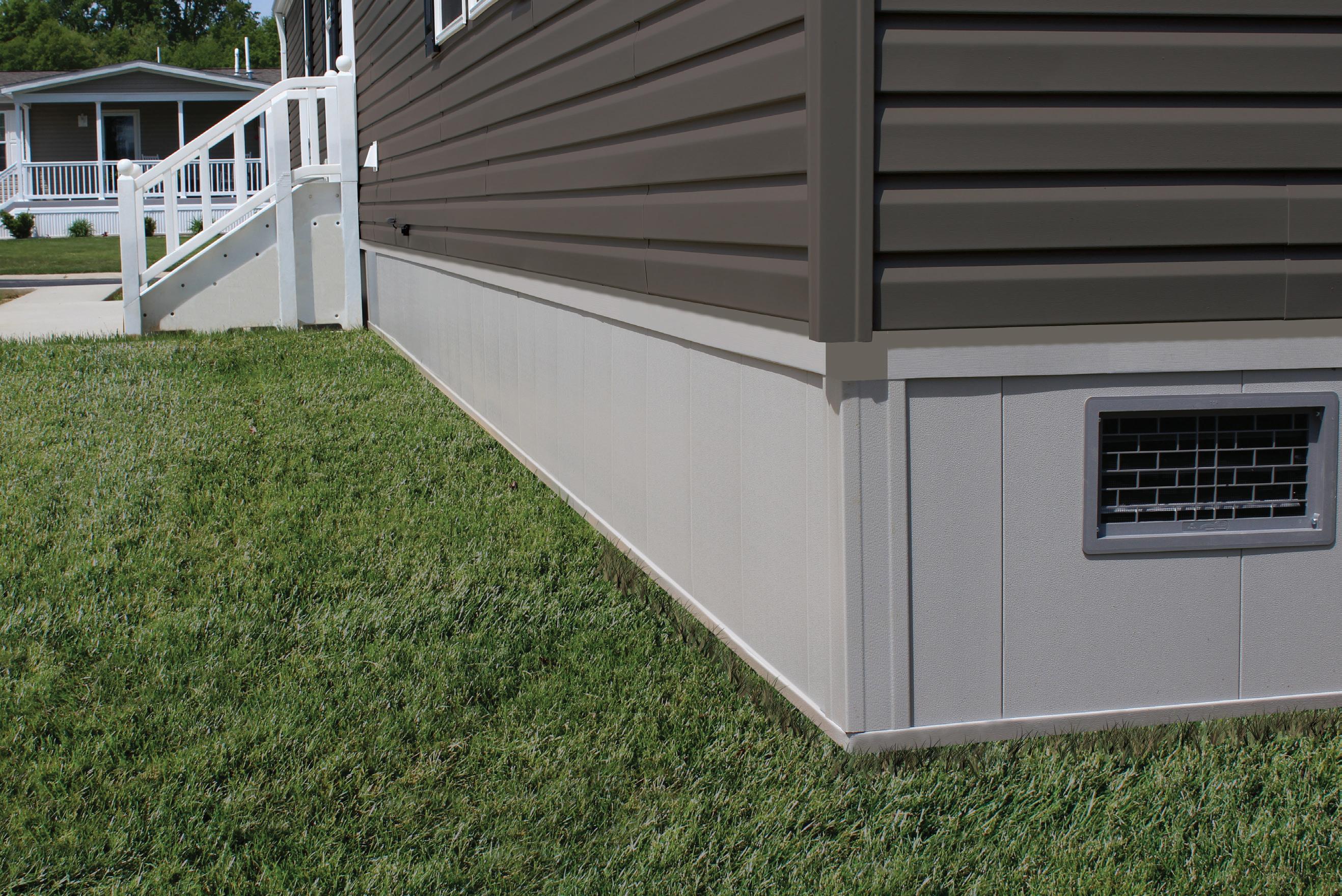
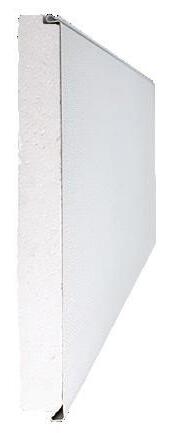



www.stylecrestinc.com/titan-xterior | 800.945.4440 Designed specifically for Manufactured Homes. Titan XTERIOR Elite is a foundation cover built to withstand the demands of everyday life. • 2" Insulation helps keep homes warmer in the winter and cooler in the summer • Available in White, Dove, and Clay to complement any home. • Unique corner kits include notched top trim for easy installation. • Automatic vents available in white, black, gray, and brown. • Designed to survive a non-commercial gas or electric weed trimmer accident. Engineered for Strength. Designed for Beauty! elite Xterior Titan Foundation Covers | HVAC | Doors & Windows | Steps & Rails | Set Up Materials | Vinyl Siding | Plumbing | Electrical NOWAVAIL ABLEin a nar r o ,w nahotysae d el "551 diW ht ! elite Xterior Titan Same finished look and performance. Added benefits of easier shipping, handling, and installation.
PANELS THAT DEFEAT THE WEED EATER FOR ALL CLIMATE NEEDS
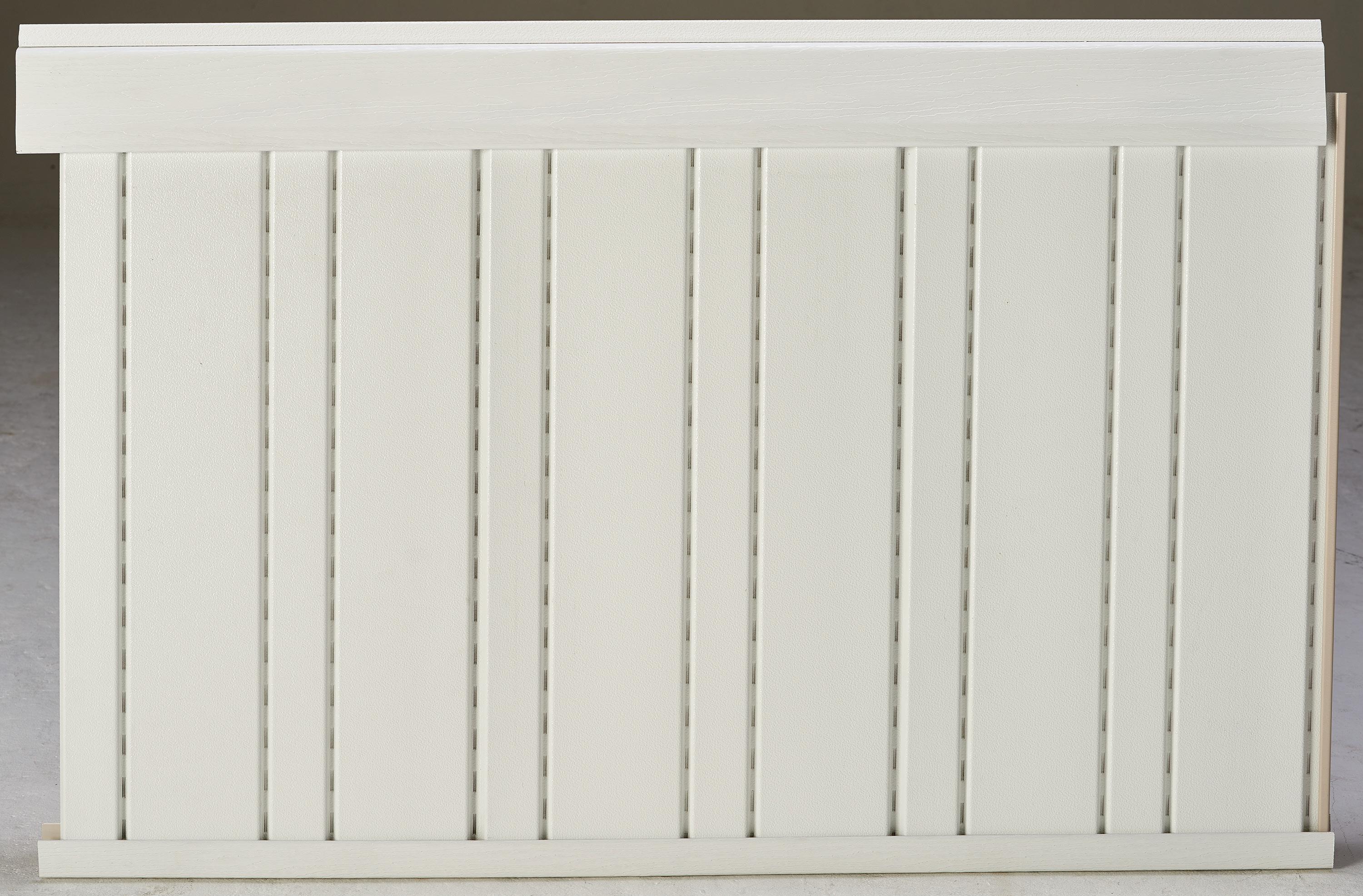





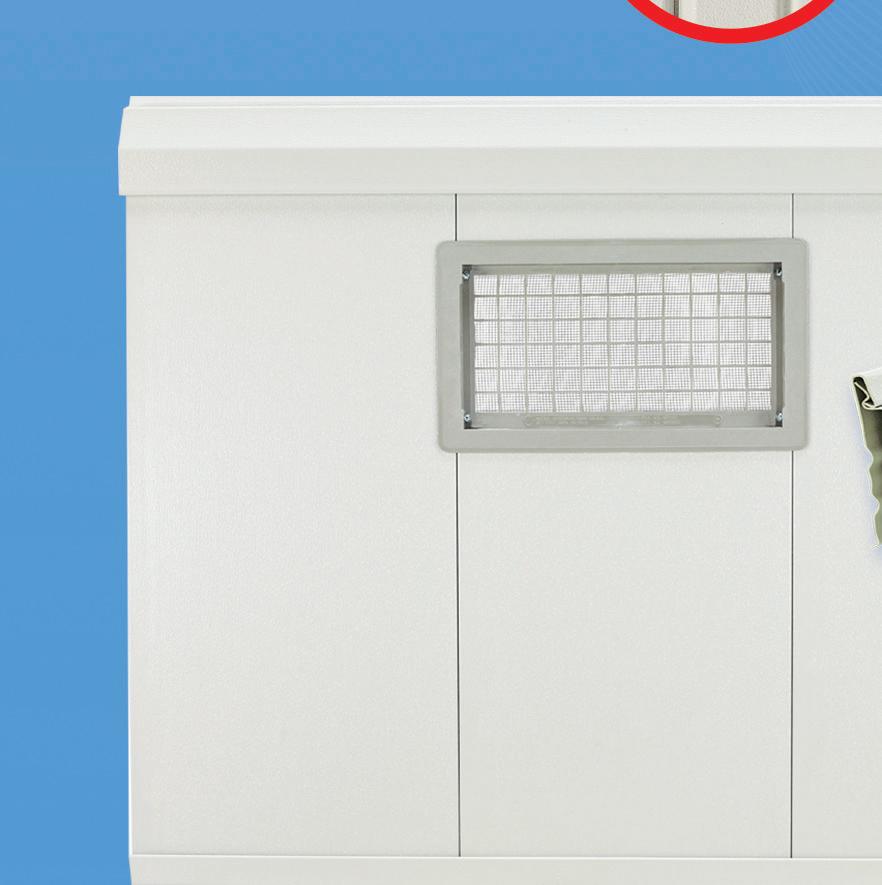


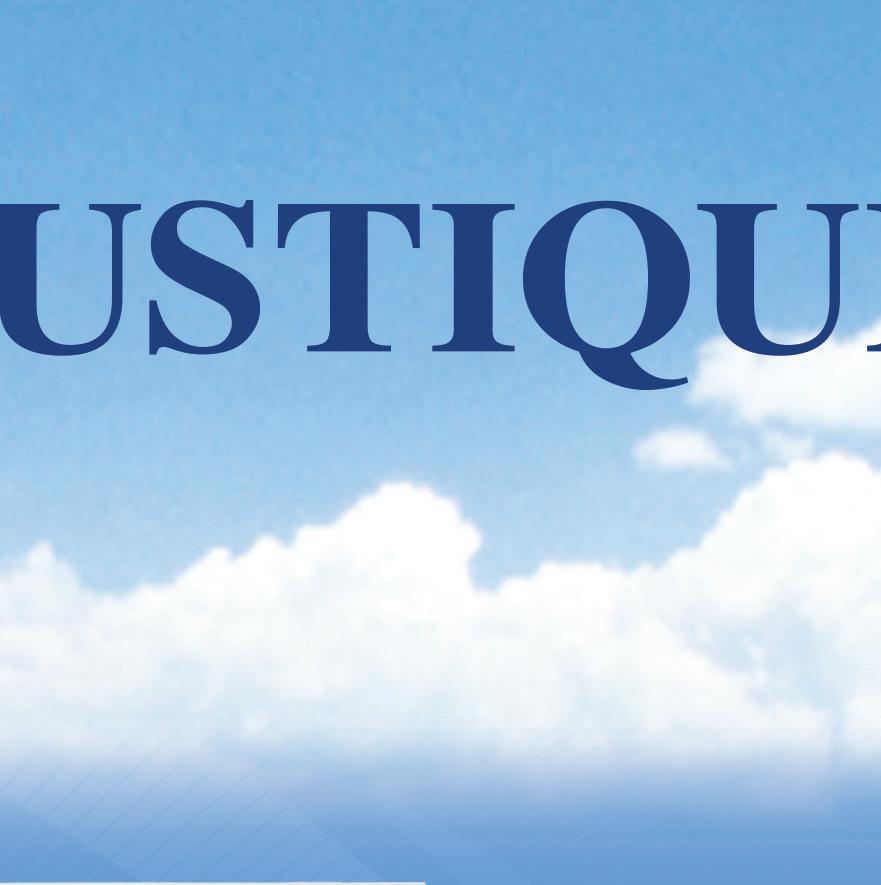

• Limited lifetime warranty to • Engineered for Impact Durability and • Patented Design - US10,378,202
Available in Airflow and Solid
Recessed vents for a classic appearance • Limited lifetime warranty to Weed Eater Damage
Panel backed with 2 inch Thermal Star EPS below grade foam by ATLASEPS for 9R+ insulation factor • Engineer certified projected energy savings
Complies with Hud wind loading for Zones I, II, III • Over fifteen years of use in the Manufactured Home Market 1300 Rustique Square • O’Fallon, Missouri 63368 636-498-5525 • 636-447-0400 fax www.rustiquerapidwall.com • www.rustiqueribb.com
•
•
•
•
RAPID
RUSTIQUE RIBB
WALL





































 UMH Awarded 2021 Manufactured Home Community Operator of the Year and 2021 Retail Sales Center of the Year by the Manufactured Housing Institute For more information, visit www.umh.reit or contact ir@umh.com
UMH Awarded 2021 Manufactured Home Community Operator of the Year and 2021 Retail Sales Center of the Year by the Manufactured Housing Institute For more information, visit www.umh.reit or contact ir@umh.com








 by Subhash Marineni
by Subhash Marineni



























































 by Vanessa Perry
by Vanessa Perry






































































































































































































































































 by Patrick Revere
by Patrick Revere








 by Kurt Kelley
by Kurt Kelley






















